
This post may contain affiliate links or mention our own products, please check out our disclosure policy .

Top 6 RV Heaters: Stay Warm and Cozy on the Road (Updated 2024)
Published on December 4th, 2019 by Levi Henley (Full-Time RVer, Content Manager and Media Specialist for RV LIFE)
RV travel can take you to a wide variety of climates, so preparing for any environment is crucial. While most RVs come with an air conditioner , many do not have an RV heater. So, how can you find the best RV heater that can warm your camper quickly and safely?
I wrote this guide to explain why you need an RV heater, the types of heaters available for RV use, and to help you select the perfect one.
Why You Need an RV Heater
As a full-time RVer in the southern United States, I’ve experienced my fair share of chilly nights, even during the milder winter months. A reliable space heater transforms these potentially uncomfortable nights into cozy, warm experiences.
DON’T MISS OUT ON CAMPER SMARTS UPDATES
Sign up for the newsletter today.
Please enter a valid email address.
An error occurred. Please try again later.
Thank you for subscribing to the Camper Smarts newsletter, keep your eye on your inbox for updates.
For those who continue their RV adventures throughout the year, encountering cold temperatures in the late fall or early spring isn’t uncommon. In these scenarios, a space heater becomes more than a luxury; it’s a necessity for comfortable camping.
Many RVers encounter challenges with their built-in propane furnaces. These can range from high operational costs to uneven heating throughout the camper. This is where a supplementary heater can be invaluable, ensuring every corner of your RV remains comfortably warm.
Interestingly, some RVs, particularly smaller or custom-built models, don’t come equipped with a furnace. For these campers, possessing a compact yet powerful heater isn’t just useful – it’s essential for warmth and comfort.
Another consideration is the cost of propane. Savvy RVers often prefer to capitalize on the free electricity provided at many campgrounds, opting for electric heaters instead of relying solely on their propane furnaces. This switch can offer significant savings on propane expenses.
A common issue faced by RVers, especially during colder nights, is running out of propane. Imagine it’s 20 degrees outside, and your propane tank depletes unexpectedly in the middle of the night. The inside temperature of your RV can plummet rapidly, making a backup heater not just a convenience, but a necessity for those unexpected situations.
The reasons for needing an RV heater are diverse, but the common thread is preparedness. Owning a reliable backup heater is a smart move for any RVer, ensuring warmth and comfort regardless of what surprises your travels may bring.
Types of RV Heaters
RV adventurers have two primary choices when it comes to heating their mobile abodes: propane gas heaters and electric heaters. Each type has its unique benefits, tailored to different camping lifestyles and preferences.
Propane Gas Heaters: Essential for Off-Grid Adventures
Propane heaters, which can either connect directly to your RV’s propane lines or use a separate canister, are a popular choice for off-grid enthusiasts. They’re particularly favored by those who enjoy boondocking or dry camping in remote areas. However, it’s crucial to prioritize safety with these units. Installing a carbon monoxide detector in your RV is an absolute must when using gas heaters, as it safeguards against the dangers of carbon monoxide poisoning.
In addition, It is important to ensure that any propane heater you use inside your rig or tent is rated for indoor use.
Electric Heaters: A Convenient and Safe Option
Electric heaters, on the other hand, offer a convenient alternative, especially when you have access to campground electricity. They’re a boon for those looking to conserve their propane supply, and more importantly, they don’t emit carbon monoxide, making them a safer choice in enclosed spaces.
My personal experience with a Lasko electric tower-style space heater has been nothing short of satisfactory. Its efficiency in heating up the RV quickly, coupled with minimal impact on the electric bill, makes it a cost-effective and practical solution. When not in use, it conveniently tucks away under my couch, saving precious space.
Types of Electric Heaters: From Ceramic to Oil-Filled
Electric heaters come in various forms, including ceramic, infrared, and oil-filled models. Ceramic heaters, known for their quick heating capability, use an internal fan to distribute warmth. However, they might cause slight temperature fluctuations as they cycle on and off.
In contrast, oil-filled radiant heaters offer a more consistent heat output and are impressively quiet. The trade-off is that they take longer to warm up the space and can be bulkier.
Each type of heater has its unique advantages, whether it’s the efficiency of a ceramic heater or the consistent warmth of an oil-filled model. Understanding these differences can help you choose the best heater for your RV lifestyle, ensuring comfort and safety on your journeys.
Top 6 Best RV Heaters
The best RV heaters can run on either propane or electricity, but you also need a space-saving, compact design that is easy to walk around and store. You also want a safe and powerful unit that can warm up your camper fast and keep you comfortable during cold spells.
Next, I review the six top RV heaters with pros and cons, details about each product, and which size camper each model is best.
Author’s Pick: Lasko 755320 Ceramic Tower Heater
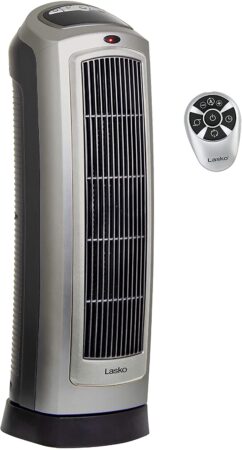
- Cool touch exterior
- Remote control
- Quiet operation
- Sleek design
- Heats room quickly
- Oscillating feature
- Adjustable digital thermostat
- No tip-over shut-off
The Lasko Ceramic Tower heater is at the top of my list for its overall performance and affordable price.
The 1500-watt RV heater is durable, and the internal components are made to withstand the extreme heat this unit generates. The slim and tall design makes it possible to tuck this heater into a corner of your RV and not worry about tripping over it. The design also makes it easy to store the heater when not in use.
If you do bump into the heater, the cool-touch exterior will never cause burns, no matter how long the heater is running. The fan has an oscillating feature that helps improve heat disbursement to keep you comfortable.
Customers like the carry handle, making the heater easy to move. They also appreciate the multi-function remote control so that they can adjust the heat settings from nearly any location inside their camper.
Another benefit customers mention is not only how fast the heater warms up the interior of their RV but also the quiet operation and the automatic shut-off feature if the unit ever overheats.
A word of caution is that this heater does not shut down if it falls over, which can be a concern for RVers with pets or small children who may tip the unit over. This heater can warm up to 300 square feet of space, according to the product page on Amazon, but RVers with large campers may need two units.
BEST FOR: RVers with just about any size recreational vehicle that requires a fast and robust heater but also want digital control, a handy remote, and an adjustable thermostat.
Check prices on Amazon
Best Compact: Lasko Ellipse Ceramic Tabletop Heater
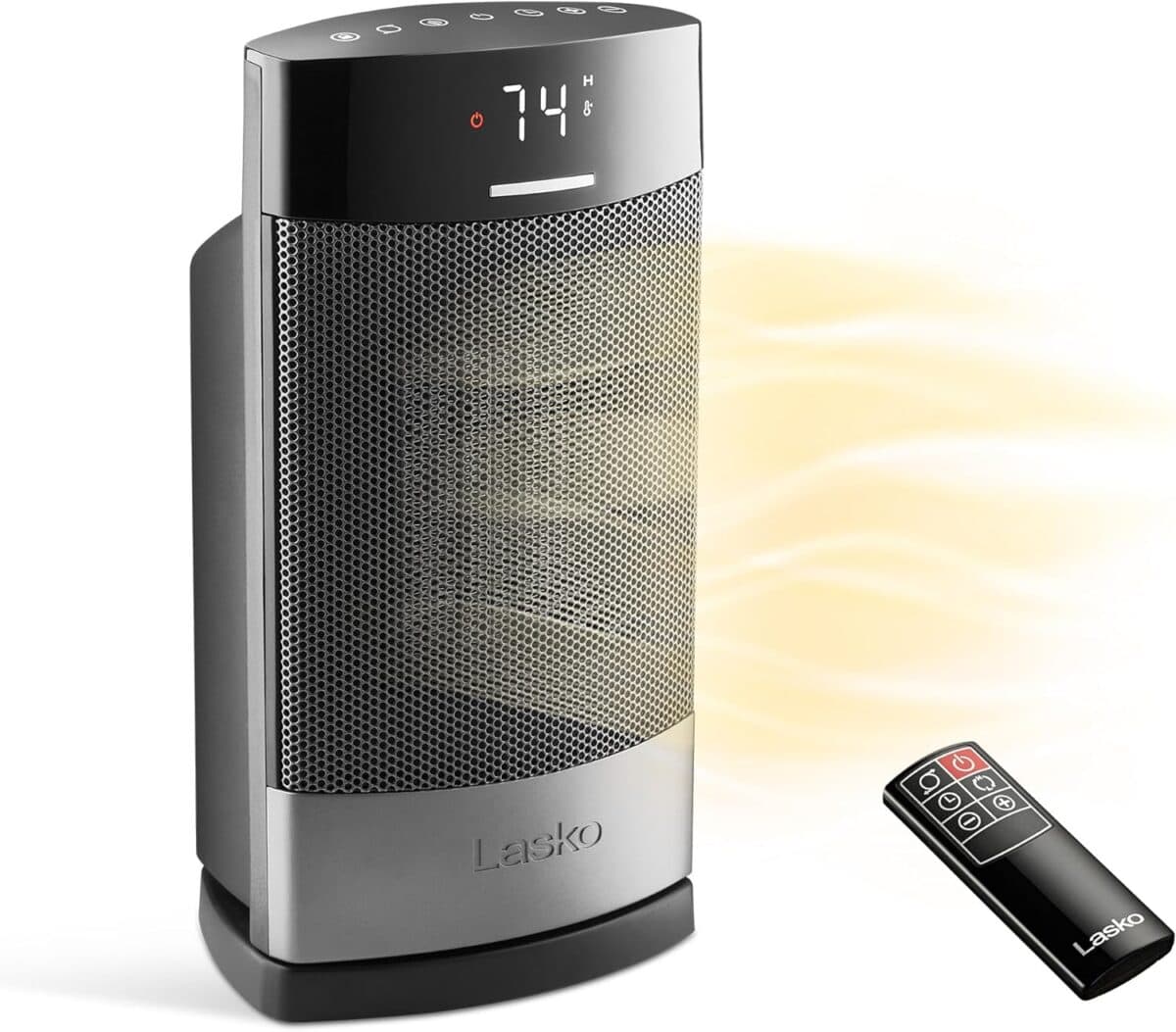
- Tip-Over Switch and Child Lock for enhanced safety.
- Features a Digital Display and Thermostat for easy temperature control.
- AutoECO Mode for energy efficiency.
- Wide Oscillation and Remote Control for convenience.
- Compact and stylish design, suitable for small spaces.
- 3 Heat Settings and 2 Fan Speeds for customizable comfort.
- 1500W power, ideal for medium-sized rooms.
- Quiet operation, perfect for indoor environments like RVs.
- It was difficult to find any notable cons for this little heater.
The Lasko Ellipse Ceramic Tabletop Heater, model CD12950, is a compact heating solution designed for indoor use. Retailing at approximately $59.99, this 1500W heater is intended for heating medium-sized spaces, which may make it suitable for use in RVs.
Key Features:
- The heater offers a 120° heat distribution, aimed at evenly warming the area.
- Includes AutoECO Mode, designed to adjust heating output for maintaining a set temperature while aiming to reduce energy consumption.
- Safety features include a tip-over sensor and a child lock, which are notable for use in confined spaces such as RVs.
- Equipped with touch-sensing controls and a digital display for ease of use.
- Comes with a remote control, facilitating adjustments from different locations within the space.
- The design is compact, with a built-in handle for portability.
Customer Feedback:
- It is often commended for its safety features, effective temperature control, and the convenience of remote operation.
- The heat output of the unit is also frequently highlighted in customer reviews.
The Lasko Ellipse Ceramic Tabletop Heater’s combination of safety features, energy-saving mode, and heating efficiency might make it a practical option for RV users looking for a compact and portable heating solution.
Best For: RVers seeking a compact, stylish, and safe heating solution with advanced features like a remote control, wide oscillation, and energy-saving modes, ideal for medium-sized spaces within the RV.
Check the price on Amazon
Best Infrared: Heat Storm Phoenix HS-1500-PHX 1500 Watt Infrared Space Heater
The Heat Storm Phoenix HS-1500-PHX infrared heater stands out as a top choice for RV owners seeking efficient and versatile heating solutions. This model’s dual mounting options allow it to be placed on the floor with included feet attachments or mounted on the wall, saving valuable floor space in compact areas like RVs.
- Wattage: 1500 Watts, offering robust heating power.
- Mounting Options: Can be mounted on the wall or used on the floor, providing flexibility in different RV layouts.
- Safety Features: Includes a tip-over safety shut-off and a safe-to-touch grill, enhancing safety in the confined space of an RV.
- Control: Features a touch screen with a digital thermostat for easy temperature adjustments.
- Adjustable Brightness: The screen brightness can be adjusted to suit different preferences and times of day.
- Remote Control: Comes with a remote control for convenient operation.
The Heat Storm Phoenix is designed to heat up rooms efficiently without overloading the circuit breaker, making it ideal for RV use where power consumption is a concern. Its 1500-Watt power can be adjusted to half power (750-Watt) or set to an auto mode that selects between the two, ensuring energy-efficient heating.
This model’s patented Heat Exchanger HMS Technology maximizes heat efficiency from the infrared quartz bulbs, ensuring that heat is delivered effectively without any loss. Its safe-to-touch grill makes it a safe option around children or pets.
- Dual heating modes and auto-selection for energy efficiency.
- Safe and easy to use with a touch screen and digital thermostat.
- Versatile mounting options suitable for various RV spaces.
- Compact design that doesn’t compromise on heating power.
- Limited to indoor use.
- The aesthetic may not suit all RV interiors.
Best For: RV owners looking for a versatile, efficient, and safe infrared heating solution that can adapt to different space constraints and heating needs.
Get Prices on Heat Storm’s Site
Best Oil-Filled: De’Longhi Dragon Digital Oil-Filled Radiator Heater TRD40615E
The De’Longhi Dragon Digital Oil Filled Radiator Heater, TRD40615E, emerges as a prime choice for RV owners looking for a reliable and efficient heating solution. This model’s digital features and ergonomic design make it particularly suitable for the limited and varying spaces of an RV.
The De’Longhi TRD40615E is designed to provide quick and efficient heating without creating a dry environment, making it a suitable option for RV living. The ergonomic portability with front and rear handles and easy-to-use wheels facilitates movement from one room to another within the RV.
- Efficient heating with digital control and programmable features.
- Radiant heating method for even and comfortable warmth.
- Portable design with integrated handles and wheels.
- Energy-saving with ECO Plus feature.
- Heavier compared to other portable heaters (26.6 pounds).
- Some users report disagreements over temperature accuracy, smell, and noise levels.
Best For: RV owners seeking a digital, energy-efficient, and easily movable oil-filled radiator heater, suitable for maintaining a comfortable and consistent temperature in small to medium spaces.
Check Price on Amazon
Ultra Compact SOlution: Brightown Handy Wall-Outlet Space Heater
The Brightown Handy Wall-Outlet Space Heater is a compact and efficient option for RVers looking for a convenient heating solution. Its design is particularly suited for small spaces, making it an ideal choice for small campers or as a supplementary heat source in larger RVs.
- Power Output: 350W and 450W options, providing efficient heating for small areas.
- LED Display and Timer Function: High-definition LED display for clear temperature monitoring and a timer function that allows setting heating times from 1 to 12 hours.
- Adjustable Thermostat: Precise temperature control within 60°F to 90°F.
- Portability and Mounting: Compact size (2.8 x 4.3 x 6.5 inches) and lightweight (0.88 pounds), with a 180° rotating 3-jack plug for easy wall mounting.
- Safety Features: Overheat protection and CSA safety certification.
- Energy Efficiency: Low wattage design to prevent circuit overloading and reduce energy consumption.
This heater’s fast heating ceramic technology ensures rapid warming, making it efficient in quickly heating up small spaces. Its digital controls and adjustable thermostat provide precise temperature settings, enhancing user comfort.
- Quick heating capability for immediate warmth.
- User-friendly with an LED display and timer function.
- Precise temperature control for customized heating.
- Lightweight and easily portable, suitable for small spaces.
- Energy-efficient and safe with overheat protection.
- Limited to heating small areas (up to 100 sq.ft).
- Some customers have differing opinions on value and heat resistance.
Best For: RVers with small campers such as teardrops, trailers, or Class B motorhomes, or those needing an additional heat source in a specific area of a larger RV.
Best Propane Heater: Mr. Heater Buddy 4,000-9,000-BTU Indoor-Safe Portable Propane Radiant Heater
The Mr. Heater Buddy Portable Propane Radiant Heater, recognized for its reliability and versatility, is an excellent choice for RVers and outdoor enthusiasts. With a heating capacity suitable for spaces up to 225 square feet, it’s ideal for a range of settings, from RVs to outdoor adventures.
- BTU Output: Offers a variable BTU output of 4,000 to 9,000 per hour, adaptable to different heating needs.
- Propane Gas Usage: Operates using propane gas, compatible with a 1-pound cylinder, and can be connected to a 20-pound cylinder with an optional hose and filter.
- Safety Features: Includes Piezo igniter, low-oxygen safety shut-off system, and accidental tip-over safety shut-off.
- Design: Compact and portable design with a swivel regulator and fold-down handle, facilitating easy transportation and storage.
- Settings: Features high and low heat settings to suit various temperature requirements.
The heater’s ability to connect directly to small or larger propane cylinders offers flexibility in usage, especially for longer trips or in remote locations. The integrated Piezo sparking mechanism simplifies the ignition process, while safety features like the Oxygen Depletion Sensor (ODS) and tip-over shut-off enhance its suitability for indoor use.
- Versatile heating capacity for small to medium spaces.
- Portable design, suitable for various outdoor activities and RV use.
- Safety mechanisms including ODS and tip-over shut-off.
- Straightforward operation with easy-to-use controls.
- Some mixed reviews regarding the product’s overall quality.
- Not available for sale in Canada and Massachusetts.
Best For: RVers and outdoor enthusiasts who require a dependable and portable propane heater for indoor and outdoor spaces. It’s particularly well-suited for emergency heat, tents, campers, and other enclosed outdoor settings.
Having the best heater for your RV makes every camping trip more comfortable. The right heater can eliminate the chill from the air inside your camper during cold spells and extend your camping season for many more months. Even off-grid campers will benefit from having a reliable heat source during cold snaps.
I hope you find this guide to the top six best RV heaters helpful. I want to help my fellow RVers learn more about what equipment they need to own so they can prepare for any camping situation.
My top pick for the best RV heater is the Lasko 755320 Ceramic Tower Heater.
What’s your favorite RV heater? Tell us why you recommend it by sharing your thoughts in the comments below!
Share this post:
Related posts:.
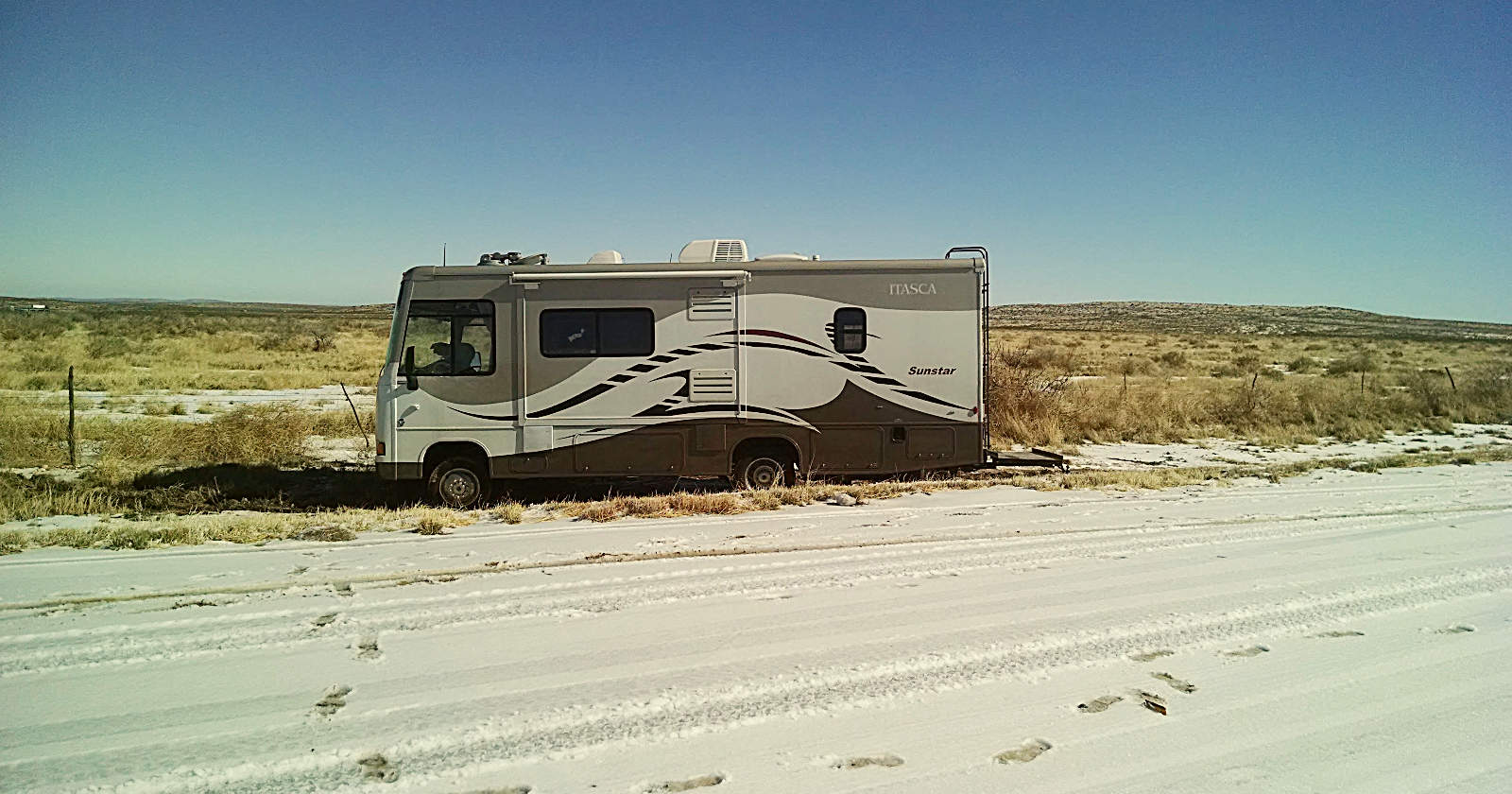
10 Crucial Tips for Driving an RV in the Snow

Winter RVing With Pets: Tips For Keeping Your Furry Friends Safe And Warm
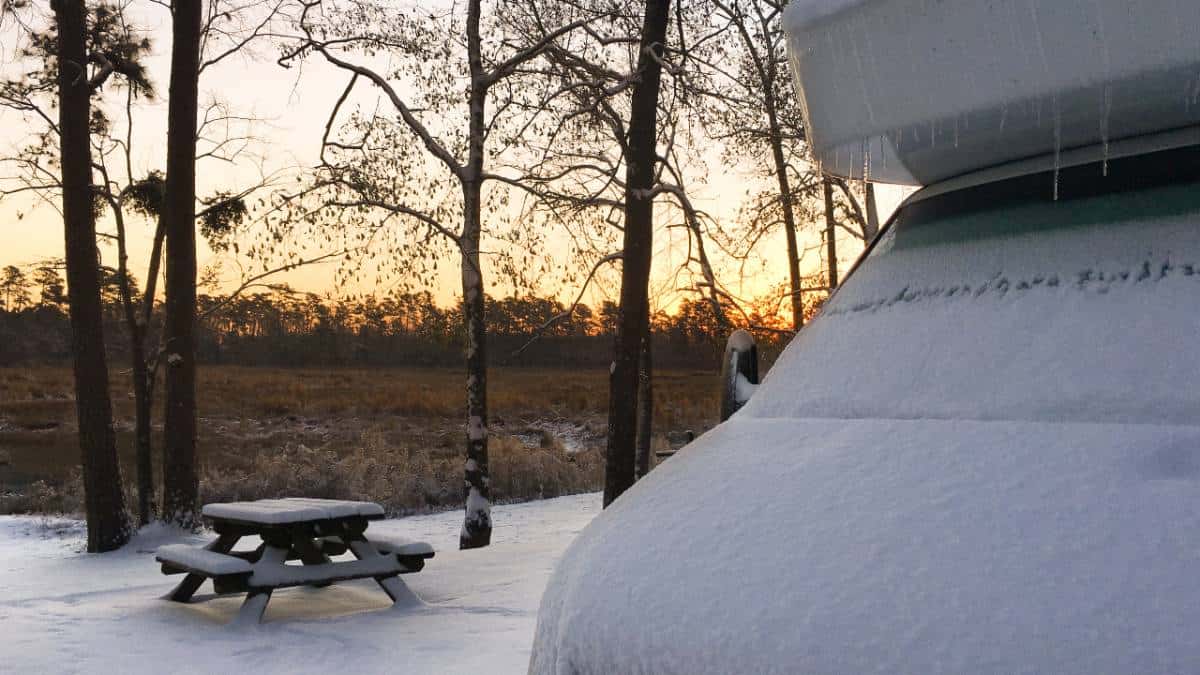
Winter RV Camping: Essential Emergency Items
About the author:.

Levi Henley, RV LIFE’s Content Manager and WordPress specialist, is renowned for his expertise in RVing and workamping, having lived on the road since 2015. He’s the author of the popular guide “Seasonal Workamping for a Living: How We Did It” , a testament to his deep knowledge in the RV community. For more insights into Levi’s nomadic lifestyle and expertise, visit Henley’s Happy Trails .
Levi Henley: Content Manager, Media Specialist at RV LIFE
Levi Henley stands at the forefront of RV-centric content, wearing multiple hats as a Content Manager and Media Specialist for the RV LIFE network. With his deep-rooted expertise in RVing, workamping, and the full-time nomadic lifestyle, Levi has been writing about and living the lifestyle since he hit the road in 2015 with his wife Natalie.
Their journey, punctuated by innovative approaches to nomadic income, has culminated in the guide, " Seasonal Workamping for a Living: How We Did It ," a testament to their hands-on experience and knowledge. This resource, available on Amazon and through their personal website, Henley's Happy Trails , offers invaluable insights into the mobile lifestyle. Levi's has written for RV industry media key organizations like Coach-Net, Escapees, and Workamper News.
Beyond his professional prowess, Levi is a man of diverse talents and interests. He's not only an actor and magician but also a certified scuba diving instructor. His adventures across the country in a 2011 Sunstar Itasca, accompanied by Natalie and their two feline companions and rambunctious dog, embody the spirit of exploration and lifelong learning.
Follow Camper Smarts:
- Follow Us On Facebook
- Follow Us On Twitter
- Follow Our Pins

19 Best Electric Space Heaters for an RV (2024 reviews)
How to keep your loved ones warm is top of mind as the winter months are here again. To help with that, I’ve carefully prepared a review to help you select the best electric heater for an RV.
Overall, the best electric space heater for an RV is the Humutan 1500w. It features tip-over protection, overheating protection, is extremely quiet, and will heat an RV very quickly. Additionally, it has well over 22,000 near-perfect reviews on Amazon at a price well under $40.
CLICK HERE to see the current price on Amazon.
But that’s hardly the only option!
I checked a lot of electric space heaters to find the best space heater for RV use. Some of the important features that served as the criteria include child lock, so you need have no worries if you have small children RV camping with you.
Others are safety features, energy efficiency, and power consumption. My focus was on the type of heater that has the right size (small size) so that it can be easily carried around and whose power source is electric power.
And naturally, one that has a lot of power. The safety features were vital, as I wanted to select only heaters that met the requirements of the National Association for Fire Protection.
Keen to get the right space heater or a new heater? Not to worry, whether you’ve got a small camper or a travel trailer, you’ll find the best options here.
Let’s get into it.
1. Vornado MHV Vortex Heater
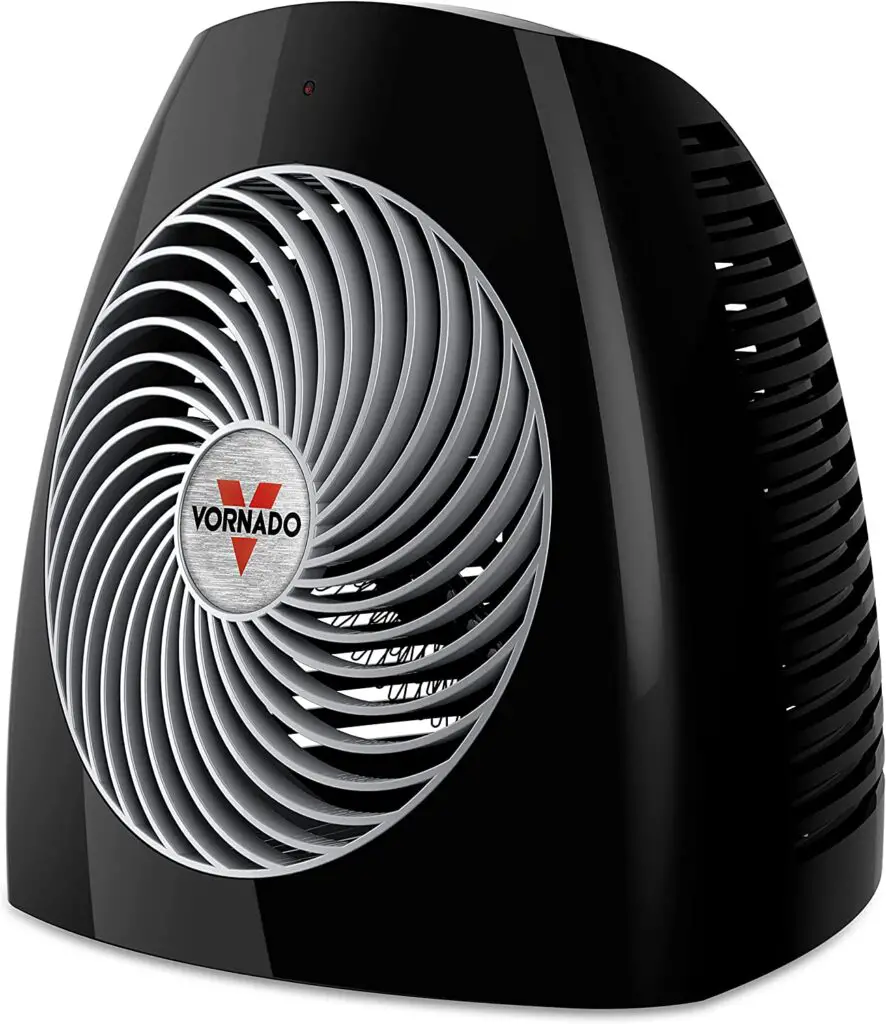
Vornado MHV heater is a great option. It has multiple heat settings — high, medium, and low. It has a built-in thermostat to set and maintain desired temperatures. It heats a room through vortex air circulation without intense heat, in a similar manner to how a furnace works, but on a small scale.
It comes with a remote control for adjusting these and other settings from a distance. And it has built-in safety features.
One such feature is its ability to automatically shut itself off when it becomes too hot or when it’s accidentally tipped over. Another is its cool-touch exterior. Vornado is, without a doubt, one of the best RV heaters on the market.
- It’s able to heat up a small to medium-sized living space
- It offers high heat and is energy-efficient
- It operates quietly
- It is safe to use
- It can only heat up a small space
- It’s a tad pricey relative to similar models
- It has a short cord
- It’s not suitable for use outside the U.S.
- One customer says the product is overrated and that it leaves a strong chemical smell
CLICK HERE to see the current price on Amazon
2. Lasko Oscillating Ceramic Heater 5586
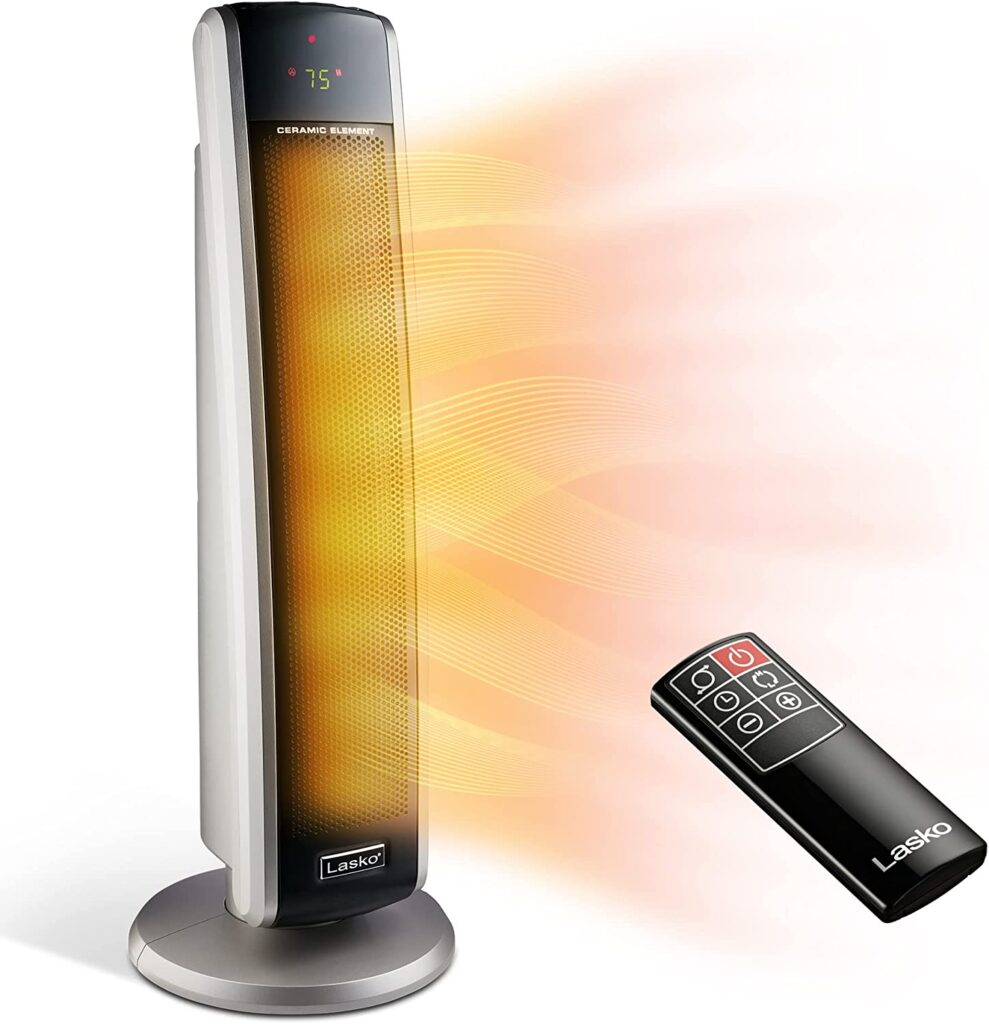
Lasko ceramic tower heater is made with ceramic heat elements that are more heat-efficient than other materials, and it oscillates, providing greater coverage of a room as it circulates warm air around. It is a good option if you’re in the market for an electric RV heater.
It comes with a multi-function remote control you can use to turn the oscillation on and off, turn the heater on and off, and adjust the temperature. There’s a place at its back where you can store the remote control, so you don’t lose it. Lasko is an efficient antidote to cold weather or cold climates.
It has a built-in timer, with which you can program it for 1 to 8 hours at 1-hour intervals. It will automatically turn off after the selected time. Its safety features include its cool-to-the-touch exterior and overheat protection which ensures that it does not overheat even after it’s been left on for a long time.
- Its oscillating function makes it highly efficient
- It is small and portable
- It gives off much heat and is energy-efficient
- It comes with safety features
- Its ceramic heating elements make it durable
- It does not cover much space
- Its remote does not come with batteries
3. Rellorus Ceramic Space Heater
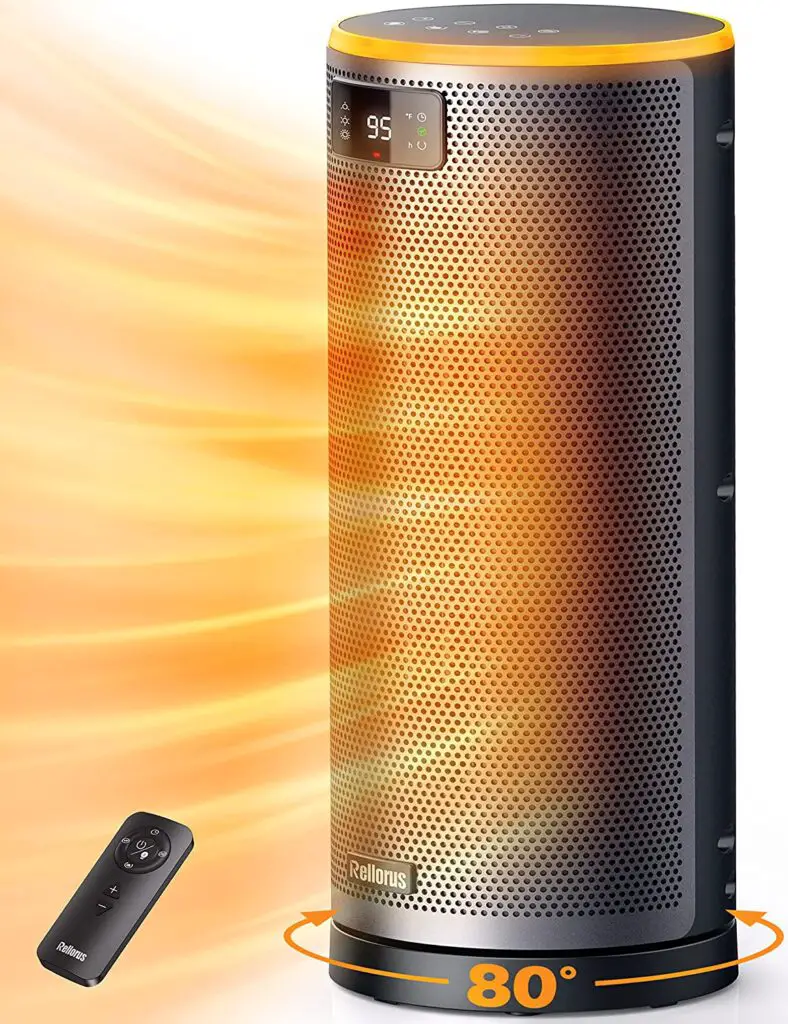
Rellorus is a fast-heating, small space heater. A room becomes warm in seconds because of its ceramic heating elements and shape. It is energy-efficient as it adjusts itself to your room’s ambient temperature, enabling you to save on energy bills.
It has 4 heating modes and comes with a remote control you can use over 26 feet. Its safety features include a built-in overheat sensor, 1 to 12-hour timer, child lock, automatic shut-off, flame-retardant plug, and tip-over protection.
- It is very stylish
- It is energy-efficient
- It has superb safety features
- May not be ideal for large rooms
- Its remote control does not come with batteries
- Someone claims the temperature is inconsistent
- There’s no way to turn off the LED display
4. Dreo Electric Space Heater
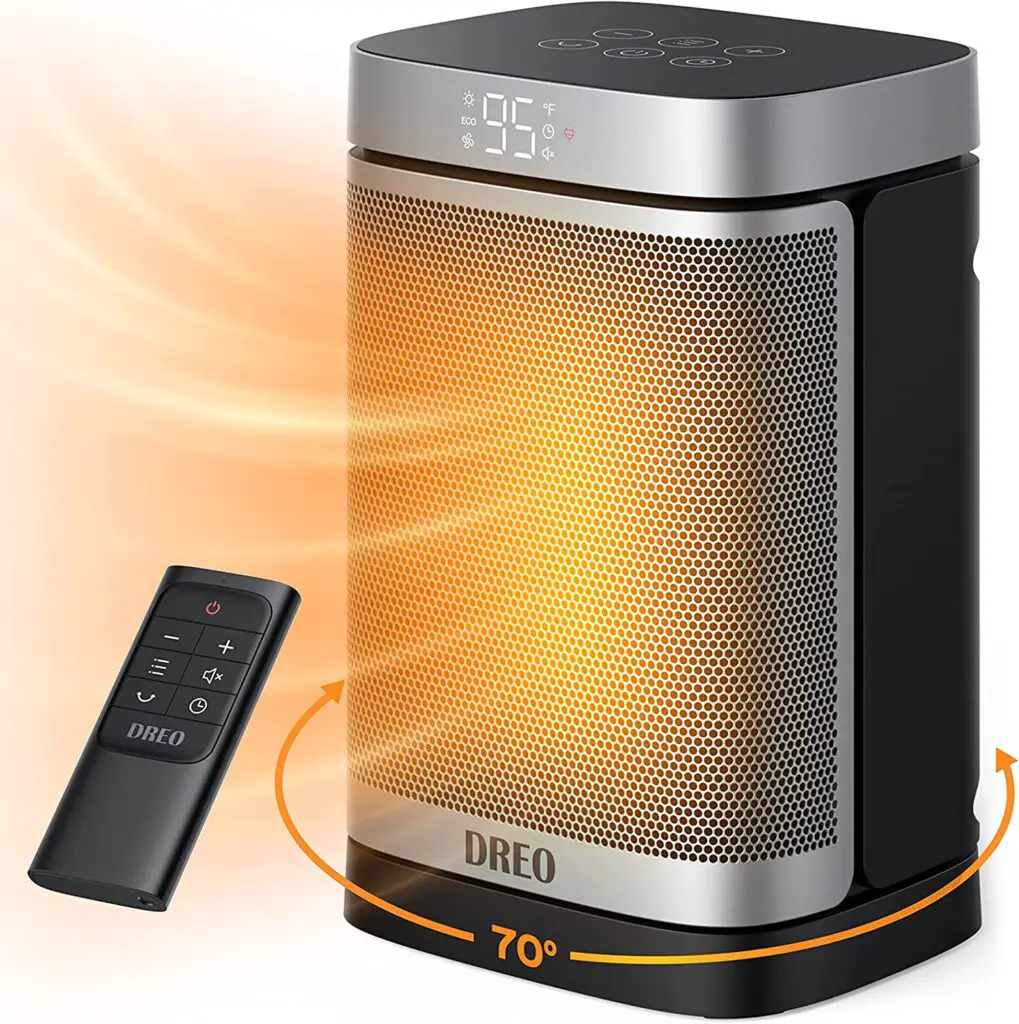
Dreo is powered by proprietary Hyperamics technology, enabling you to experience a warm room immediately with its working power of up to 1500 Watts. It’s made with flame-retardant materials and has other safety features that include tip-over and overheat protection and an enhanced safety plug.
- It is energy efficient
- It oscillates
- It has a thermostat and remote control
- A customer complained that it’s very noisy
- A tad pricey relative to other models
- It may not be ideal for large rooms
5. Pelonis NY1507-14A Digital Ceramic Tower Heater
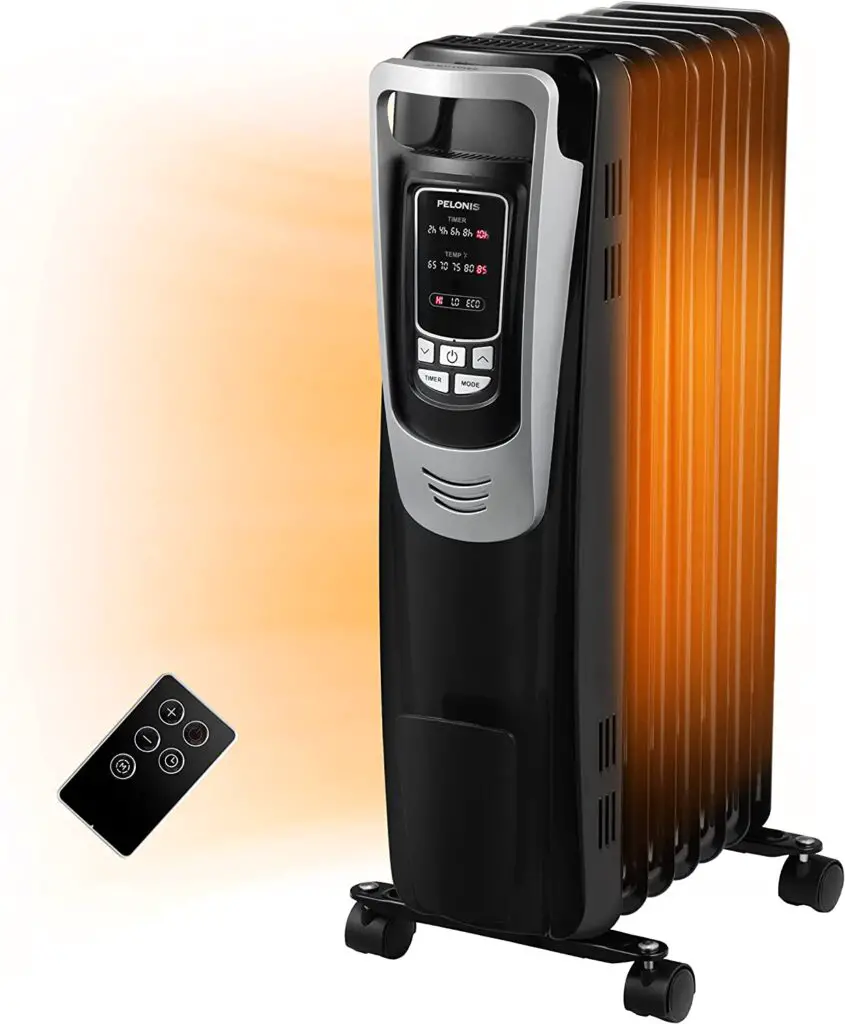
Pelonis is a tower-style heater that employs ceramic heating elements to generate heat. It has a timer, a digital display, and multiple heat settings. It also comes with a built-in thermostat, enabling you to set desired temperatures.
It has overheating and tip-over protection. The former ensures that the heater is automatically shut off if it overheats, and the latter ensures it’s shut off if it falls over.
- It is energy efficient and quickly heats up a room
- It comes with a built-in thermostat
- It has several safety features
- It can be easily moved around
- It is very quiet
- It is not suitable for large rooms
- It comes with a short cord
- A customer says it does not circulate well
- A customer had a problem with the power plug
6. De’Longhi TRD40615E Radiant Heater
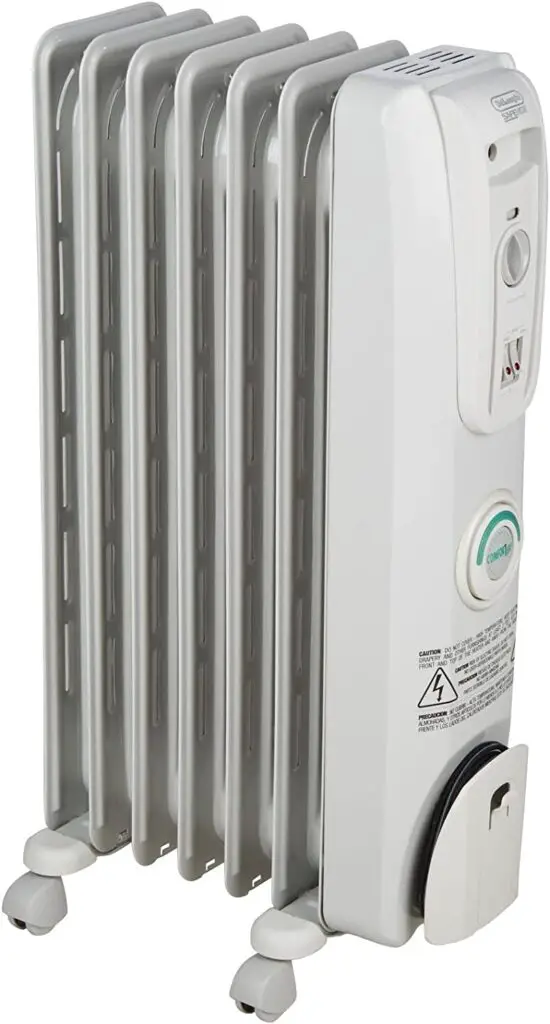
De’Longhi TRD40615E is a powerful heater that uses infrared technology to heat up a room. It comes with a built-in thermostat and has safety features that provide peace of mind.
It’s designed for small to medium-sized rooms and is highly energy efficient. It’s an oil-filled heater, so it warms up more slowly relative to ceramic heaters. But it retains its heat for longer and is consequently more energy efficient.
- Highly efficient heating with infrared technology
- It has multiple heat settings
- It has a limited heating range
- Its cord is fairly short
- Some folks say it can be noisy
7. KopBeau Oscillating Space Heater
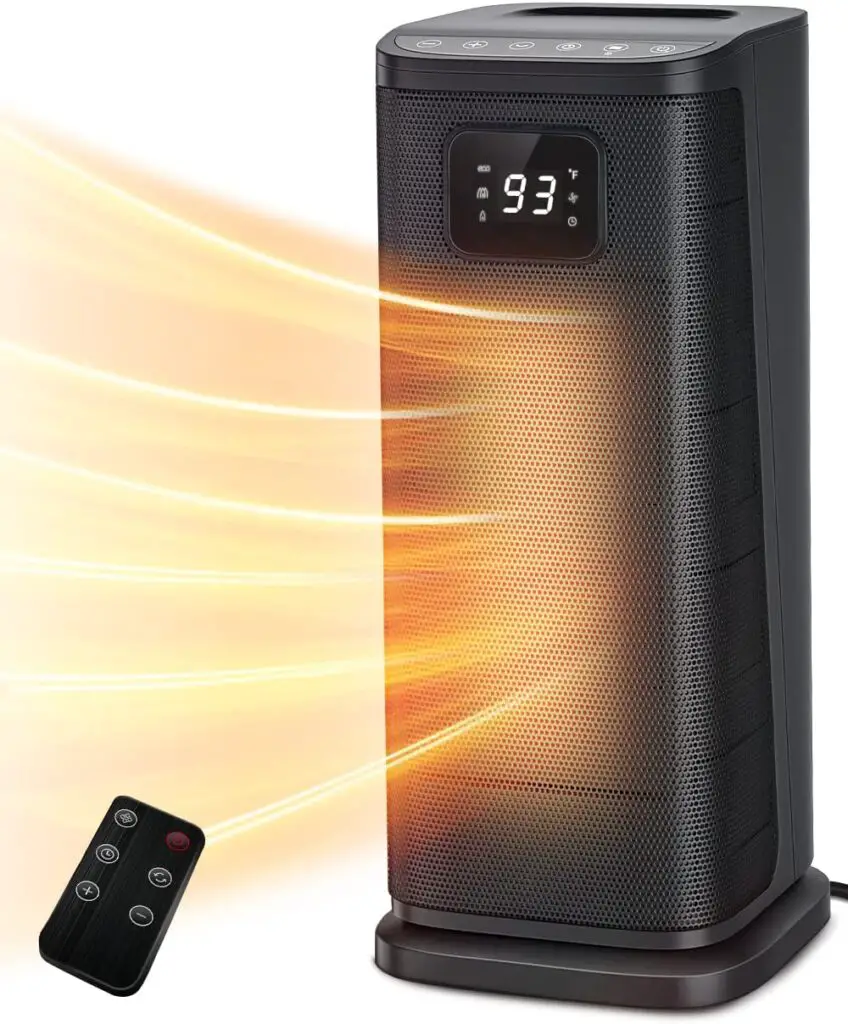
KopBeau has an instant heating feature. So, it warms up a room in no time. It provides widespread oscillation, so it covers a large part of a room.
It’s made with flame-retardant materials and has a child lock, overheat, and tip-over protection. It also comes with a timer, a large front-facing LED display, and a remote control.
- It heats up a room quickly
- It oscillates, so there’s wide coverage
- It works quietly
- It is a tad pricey
- A customer complained that the thermostat appears to be inaccurate
- Another says the controls are not intuitive
8. Sunnote Space Heater
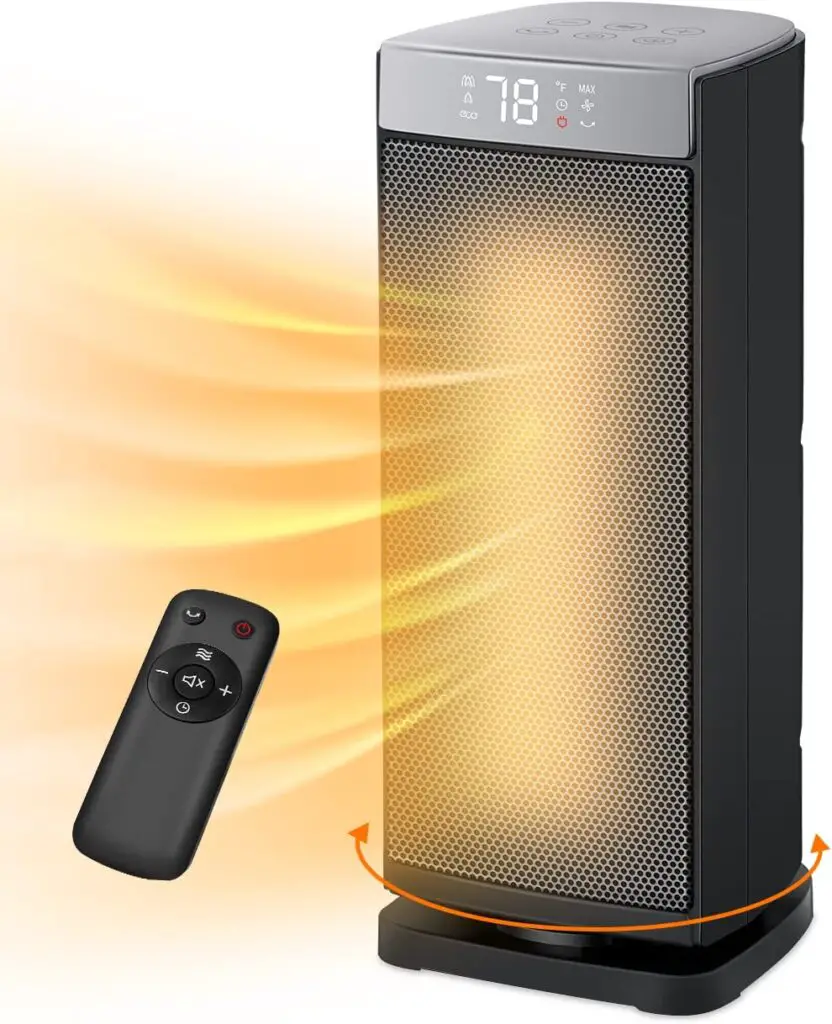
Sunnote Space Heater works noiselessly as it instantly heats up a room. It has four heating modes and comes with a timer you can use to set when you want it on and off and a 24-hour non-shutdown feature if you like it to work nonstop for a whole day.
It’s made with fireproof materials and is resistant to electric shock and overheating. Both its plug and cord are heat and shock-resistant. Sunnote is a portable heater that has great reviews.
- It works quietly and blasts out great heat
- It has clear digital readouts
- It’s got a carry handle
- Automatic shutdown and overheating protection
- Set temperature remains in memory when turned off
- It’s hot to the touch
9. Cadet Com-Pak Plus Electric Wall Heater
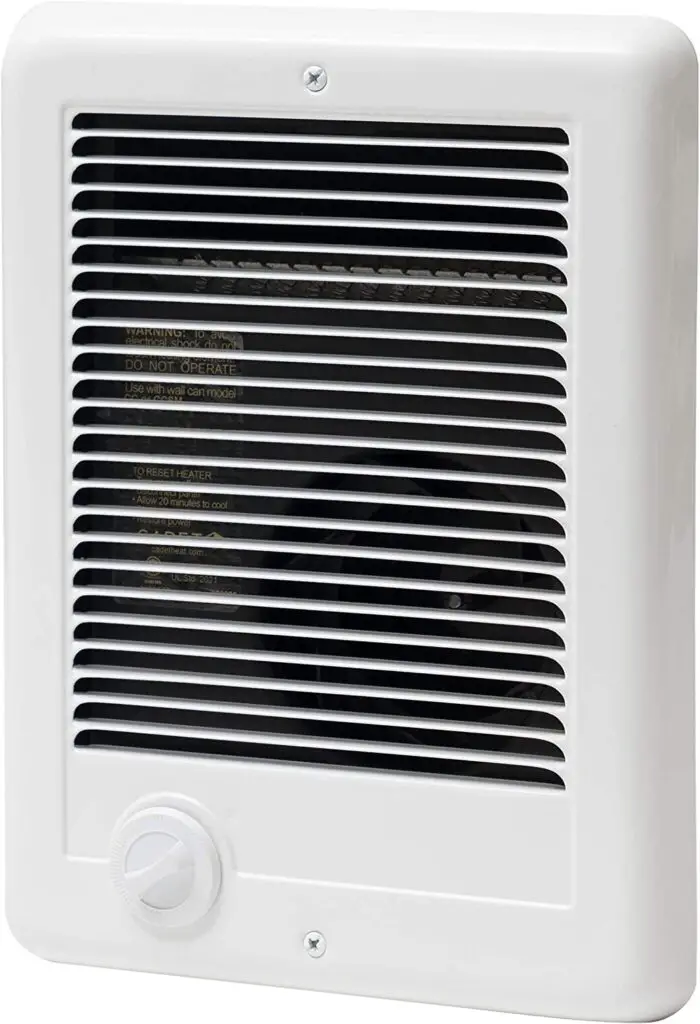
Com-Pak Heater has a compact size. It is a wall-mounted heater that employs electricity to generate heat. It has multiple heat settings, so you can choose what you like, and it comes with a built-in thermostat. It is energy-efficient and has high energy output.
- It saves space as it can be mounted on the wall
- It is easy to install
- It is affordable
- It requires installation
- It covers only a small space
- It doesn’t have a dedicated “off” position
10. Mr. Heater MH9BX Buddy
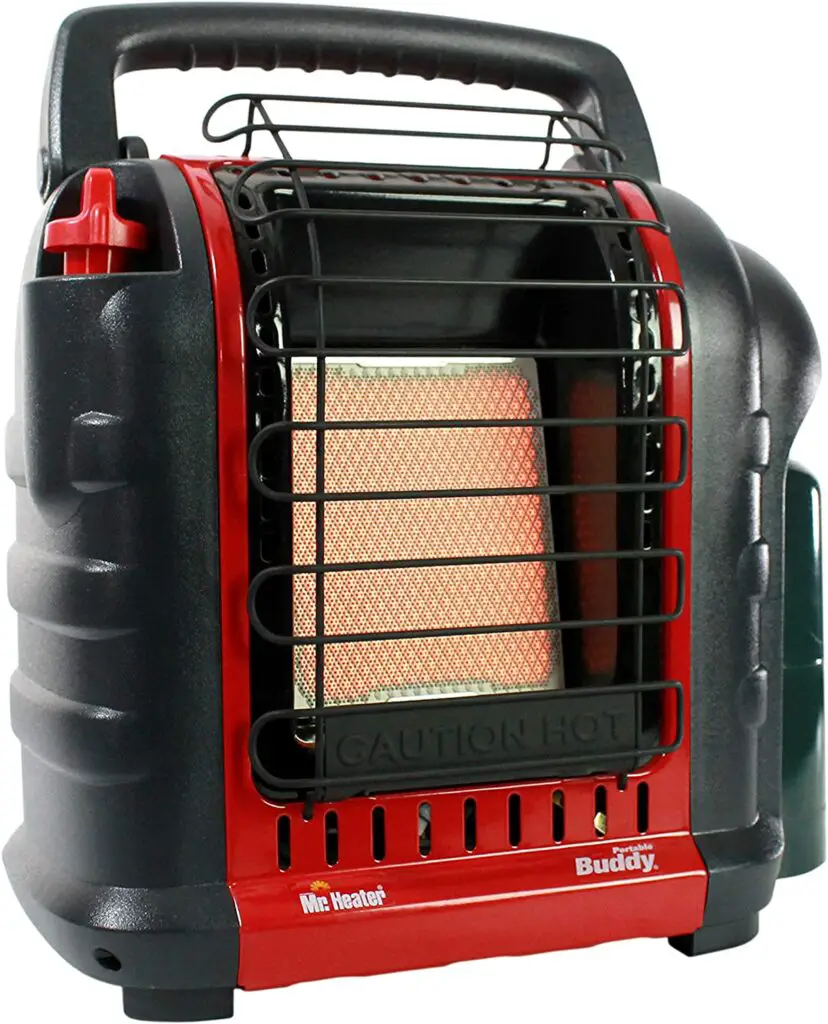
Mr. Heater uses radiant heating technology to generate heat. It is designed for use in well-ventilated places and has multiple heat settings. It is a portable unit and a highly popular propane-powered heater.
A swivel regulator gives you the ability to adapt usage. It may shut off if it is used at altitudes above 7000 ft. It also has tip-over protection.
- It has a portable design
- It heats up quickly
- It is propane-powered
- Ideal for only well-ventilated places
- No built-in carbon monoxide alarm
- May shut off at altitudes above 7000 ft
11. Symdral Ceramic Space Heater
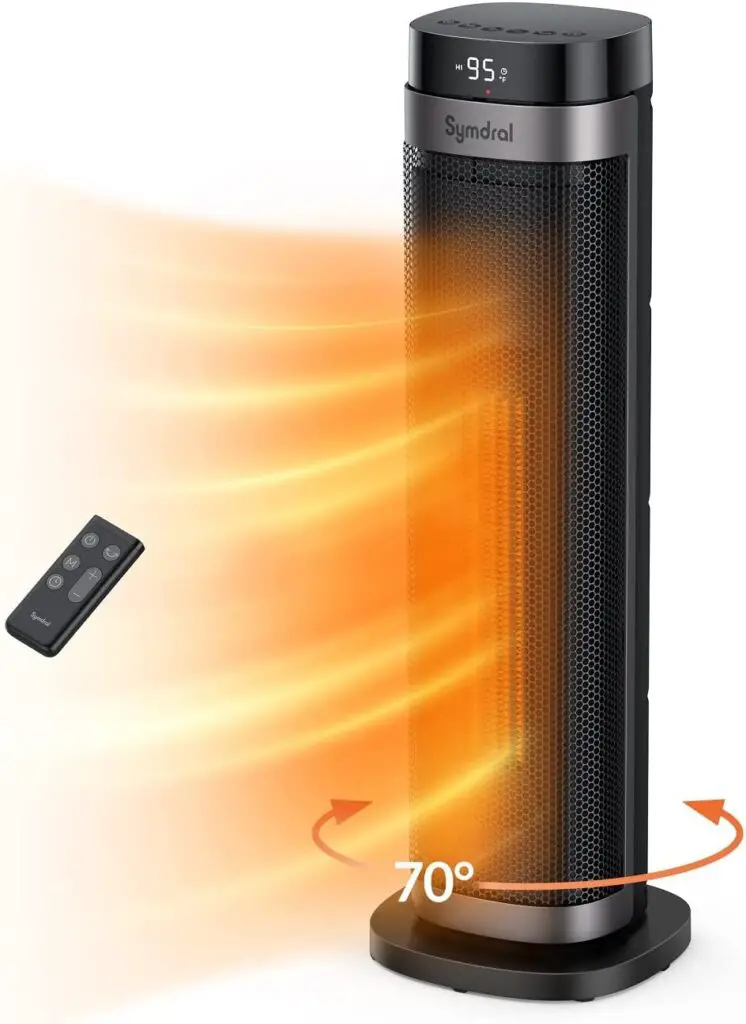
Symdral Space Heater is powered by advanced ceramic heating technology. It comes with a remote control, has 3 heating modes, and the temperature can be adjusted when it is in ECO mode. It has tip-over and overheating protection, and it oscillates by 70 degrees.
- It can be easily carried around (has a hidden handle)
- It heats up quickly in about 10 seconds
- It is programmable
- Heat coverage is about 6 feet
- It is a tad noisy
12. Vornado TAVH10 Electric Space Heater
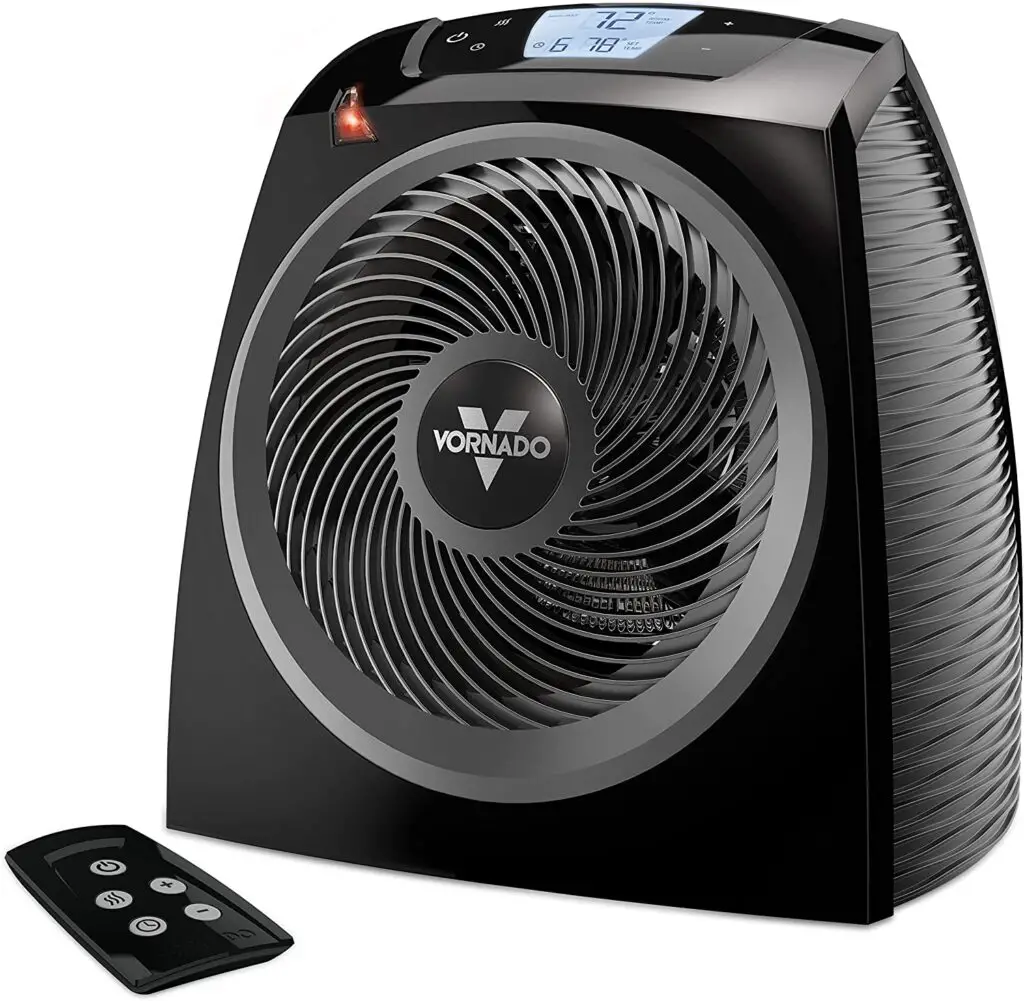
Vornado TAVH10 is Amazon’s choice portable space heater. It gently heats up the air in a room using vortex air circulation without using intense heat.
It automatically senses how much heat and circulation is needed to maintain the set temperature. It has a cool-touch exterior, tip-over protection, a 2-stage automatic shut-off, 2 heat settings, and a timer.
- It is fast-heating
- It reduces electricity bill
- Hidden cord storage
- Tip-over safety works fantastically well
- Gives off a smell when on high wattage
- Its fan is loud in a small room
- Thermostat is finicky
13. Gabless Space Heater
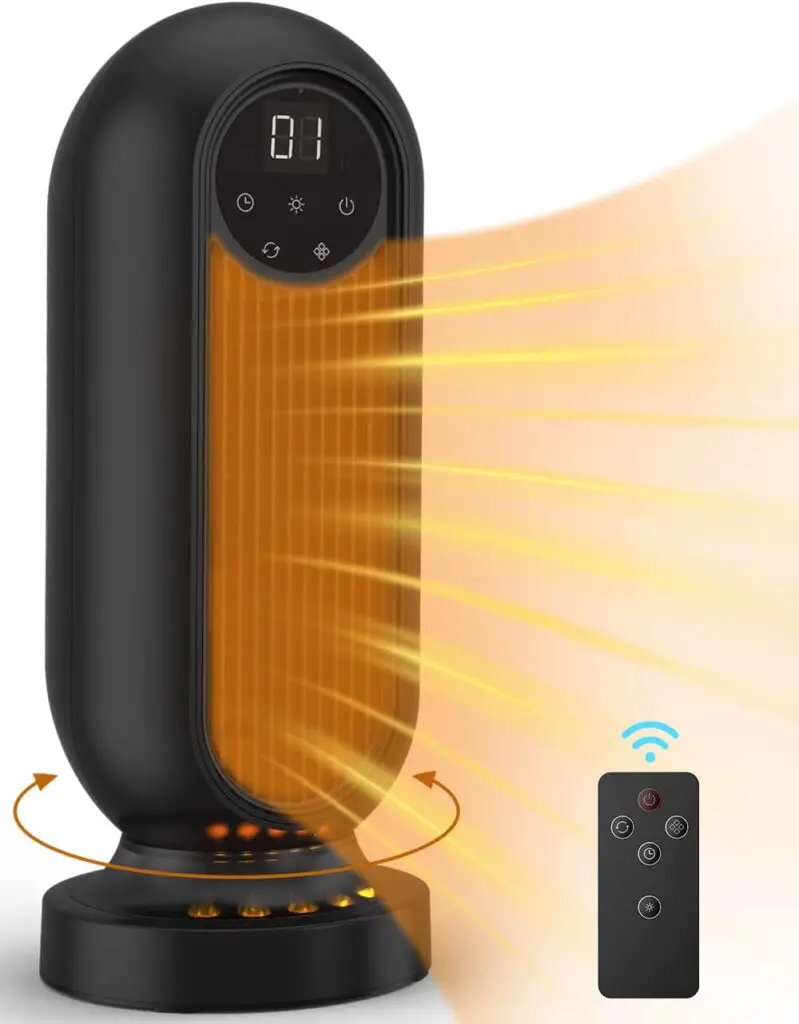
Gabless Space Heater has 3 heat levels. It oscillates, providing greater heat distribution. It has a timer, overheating and tip-over protection, an easy touch panel, and remote control.
- It is portable
- It is made with flame-retardant materials
- It comes with a 1-year warranty
- It doesn’t have a thermostat
- It is pricey relative to similar models
14. Grelife 24″ Space Heater
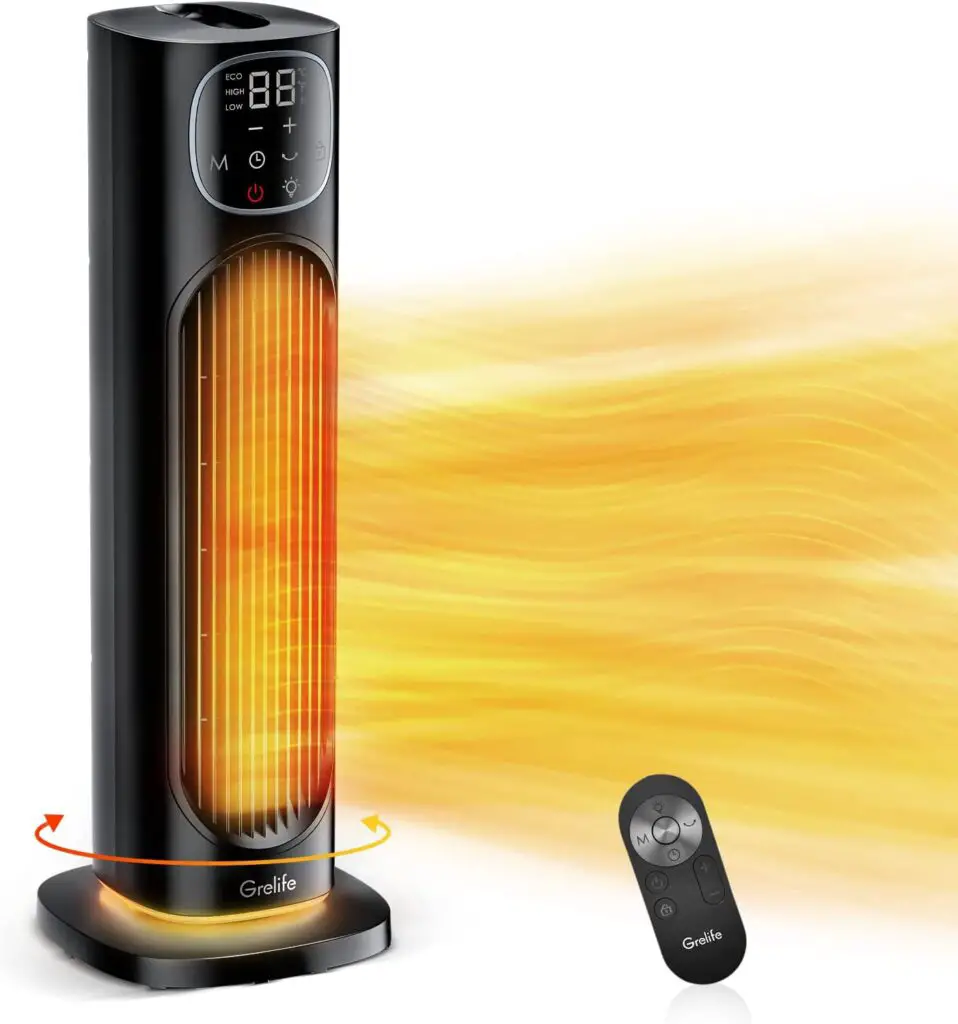
Grelife Space Heater is powered by PTC technology, which offers faster and more efficient heating compared to conventional heaters. It comes with a remote control and a digital touch control panel. Its ECO mode regulates energy use. It comes with a child lock, overheating, and tip-over protection.
- It heats up quickly
- Heats up a wide area
- It is ETL certified
- It has a functioning thermostat
- It smells of hot plastic
- Manual could be better
15. Amazon Basics 1500W Oscillating Ceramic Heater
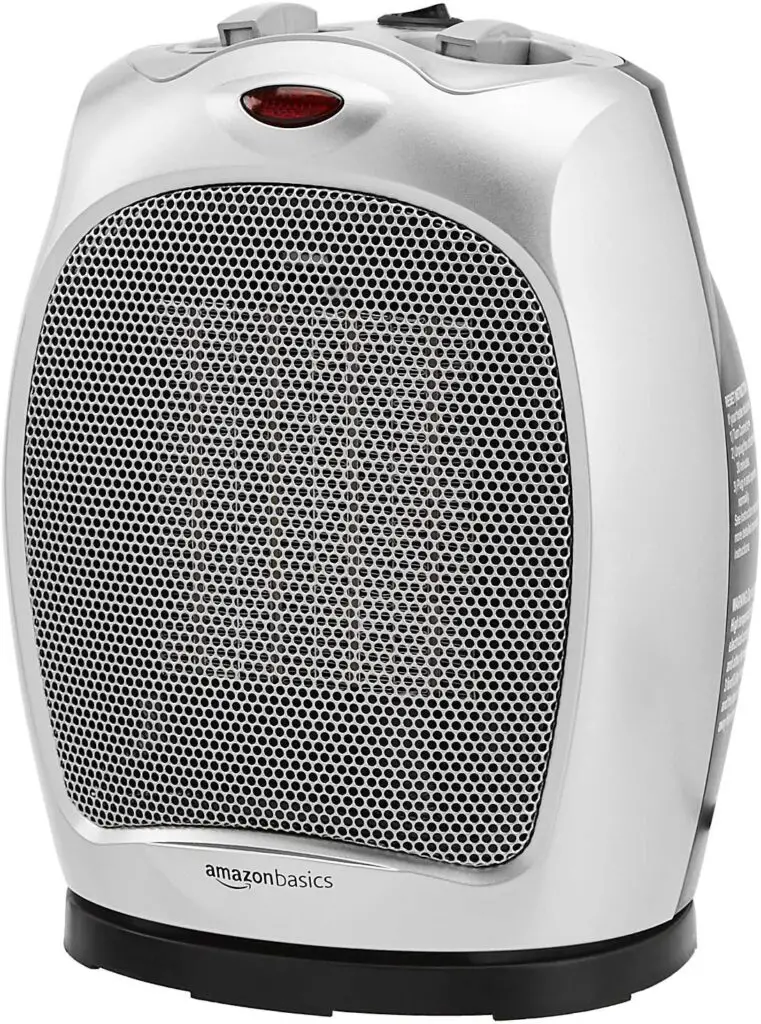
It has a compact design and comes with an adjustable thermostat. It oscillates, offering great heat dispersal in several directions. It has different settings, a tip-over switch with auto-shutoff and overheating protection. It comes with a carry handle for easy transport.
- It can be easily carried around
- It heats up quickly and releases a lot of heat
- It is inexpensive
- It remains cool on the exterior
- Tip-over shut-off works really well
- Does not cover much when it oscillates
16. BLACK + DECKER Ceramic Heater
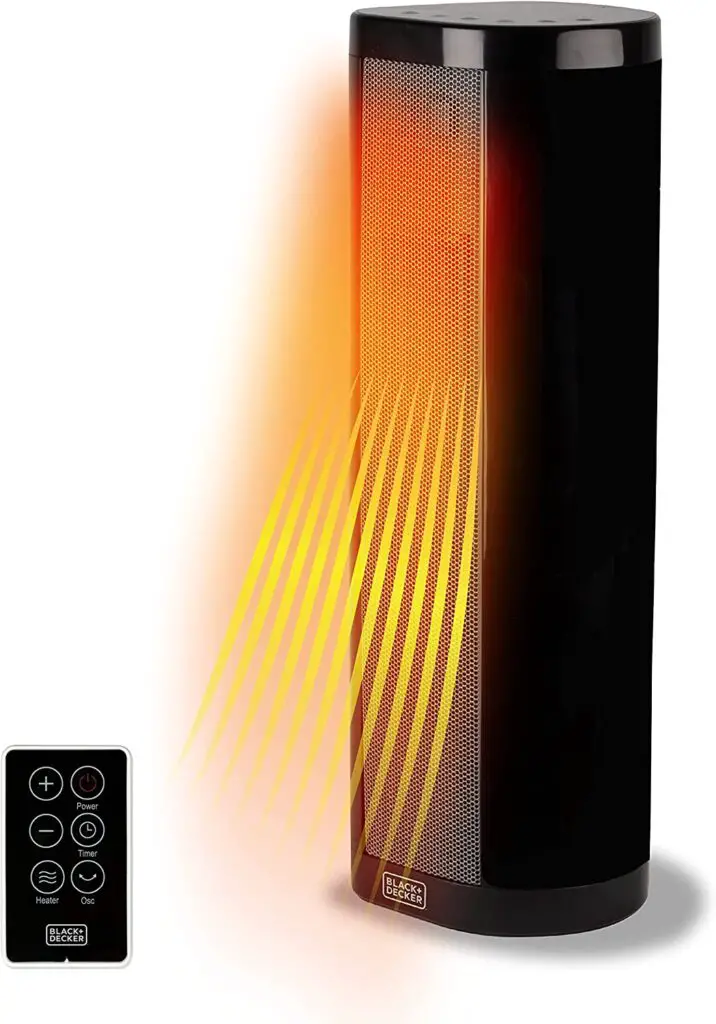
It is lightweight, yet feature-packed and powerful enough to warm your RV’s interior quickly and easily. It oscillates, comes with a remote control, and can be used horizontally or vertically.
- It is lightweight and has a convenient handle
- It has two settings with an adjustable thermostat
- Self-regulating ceramic heating element
17. Selanto Space Heater
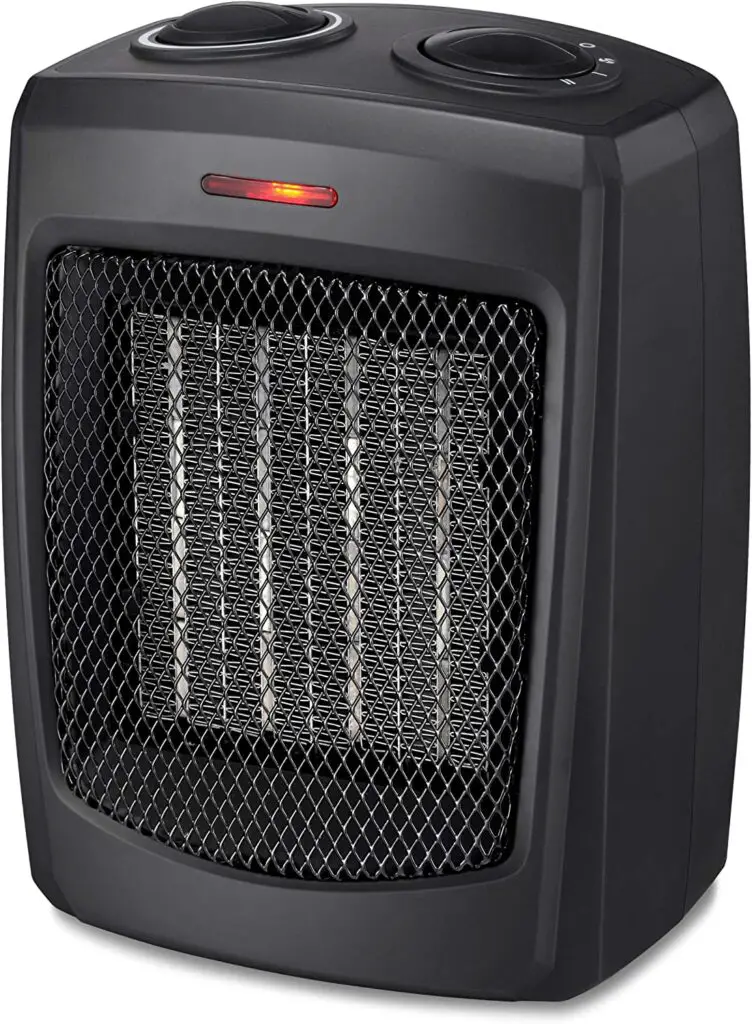
Selanto Space Heater has three different settings. It has an adjustable thermostat you can use to set your desired temperature. It has an automatic shut-off system that turns off the heater if it overheats.
- Affordably priced
- Heats up quickly
- Safe to use
- Energy-efficient
- Has tip-over protection
- It gets hot while running
- Eco and low heat modes are the same
- It gives off a strong plastic smell when it’s new
18. Dr. Infrared Portable Space Heater
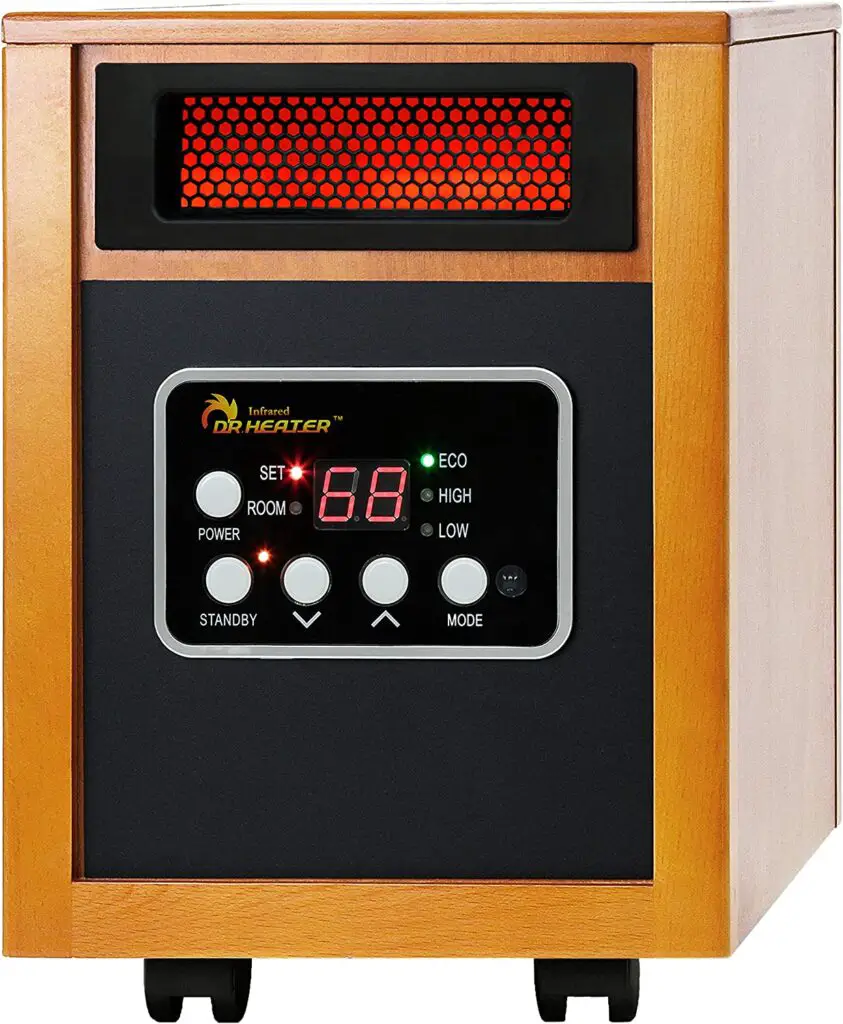
Dr. Infrared Heater is one of the best RV heaters. It covers up to 1000 square feet, has a sturdy base, and has tip-over and overheating protection. It can heat up a large RV. It has a programmable timer, a thermostat, and a remote control. And it works quietly.
- It is durable
- It has a programmable timer
- 90-day warranty by Amazon, 3 years warranty by the manufacturer
- A customer complained about the heat output
19. Lasko Designer Ceramic Space Heater
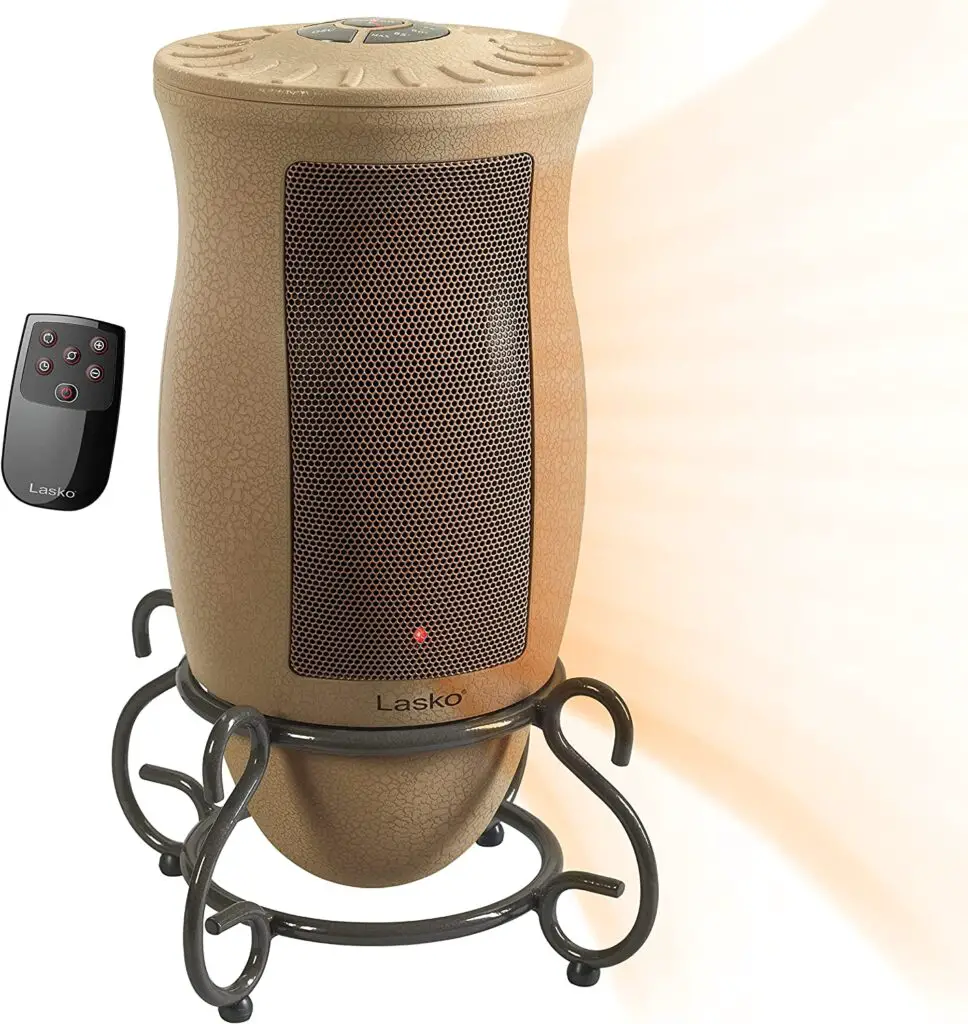
Lasko designer heater is stylish, so it’s also great as a piece of decoration. It has powerful ceramic heating elements. It has a timer and thermostat. It has a cool touch exterior and overheating protection.
- It is very attractive
- Performance is decent compared to similar models
In the article, we reviewed 19 different types of RV space heaters. The top pick is the Vornado MHV vortex heater. All the space heaters in the review are great for RV owners and are the ideal choice for indoor use when you go on a camping trip.
What about your propane furnace or RV propane heater, isn’t it cheaper than an electric heater? Yes, in some cases.
But when you factor in the fact that an RV propane-powered furnace is only about 70% efficient, it’s easy to see why an electric heater is a great complement.
Image by JoeBreuer from Pixabay and Image by OpenClipart-Vectors from Pixabay
Middle Class Dad is a participant in the Amazon Services LLC Associates Program, an affiliate advertising program designed to provide a means for sites to earn advertising fees by advertising and linking to Amazon.com. As an Amazon Associate, I may earn a small commission from qualifying purchases if you click to Amazon from my site and choose to make a purchase. This is no way increases the cost to you.
Jeff Campbell
Jeff Campbell travels on and off with his 3 daughters in a Newmar Baystar Class A Motorhome. He writes extensively on both RVs, campgrounds, parenting on the road tips, remote learning & schooling, and much more! Click Here to learn more about me. Click Here to learn more about my site. Editorial Policies.
Leave a Reply Cancel reply
Your email address will not be published. Required fields are marked *
Save my name and email in this browser for the next time I comment.
Top Related Posts
21 Best Tips for Living in an RV in the Winter Comfortably
Living in an RV is exciting, adventurous, and liberating. However, depending on where you are, winter can be harsh, especially if you're not prepared for it.Winter, especially in extra cold climates,...
How Cold Can it Get Before I Have to Winterize my Camper?
The harshness of winter depends on where you are based. Luckily, most people with an RV can move around. But if you’re staying put in a cold climate, you may have asked how cold can it get before I...

- Types Of RVs
- Tow Vehicles
- Maintenance & Repairs
- RV Power & Electrical Supplies
- RV Appliances
- Living In An RV
- Travel & Destinations
- RV Gear Buyer’s Guides
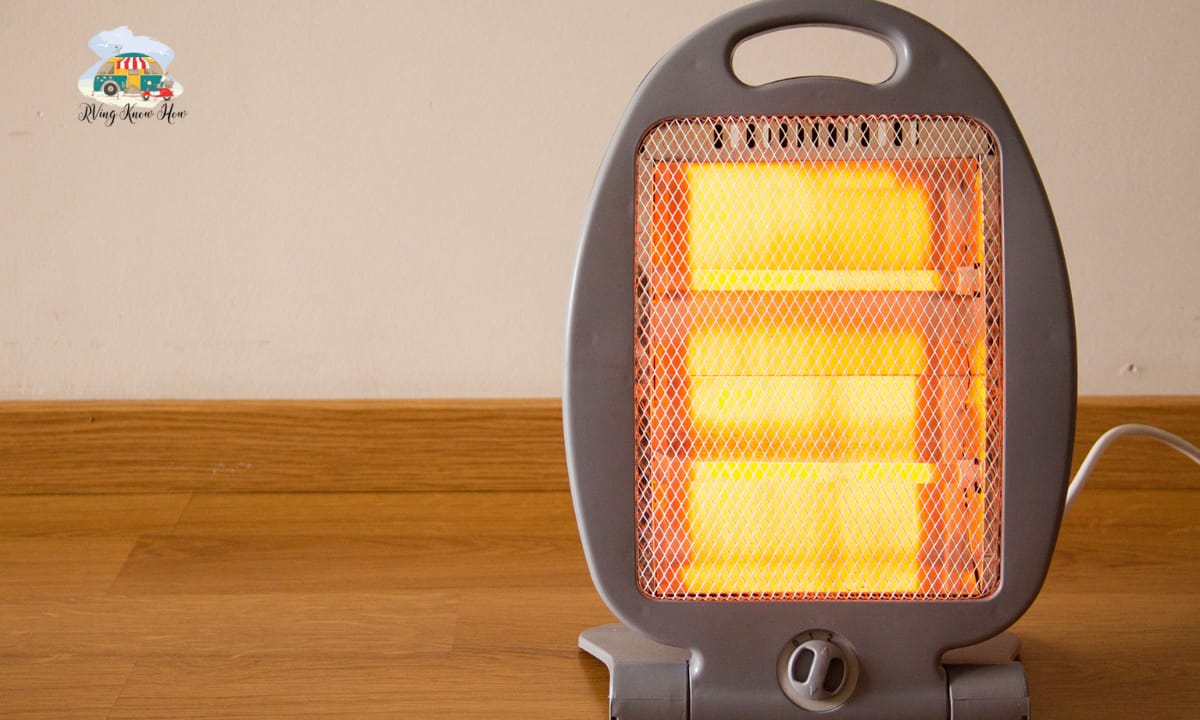
15 Best Portable Heaters For RV
- Last Updated: March 28, 2024
- 9 minutes read
Are you tired of enduring cold nights during your RV travels? Don’t let the frigid weather spoil your enjoyment! It’s time to explore a convenient solution that will keep you snug and warm on your next trip to oceanfront campgrounds in NC : portable RV heaters.
The cold becomes a distant memory as you relax with a steaming cup of cocoa, relishing the cozy ambiance.
However, with a multitude of options to choose from, finding the best portable heater for your RV can be overwhelming. That’s where I can help. Last winter, a friend overlooked the portable heater on his RVing trip . As you would expect, his trip was a cold disaster. Fortunately enough, he was able to get one before long. I wouldn’t want the same to happen to you.
So, I have identified the top 15 portable heaters explicitly tailored for RVs. The aim is to explain their features, compare their performance, and empower you to make an informed decision that aligns with your needs and budget.
Let’s dive into the realm of portable heaters and uncover the ideal companion for your upcoming adventures!
The Top 15 Portable Heaters For RV
Based on the following criteria, I have identified the best 15 portable heaters for RVs.
- Heating capacity
- Energy efficiency
- Safety features
- Portability
- User reviews
- Affordability
This list is not exhaustive and serves as a starting point for your research. It’s essential to consider your specific needs and consult additional resources before purchasing a portable heater for your RV.
1. Mr. Heater F232000 MH9BX Portable Buddy Heater
The Mr Heater F232000 MH9BX Portable Buddy Heater is a reliable indoor-safe heater that runs on propane. With its auto shut-off feature, you can use it with peace of mind on your next winter trip to oceanfront camping in North Carolina . It can efficiently heat up to 225 square feet, making it suitable for most RV sizes.
It provides adjustable heat settings, allowing you to customize the temperature. The sturdy construction ensures durability, making it an excellent investment for RV owners.
The Mr Heater F232000 MH9BX Portable Buddy Heater is priced at around $75, offering excellent value for its performance and safety features.
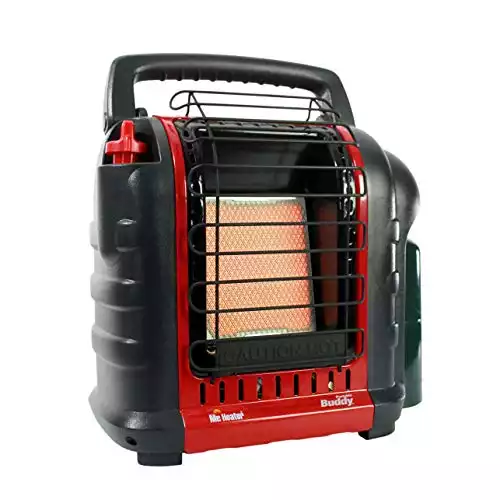
2. Lasko 754200 Ceramic Portable Space Heater
The Lasko 754200 Ceramic Portable Space Heater is a compact and versatile heating solution for RVs. It features an adjustable thermostat, enabling you to set the desired temperature. Its ceramic heating element ensures efficient heat distribution throughout the RV.
Priced at approximately $25, the Lasko 754200 Ceramic Portable Space Heater offers affordability without compromising functionality.
3. De’Longhi EW7707CM Safe Heat Portable Oil-Filled Radiator
The De’Longhi EW7707CM Safe Heat Portable Oil-Filled Radiator is a silent and energy-efficient option for RV heating. It offers multiple heat settings, allowing you to customize the warmth to your needs.
This portable heater for RV comes with a thermal cutoff and a built-in thermostat that provides safe and reliable operation. The oil-filled design ensures longer heat retention, even after turning off the heater.
With a price tag of around $90, the De’Longhi portable heater offers durability and great value for money.
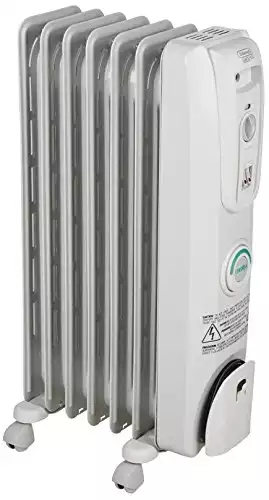
4. Dyson AM09 Fan Heater
The Dyson AM09 Fan Heater’s bladeless design and advanced features stand out. It provides precise temperature control, allowing you to maintain your desired comfort level. You can easily adjust settings anywhere in the RV with convenient remote control.
The heater also offers oscillation, spreading warmth evenly throughout the space. Although it comes at a higher price point, its innovative design and performance make it a popular choice among RV enthusiasts.
The Dyson AM09 portable heater, priced at approximately $400, can be a good buy if you are ready to spend those greenbacks.
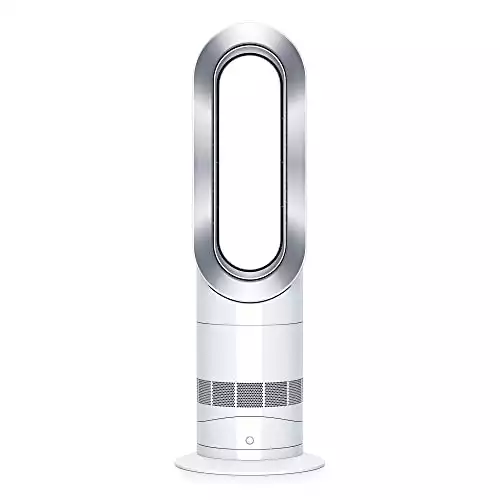
5. Honeywell HCE200W UberHeat Ceramic Heater
The Honeywell HCE200W UberHeat Ceramic Heater is a compact and reliable option for RV heating. Its compact design makes it easy to place in limited spaces without sacrificing performance.
You can find the perfect temperature for your comfort with two heat settings and an adjustable thermostat. It also includes overheat protection, ensuring safe operation.
Available at around $35, the Honeywell HCE200W UberHeat Ceramic Heater offers affordability, convenience, and reliable heating.
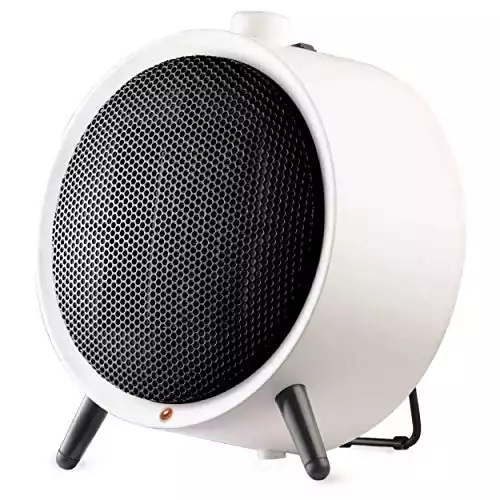
6. Vornado MVH Vortex Heater
The Vornado MVH Vortex Heater utilizes Vortex technology to provide consistent and even heat distribution in your RV. It has a convenience of an adjustable thermostat, allowing you to customize the temperature according to your preference on the ocean front campgrounds in NC .
The safety shut-off feature provides peace of mind by automatically turning off the heater in case of overheating. This heater’s compact size and powerful performance make it an excellent choice for RV owners.
With a price tag of approximately $60, the Vornado portable heater provides a great option to fit your needs.
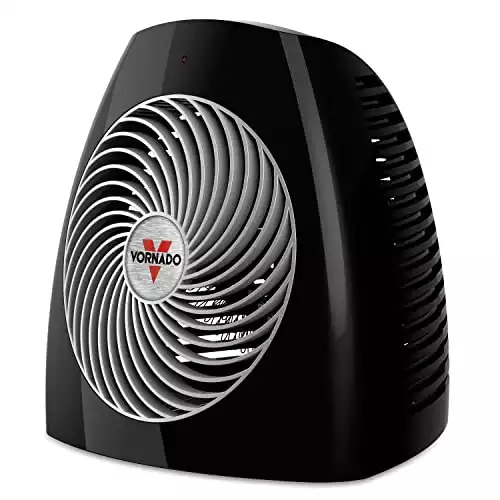
7. Dr Infrared Heater Portable Space Heater
With the unique combination of infrared and convection heating systems, the Dr Infrared Heater Portable Space Heater offers a versatile and efficient solution to keep your space warm. It provides dual heating modes, enabling you to choose between low and high settings based on your needs.
The remote control and built-in thermostat offer convenience and precise temperature control. With an auto energy-saving mode, it optimizes power consumption. Its portable design and quiet operation make it suitable for RV use.
Available at around $110, the Dr. Infrared Heater Portable Space Heater offers advanced heating technology and energy efficiency.
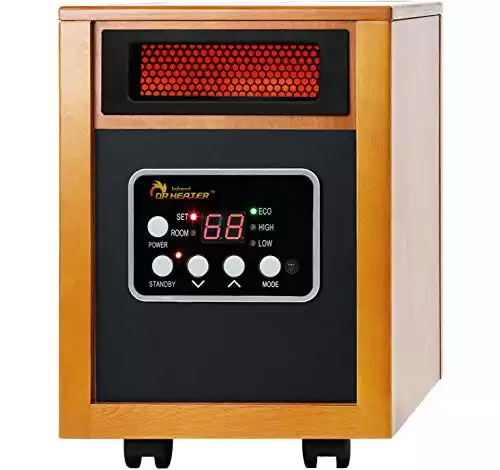
8. OPOLAR Ceramic Space Heater
The OPOLAR Ceramic Space Heater features oscillation, allowing it to distribute heat evenly across the RV. It offers tip-over protection, automatically shutting off the heater if it gets accidentally knocked over.
The adjustable thermostat and timer function provide flexibility and convenience. Smaller RV owners will love this heater owing to its compact size and quiet operation.
Priced at approximately $40, the OPOLAR Ceramic Space Heater offers affordability and reliable heating performance.
9. Pelonis PH-19J Pisa Tower Portable Ceramic Space Heater
The Pelonis PH-19J Pisa Tower Portable Ceramic Space Heater features a space-saving design, making it ideal for RVs with limited space. Its oscillation function ensures that heat is evenly distributed throughout the room.
The adjustable thermostat allows you to set the desired temperature quickly. Its sleek and modern look adds style to your RV while keeping you warm.
Available at around $64, the Pelonis PH-19J Pisa Tower Portable Ceramic Space Heater offers efficient heating in a compact package.
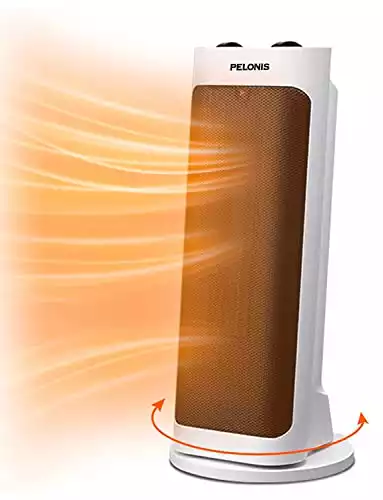
10. Lasko 5160 Ceramic Tower Heater
The Lasko 5160 Ceramic Tower Heater is a feature-packed heating solution for RVs. With its remote control and digital display, you can conveniently adjust settings and monitor the temperature.
The programmable thermostat allows you to set a desired temperature and let the heater maintain it. The oscillation feature ensures widespread heat distribution, while its compact design saves space in your RV.
Priced at approximately $70, the Lasko 5160 Ceramic Tower Heater offers versatility, convenience, and efficient heating performance.
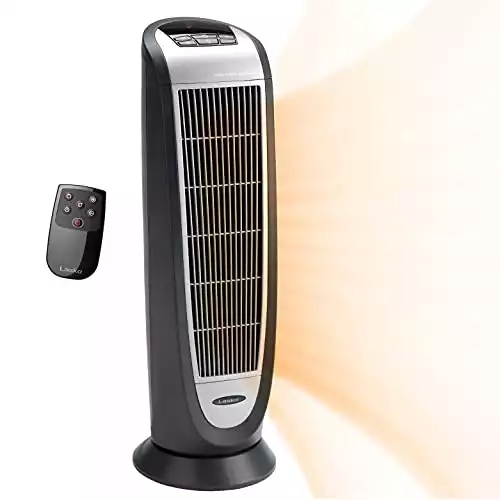
11. Comfort Zone CZ707 Personal Heater/Fan
The Comfort Zone CZ707 Personal Heater/Fan is a compact and budget-friendly option for RV heating. It offers dual heat settings, allowing you to choose between low and high heat output. It also includes a fan-only mode, making it useful in warmer weather.
With its overheating protection feature, you can use it with peace of mind. Its compact size and portability make it suitable for small RV spaces.
Available at around $29, the Comfort Zone CZ707 Personal Heater/Fan provides an affordable heating solution for RVs.
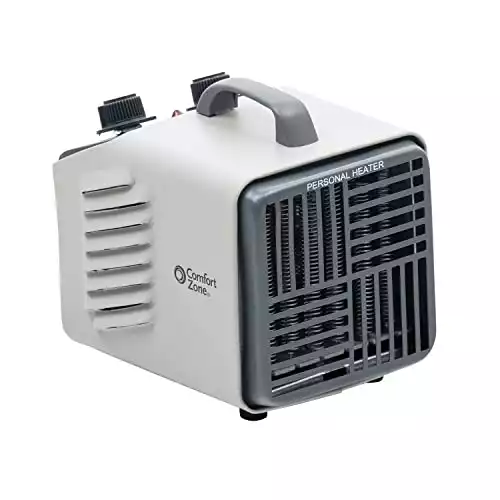
12. Optimus Infrared QuartzHeater
The Optimus Infrared QuartzHeater instant radiant heat, quickly warming up the surrounding area. It features an adjustable thermostat, allowing you to control the heat output while on the oceanfront campgrounds in NC.
The tip-over safety switch ensures automatic shut-off if the heater is accidentally tipped. It’s compact size, and lightweight design make moving and storing in your RV easy.
Priced at approximately $50, the Optimus H-5511 Infrared Quartz Radiant Heater offers efficient and focused heating performance.
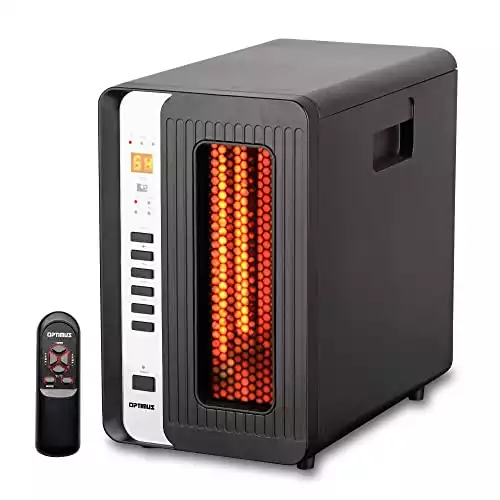
13. COSTWAY Oil-Filled Radiator Heater
The COSTWAY Oil Filled Radiator Heater offers quiet and efficient heating for your RV. With three heat settings, you can select the desired level of warmth. The built-in handle allows for easy transportation.
Moreover, this portable heater for RV comes with a thermal shut-off feature. This feature can be life-saving if you fall asleep with the heater in your RV.
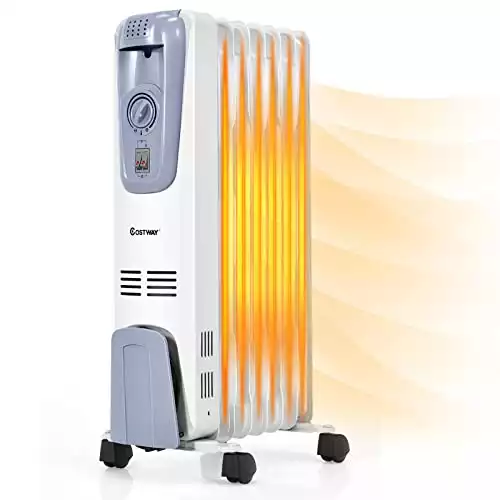
14. Broan-NuTone 6201 Big Heat Portable Heater
The Broan-NuTone comes with a durable metal build. This build makes it handy for outdoor or indoor use in the RV. It also boasts a built-in thermostat to help you automatically maintain your RV temperature.
Furthermore, the automatic shut-off feature also adds to the safety caused by turning off the heater when it reaches a specific temperature.
The cost of this heater is almost $40. It’s pretty good value for money.
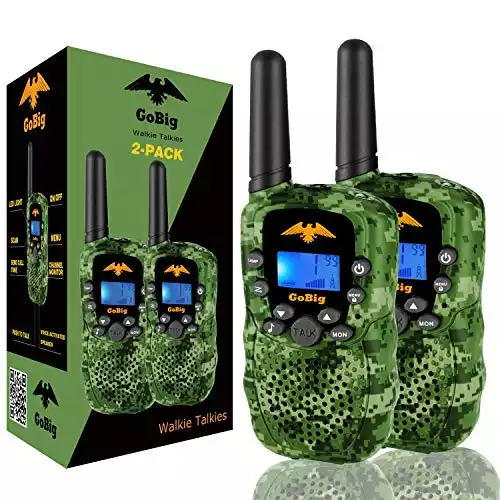
15. Lasko 5409 Ceramic Portable Space Heater
The Lasko RV heater is a compact and reliable heating solution if you are planning a long trip on your RV in winter. It comes with an adjustable thermostat. Moreover, the reliability of this heater is top-notch.
The Lasko provides affordable and efficient heating performance at around $30.
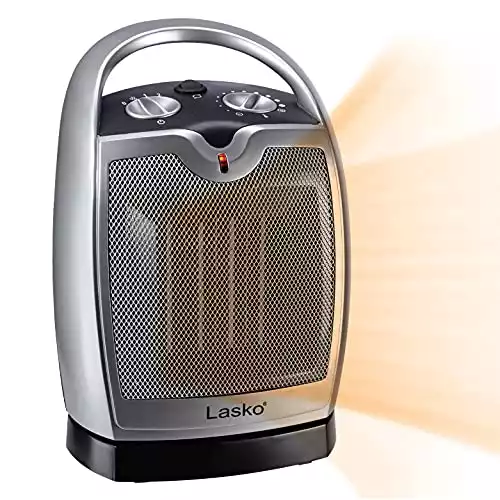
I have covered the top 15 portable heaters for RVs , each offering unique features and benefits. Whether you prefer propane, ceramic, oil-filled, or innovative designs, there is a portable heater that suits your needs and budget.
With these heaters, you can say goodbye to cold nights of oceanfront campgrounds in NC and create a home-like environment in your RV.
Act now and choose the best portable heater for your RV based on size, heating capacity, safety features, and budget.
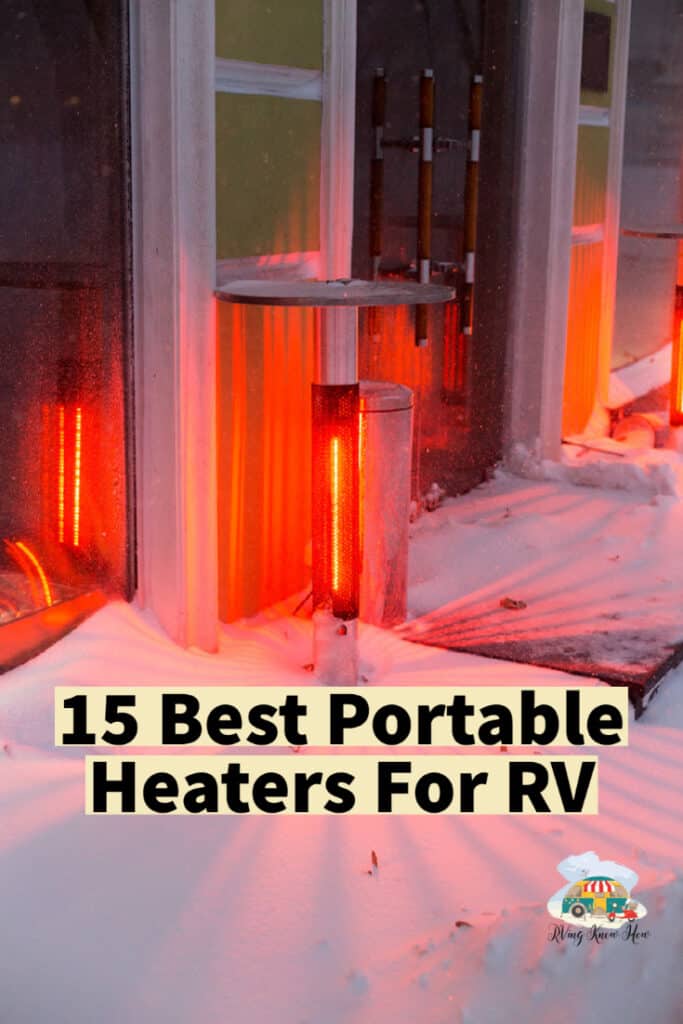
What is the best portable heater to use for an RV?
The best portable heater depends on your needs, such as heating capacity, safety features, and budget.
Can you use a portable heater in an RV?
Yes, you can use a portable RV heater if you choose one designed for RV use and follow safety guidelines.
What is the best way to heat an RV?
A combination of portable heaters, built-in heaters, electric blankets, and heated mattress pads provides the best results.
What is the safest way to heat an RV?
Use RV-specific heaters with safety features and proper ventilation, and keep flammable items away.
What kind of heater can you use in an RV?
The options include propane, ceramic, oil-filled, infrared, and electric heaters based on your preferences and fuel sources.
How can I keep my RV warm without a heater?
Insulate, use draft stoppers, seal windows, dress warmly, utilize sunlight, and consider electric blankets or heated mattress pads.
About Author / Aaron Richardson
Aaron Richardson is an expert RVer and the co-founder of RVing Know How. Aaron, along with his wife Evelyn, has been living and traveling in their Keystone Fuzion RV since 2017. Their adventures span across the country and beyond, including memorable RVing experiences in Mexico. Aaron's passion for the outdoors and RVing shines through in his writings, where he shares a blend of travel stories, practical tips, and insights to enhance the RV lifestyle.

How To Mount A Winch On A Trailer
Why are fifth wheels more expensive.

Leave a Comment Cancel reply
Your email address will not be published.
Save my name, email, and website in this browser for the next time I comment.
You Might Also Like

How to Keep Those Pesky Mosquitoes Out of Your RV And Campsite
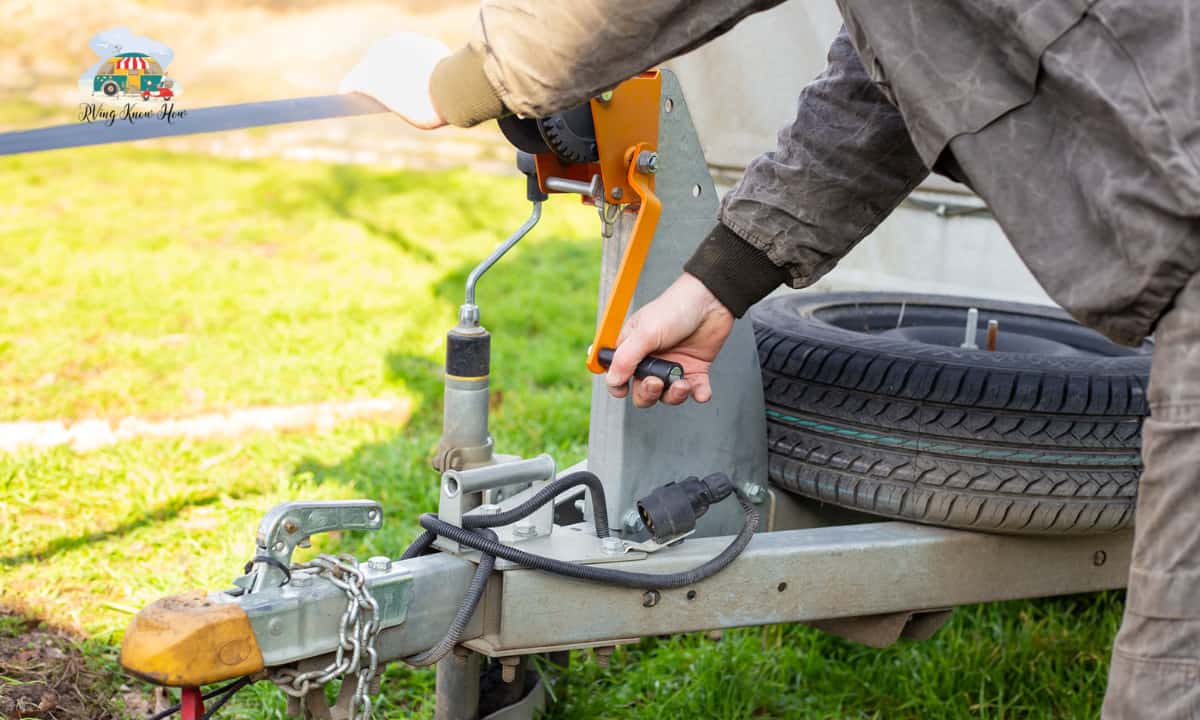
How To Fix A Sagging Floor In A Camper Slide-Out Section?
Start typing and press Enter to search
Effortless RVing
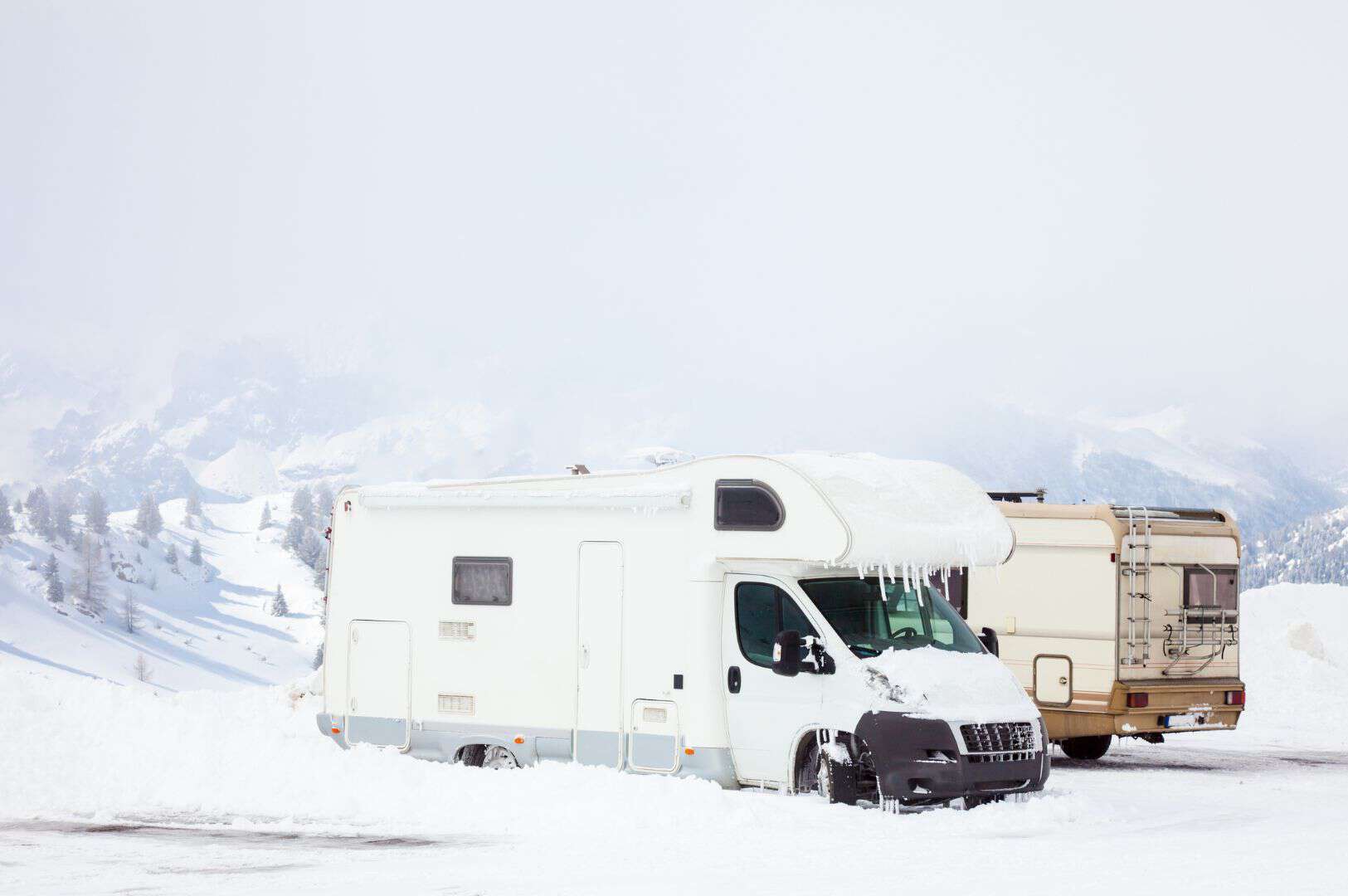
8 Best RV Heaters to Stay Cozy Anywhere You Go
RVs are a great way to explore the great outdoors, but they can get chilly when the temperature drops. If you’re a full-time RVer, a good heating system is essential for staying warm and comfortable during the winter months.
But with so many different RV heaters on the market, it can be tough to know which one is right for you. That’s where we come in. We’ve reviewed some of the best camper heater options on the market, so you can find the perfect one for your budget and needs.
Whether you’re looking for an electric heater for indoor use or a heavy-duty propane heater for sub-zero temperatures, we’ve got you covered. So read on to learn more about the best RV heaters on the market and find the perfect one for your next adventure.
What is an RV Heater?
What are the different types of rv heaters, propane rv heaters, electric rv heaters, 1. lasko oscillating ceramic space heater, 2. mr. heater mh9bx portable propane radiant heater, 3. amazon basics ceramic heater, 4. lasko digital ceramic tower heater, 5. brightown portable electric space heater, 6. dr. infrared portable space heater, 7. andily small space heater, 8. mr. heater indoor propane heater, fuel source, noise level, safety features.
RV heaters, also known as RV furnaces, are essential for staying warm and comfortable in your RV during the winter months or in colder climates. They come in two main types: propane and electric. Propane heaters burn propane gas to generate heat, while electric heaters use electricity. Both types of heaters typically have a fan or blower to circulate the warm air throughout the RV.
RV heaters are available in a variety of sizes and heating capacities to suit different RV sizes and layouts. They are also designed to be space-efficient and energy-conscious, considering the limited space and power resources available in RVs.
Safety is paramount when it comes to RV heaters. Many models are equipped with advanced safety features, such as automatic shut-off switches and carbon monoxide detectors, to ensure the safety of RV occupants. These features provide both warmth and comfort, as well as peace of mind.
In short, an RV heater is an indispensable companion for RV enthusiasts embarking on adventures in colder climates or during the winter months. It transforms your RV into a warm and cozy cocoon, allowing you to savor your journey no matter how frosty the outdoors may be.
To find the best RV heater, it’s important to understand your options. Otherwise, you may end up with a good product that’s not right for your needs. Depending on the power source, there are two main types of RV heaters: electric RV heaters and propane RV heaters .
Propane heaters are a good choice for boondocking because they don’t require electricity. They’re also cheaper than electric heaters and can handle extremely cold temperatures. However, they can be a safety hazard if not used properly.
Electric heaters are the most efficient and require the least maintenance. They’re not as budget-friendly as propane heaters, but they’re safer. However, electric heaters are not suitable for off-grid camping or in areas where there is no access to electricity.
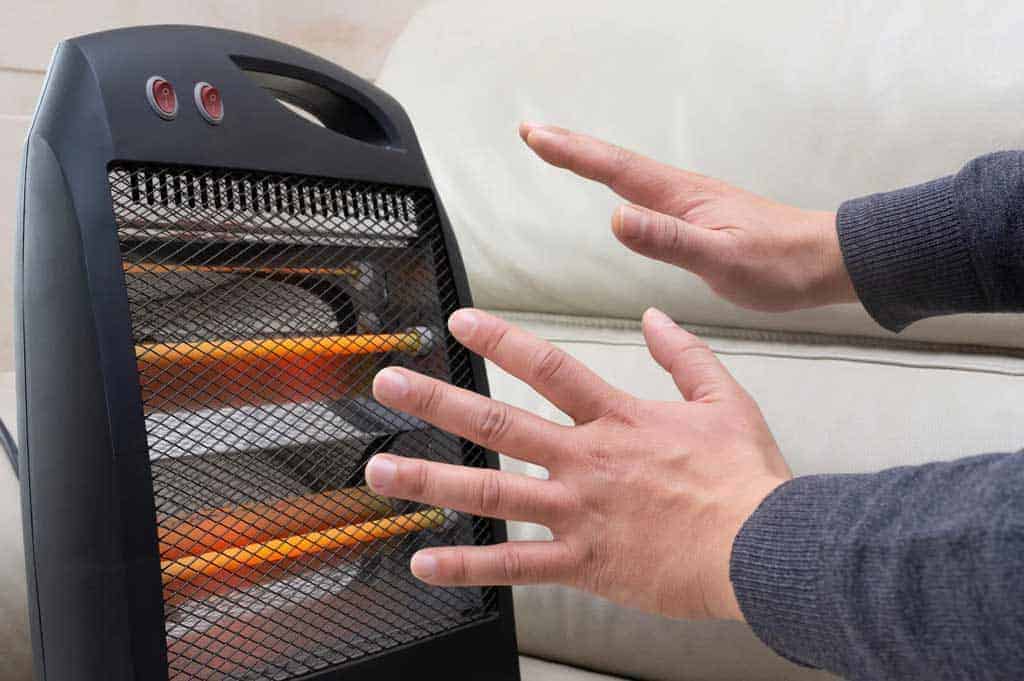
Again, there are three different variations of electric heaters:
- Infrared/Radiant
- Ceramic
Infrared heaters heat objects and people directly, providing instant warmth. They are energy-efficient for spot heating and portable.
Ceramic heaters use a ceramic heating element to generate heat and a fan to distribute it. They are efficient and provide even heating, with safety features like tip-over switches and overheat protection.
Oil-filled heaters use metal columns filled with oil to store and radiate heat. They are energy-efficient and continue to emit heat even after being turned off. They operate quietly and have safety features like tip-over switches and overheat protection.
How Does an RV Heater Work?
Propane RV heaters are a popular choice for recreational vehicles because they are efficient, reliable, and affordable. They work by burning propane gas to produce heat, which is then circulated throughout the RV using a blower or fan.
Here’s a closer look at how a propane RV heater works:
Ignition: To start the propane RV heater, you first need to ignite the propane gas. This is typically done using a pilot light or an electronic ignition system. Once the propane is ignited, it begins to burn and produce heat.
Combustion: The burning propane produces heat through a process called combustion. Combustion occurs when a fuel, in this case, propane, reacts with oxygen to produce heat, water vapor, and carbon dioxide.
Heat exchanger: The heat produced by the burning propane is then transferred to a heat exchanger. The heat exchanger is a metal component that is designed to absorb the heat from the combustion process and transfer it to the air that will be circulated throughout the RV.
Blower or Fan: Once the heat has been transferred to the heat exchanger, it is then circulated throughout the RV using a blower or fan. The blower or fan is typically located in the heater unit and is designed to distribute the warm air evenly throughout the RV.
Thermostat: A thermostat is used to control the temperature inside the RV. It is connected to the propane RV heater and is used to turn the heater on and off as needed to maintain a comfortable temperature.
Exhaust: Propane RV heaters produce exhaust, which must be vented outside of the RV. This is typically done using a flue or chimney, which is connected to the heater unit and extends through the roof of the RV.
Safety features: Propane RV heaters are equipped with several safety features to ensure safe operation. These may include automatic shut-off switches, carbon monoxide detectors, and flame sensors. These safety features help to prevent accidents and ensure that the heater operates safely.
Electric RV heaters are a popular choice for RV owners because they are easy to use, don’t require any fuel storage or ventilation, and are more environmentally friendly than propane heaters. They work by converting electrical energy into heat, which is then circulated throughout the RV using a blower or fan.
Here’s a closer look at how an electric RV heater works:
Heating element: The heating element is the key component of an electric RV heater. It is typically made of metal and is designed to resist the flow of electrical current, which causes it to become hot. The heating element is located in the heater unit and is designed to absorb the electrical energy and convert it into heat.
Blower or Fan: Once the heat has been produced by the heating element, it is then circulated throughout the RV using a blower or fan. The blower or fan is typically located in the heater unit and is designed to distribute the warm air evenly throughout the RV.
Thermostat: A thermostat is used to control the temperature inside the RV. It is connected to the electric RV heater and is used to turn the heater on and off as needed to maintain a comfortable temperature.
Safety features: Electric RV heaters are equipped with several safety features to ensure safe operation. These may include automatic shut-off switches and overheat protection. These safety features help to prevent accidents and ensure that the heater operates safely.
The Best RV Heater Options: In-Depth Reviews
When shopping for the best heater for RV, you will find plenty of options. So, we’ve curated this list for you to learn about the market-leading products and make the right decision.
Let’s dive into the brief reviews of the 8 best RV heater products in the market.

Why we love it:
Stay warm and cozy during the winter months with the space heater. With two quiet heat settings and an adjustable thermostat, you can enjoy personalized comfort in any room.
The portable RV heater from the Lasko brand is safe to carry in your RV or anywhere you go! This versatile heater is easy to use; the temperature can be controlled while it provides a cool outlook on your space.
You can heat up to 300 square feet of area, so it’s also good for heating your office or home. It has oscillating options for spreading the heat evenly. You’ll get so many features, yet it’s not too expensive.
It could be the best space heater for RV within a budget. If you are still looking for something cheaper, purchase the non-oscillating model.
- It also functions as a fan
- Runs quietly
- Safe for children and pets
- The heating element is non-combustible
- Easy to carry everywhere
- Temperature control isn’t always accurate
- The fan isn’t 100% silent when working

The camper propane heater can be used everywhere, outside or inside, and heats up to 225 square feet. The fuel burns cleanly, so there will be a minimum waste.
It could be one of the best RV heater units in terms of safety features. It’ll auto shut off when it’s tipped over, the oxygen level is low, or the pilot light goes off.
You can set two types of heating settings to stay comfortable in different temperatures. Also, a full tank will keep it running for more than 5 hours, so you can sleep at night without worries.
- The lightweight unit is only 1 pound
- Low-oxygen safety shut-off feature
- Safe when tipped over
- Suitable for outdoor area
- Low consumption of propane fuel
- Can’t operate properly 7000 feet above sea level
- It can’t cover a large area

The small RV heater is budget-friendly and looks cool in two available colors: black and silver. It runs on electricity and is mostly suitable for small spaces.
The feature to set temperatures in three settings gives you the freedom to control your comfort. You can use this in winter and even fall when the weather isn’t too cold. This TUV-certified heater can easily be carried to offices, vehicles, and everywhere you go.
Since there is an oscillating option, this heater can disperse heat evenly in the closed space.
- Has overheating protection
- Auto shuts off when tripped over
- Available in two colors
- TUV product certification
- Unsuitable for the outdoors and high-humid places

Lasko brand offers the best ceramic heater for RV in this model. Unlike the first one, this heater comes with a remote control, so you can do everything from the comfort of your bed or sofa.
Since this heater has more features, it’s a better option if you have pets or children. It costs you more than the manual heater, but it’s worth the price! There is a timer option to turn off the heater after a specific period.
- Timer to warm area for 1 to 8 hours
- The safe exterior is okay to touch even after running long
- Doesn’t overheat
- There’s no noise
- The digital display shows the temperature and settings for easy usage
- A bit heavier to carry
- You cannot use it outside

The unit could easily be the safest space heater for RV because of the standard safety features. It eliminates safety hazards by using high-quality flame-retardant materials. It also offers overheating and tip-over protection.
The small heater runs at various temperatures, and you can operate it as a fan in the summertime. It’s also the best RV heater for a quiet operation since the motor keeps the noise less than 50dB level.
- Quiet operation
- Quick heating feature
- Auto shuts off when overheats
- Auto shuts off when tilted over 45°
- Different colors to style your interior
- Not suited for large area
- You cannot use it outdoors

The space heater from Dr. Infrared looks elegant to add a vintage charm to your RV’s interior. It’s the best electric heater for travel trailer considering you want it for a large room.
You can operate the unit manually or with remote control. It has several safety features, including tip-over protection and an automatic shut-off timer.
- Safe to touch anytime
- Suited for a very large room, up to 1000 square feet
- Has a wheel to move in different rooms easily
- Has energy saving mood to reduce electric bill
- Timer up to 12 hours
- Slightly expensive
- Not easily movable

The electric heater is a good choice for warming up small areas. Thanks to the rapid heating option, it can heat up a small room within 2 seconds. You can switch between three heating options for the best comfort. It will also function as a fan for the summer season.
Like other heaters, this one also has overheating and tripping protection. Carry it anywhere you want, as it will easily fit a tight space.
- Compact size can fit any tight space
- Can warm a medium size room
- Lightweight
- A carry handle for transportation
- Quick heating within 2 seconds
- The cable is very thin
- Controlling the temperature is a bit unstable

The last heater on our list is also from the Mr. Heater brand. It looks quite different from other products in this article. The cute little heater is your quick-heating solution for tiny spaces, less than 100 square feet.
Since the fuel burns cleanly, you don’t have to deal with any foul propane odor. This heater has a handful of safety features, including tip-over protection and low-oxygen detection.
- Low-oxygen sensor
- Auto shut-off option for protection
- Easily portable
- Suitable for both indoors and outdoors
- Runs for more than 5 hours
- Not suited for large space
- Won’t work in high-altitude above 7 thousand feet
- Can’t be used in a moving vehicle
What to Consider When Buying a New Camper Heater?
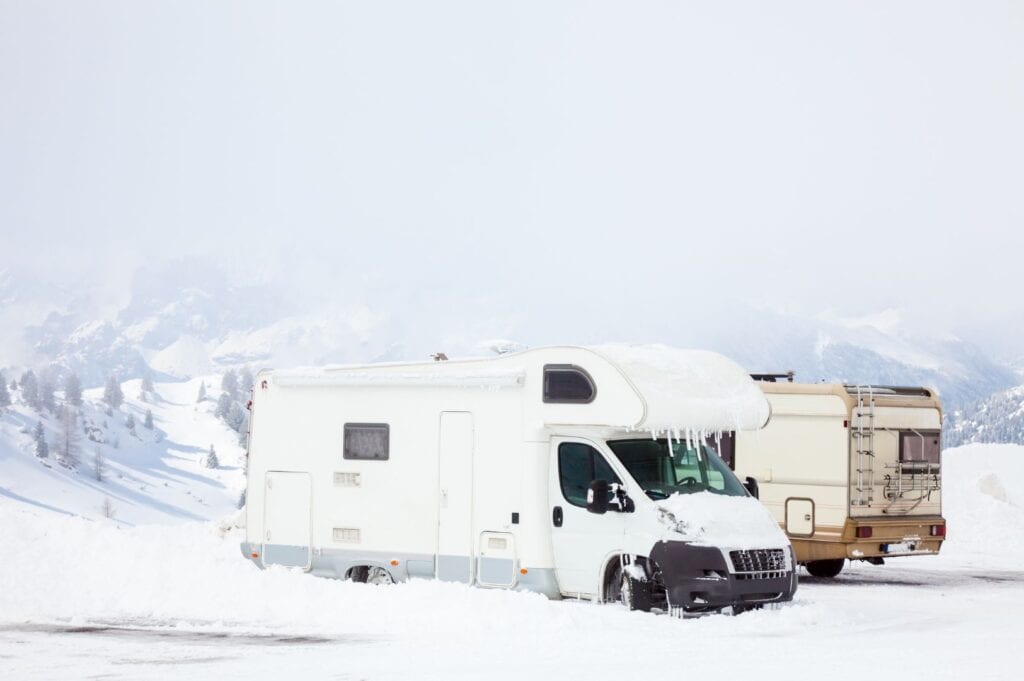
Buying a new camper heater is an important decision, as it will play a vital role in keeping you warm and comfortable during your camping trips. With so many different types and models available, it can be tricky to know which one to choose. To help you make the best decision, here are some key factors to consider:
One of the most important decisions you’ll make when choosing an RV heater is whether to go with propane or electric. Both types of heaters have their own advantages and disadvantages, so it’s important to weigh the pros and cons carefully before making a decision.
- Propane heaters: Propane heaters are a good option for boondocking or off-grid camping, as they do not require electricity. They work by burning propane gas to produce heat, which is then circulated throughout the RV using a blower or fan. Propane heaters are typically more efficient than electric heaters, but they can be more noisy and require proper ventilation to avoid carbon monoxide poisoning.
- Electric heaters: Electric heaters are a good option for RV parks or campsites with electrical hookups. They are easy to use and do not require any fuel storage or ventilation. However, electric heaters are less efficient than propane heaters and may not be able to produce enough heat in cold weather.
Which type of RV heater is right for you depends on your individual needs and preferences. If you plan on doing a lot of boondocking or off-grid camping, then a propane heater is the way to go. However, if you prefer the convenience of electric hookups and don’t mind the higher cost, then an electric heater is a good option.
The size of the heater will depend on the size of your RV and the climate you will be camping in. If you have a small RV or will be camping in mild weather, you may be able to get away with a smaller heater. However, if you have a large RV or will be camping in cold weather, you will need a larger heater.
It is important to set a budget before you start shopping for an RV heater. This will help you narrow down your choices and choose a heater that fits your needs and price range.
BTU, or British Thermal Unit, is a unit of energy equal to the amount of heat required to raise the temperature of one pound of water by one degree Fahrenheit. The BTU output of a heater refers to the amount of heat it can produce. A higher BTU output means that the heater can produce more heat, which is important for larger RVs or camping in cold weather. BTU output is an important consideration when choosing an RV heater, as it determines how much heat the heater can produce.
Propane RV heaters typically have a BTU output of 20,000-40,000 BTUs. This means that they can produce a lot of heat, which is ideal for large RVs or camping in cold weather. However, propane heaters are also less efficient than electric heaters, which means that they will use more energy to produce the same amount of heat.
Electric RV heaters typically have a BTU output of 1,500-5,000 BTUs. This means that they produce less heat than propane heaters, but they are also more efficient. This makes them a good choice for smaller RVs or camping in mild weather.
When choosing an RV heater, it is important to consider the BTU output of the heater in relation to the size of your RV and the climate you will be camping in. For example, if you have a large RV and will be camping in cold weather, you will need a heater with a high BTU output. However, if you have a small RV and will be camping in mild weather, you can get away with a heater with a lower BTU output.
It is also important to note that electric RV heaters are often measured in watts rather than BTUs. One watt is approximately equal to 3.41 BTUs. So, if you are comparing electric RV heaters, be sure to convert the wattage output to BTUs to get an accurate comparison.
RV heaters can vary in noise level depending on the type and model.
Forced-air heaters, which use fans to distribute heat, are typically the noisiest, ranging from 45 to 65 decibels. Electric ceramic and oil-filled heaters are quieter, at 35-55 decibels and 20-40 decibels, respectively. Infrared heaters are the quietest, often producing noise levels below 30 decibels.
Factors such as fan speed, insulation, and the design of the heating unit can affect noise levels. If noise is a concern, consider researching specific models known for quiet operation or using noise-canceling materials in your RV. When choosing an RV heater, compare the noise levels of different models. Look for heaters with fan speed controls so you can adjust the noise level to your liking.
Safety is always a top priority, so look for a heater with built-in safety features such as automatic shut-off switches and carbon monoxide detectors.
Overheat protection is a critical safety feature that automatically shuts off the heater if it reaches an unsafe temperature. This prevents the unit from becoming a fire hazard. Overheat protection is especially important when the heater is left unattended or operating for extended periods.
Oxygen depletion sensors (ODS) are found on propane-powered RV heaters, such as those that use catalytic or blue flame technology. An ODS detects a decrease in oxygen levels within the RV and automatically shuts off the heater if oxygen levels fall to a potentially dangerous level. This prevents oxygen depletion, which can lead to health risks and carbon monoxide buildup.
Besides, when using RV heaters, you should also consider to use Carbon monoxide detectors. These are not built into RV heaters, but it is highly recommended to have one in your RV. Carbon monoxide (CO) is a colorless, odorless gas that can be produced by incomplete combustion of propane or other fuels. A carbon monoxide detector will alert you if dangerous levels of CO are detected, allowing you to take immediate action, such as ventilating the RV and shutting off the heater.
RV heaters range in price from a few hundred dollars to over a thousand dollars. The price of a heater will depend on a number of factors, including the type of heater, the size of the heater, the features of the heater, and the brand of the heater.
Propane heaters are generally more expensive than electric heaters because they are more powerful and efficient. Ceramic and oil-filled heaters are typically the most affordable types of RV heaters. Infrared heaters are also relatively affordable, but they may not be as powerful as other types of heaters.
Features such as thermostats, remote controls, and multiple heat settings can also increase the price of a heater. If you don’t need or want all of these features, you can save money by choosing a heater with fewer features.
Once you have considered all of these factors, you can start shopping for the best camper heater for your needs. Be sure to read reviews of different models before making a purchase. This will help you get a better idea of what other campers think of the heaters and which ones are the most reliable.
Choosing the best RV heater depends on your needs. For example, if you travel to high places often, you can’t use most propane heaters since they can’t work where oxygen is low.
Again, an indoor heater won’t be the best option for you if you spend more time outside. So, first, decide on what you really want and then get that heater for yourself.
If you want a performer at a reasonable price, we recommend the Lasko oscillating ceramic space heater.
About The Author
David Kelly
David Kelly is the founder of Effortless RVing. He is an accomplished writer and passionate traveler who specializes in the RV lifestyle. With a keen eye for undiscovered gems and a love for adventure, David's articles provide a unique and insightful perspective on camping and RV travel. As a former Sales Manager at Camping World, David is dedicated to staying up-to-date with new trends in RV world and the ever-changing landscape of RV travel, making him a valuable resource for both experienced enthusiasts and newcomers to the lifestyle. Whether you're looking for RV product reviews, tips, inspiration, or a glimpse into the camping lifestyle, David's sharing posts are a must-read.
Leave a Reply Cancel Reply
Save my name, email, and website in this browser for the next time I comment.
NEW YOUTUBE DROP: S54-Swapped BMW 328is
Best RV Heaters: Keep Your RV Warm, Dry, and Mold-Free
Love RVing all year round? A spare or backup RV heater is a must
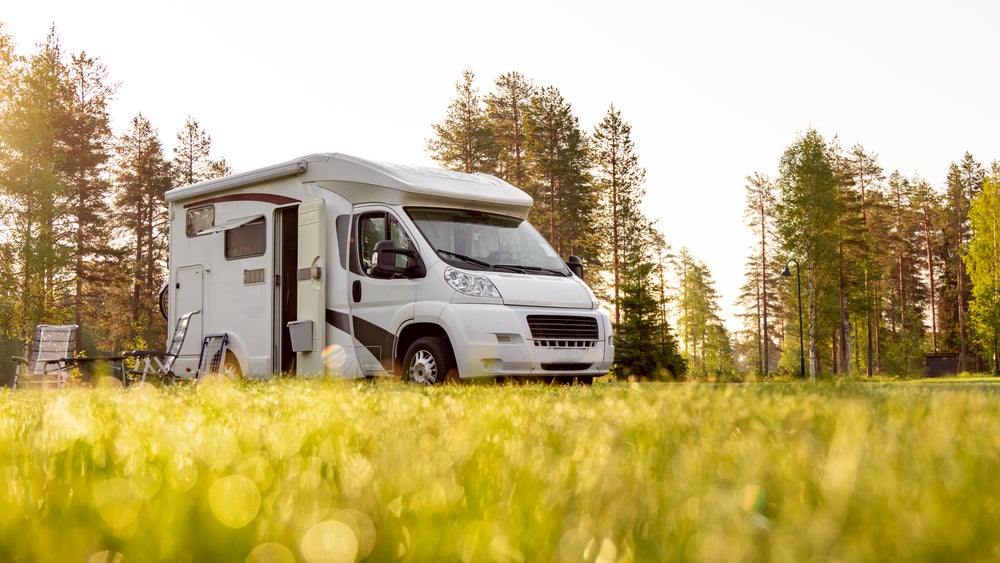
We may earn revenue from the products available on this page and participate in affiliate programs. Learn more ›
A good RV heater is a must for keeping your RV dry and cozy in cooler weather. It can also protect your appliances from damage due to condensation and below-freezing temperatures. RVs, campers, and boats are also notorious for attracting mold, and a proper heater can combat that problem. Check out some of the best RV heaters on the market.

Heat Storm Phoenix HS-1500-PHX
You can mount this heater on the wall or use it on the floor. It has two power modes: 1,500 watts and 750 watts.
- Heater is cool to the touch
- Has a built-in thermostat, LED display, and remote control
- Lightweight and easy to transport
- Struggles to heat a space when it's very cold
- Not particularly energy efficient

Isiler Space Heater
Don’t let the small size of this heater fool you: while it only measures 6 x 6.7 x 7 inches and weighs just 38.8 ounces, it provides enough heat to warm up 108 square feet. It is safe and quiet.
- It’s capable of heating up to 1,500 watts in seconds
- There is an auto shutoff if it’s tipped over or if it overheats to prevent fire
- Features an incrementally adjustable thermostat
- Needs to be 3 feet away from any objects
- Requires AC power to function

Lasko Ceramic Portable Space Heater
This personal space heater is great for small areas. It comes fully assembled. It has a 1,500-watt ceramic heating element with 11 different temperature settings. Features a cool-touch exterior.
- Its compact size and convenient carry handle allow it to be easily moved from the kitchen to the bedroom or anywhere else
- Overheat protection feature ensures this heater does not overheat
- Does not have a safety off switch in the event it tips over
- Not suitable in large spaces at high heat
Benefits of an RV Heater
- Keep your RV warm. An RV heater keeps your motorhome warm, ensuring you, your family, and friends don’t freeze when it gets cold. Maintaining warmth inside your RV is also important because the heat prevents your appliances and the RV from getting damaged by condensation and cold temperatures.
- Travel in any weather. When you have a good RV heater, the fun never stops. You can explore new places even when the weather is not so friendly. A heater allows you to enjoy RVing during the winter and have adventures in places with low temperatures.
- Variety of options. RV heaters come in different types and can either be electric, gas-powered, or oil-powered (oil furnaces), which we detail below. With so many options, you can buy one that suits your needs and fits within your budget.
Types of RV Heaters
Gas heater .
Gas heaters use two types of gas: natural and propane. Propane gas is typically compressed and stored as a liquid. Natural gas is a naturally occurring hydrocarbon gas mixture consisting of mostly methane. The major drawback of gas heaters is that they need to be refilled in order to keep working. Also, gas is highly flammable, therefore any leakage can be extremely dangerous. Gas heaters cost more but are cheaper and easier to maintain. And they may require minimal electricity to operate.
Electric Heater
This heater transforms electricity into heat. It doesn’t produce any byproducts and is safer than a gas heater. It is slower at dispensing heat because it doesn’t have vents and ducts. To boost its performance, you can use a fan to spread the heat. Many electric heaters are lightweight and portable, which is convenient. The downside is they can only heat one space at a time. And since the heater is not built into the RV, it can tip over and potentially cause a fire.
Oil-Powered Heater (Oil Furnace)
This heater operates like a gas heater and heats up just as fast. However, its heat lasts much longer. Oil-powered heaters are safer than gas heaters because they don’t produce carbon monoxide. However, these heaters also have their shortcomings. Their primary risk is that of fire and burns. Oil heaters can also be noisy, but this depends on the model. They are the least popular of all RV heaters and are mostly used as radiators.
Established by the De'Longhi family, this is an Italian company that manufactures household and industrial appliances. It was launched in 1902 as a workshop for manufacturing small industrial parts. Its headquarters are in Treviso, Italy. In addition to portable heaters, the company produces air conditioners, small cooking and food preparation appliances, and cleaning and ironing products. It is well- known for its unique creations like the DeLonghi Oil-Filled Space Heater .
Broan-NuTone
Originally known as NuTone, this is an American company founded by J. Ralph Corbett in 1936. It produces ventilation systems, electric heaters, and indoor air quality products for residential use. In 1987, the company was bought by Valor, a British home products manufacturer. In 1998 the company was added to the Broan Group. It is headquartered in Hartford, Wisconsin. Its top-rated heater, the Broan-Nutone Heater , makes a wonderful addition to any space.
Suburban Manufacturing
Founded in Dayton, Tennessee, in 1947, this company is a leading manufacturer and distributor of RV heating and cooking appliances. Its name is well-known for enhancing the RV lifestyle. Its products are synonymous with quality, longevity, and reliability. In 1997, Suburban Manufacturing was acquired by Airxcel, Inc. The company produces specialty appliances for ventilation, air conditioning, and heating, such as the Suburban Electronic Furnace .
RV Heaters Pricing
- $50-$150: These RV heaters are usually small. They can heat up larger spaces with ease. Some are portable and can be used in different rooms. Some are equipped with an auto shut-off feature which prevents accidents. Most of these heaters can run for five or more hours.
- $150-$300: These heaters may be powered by oil, electricity, or gas. They have unique features like thermostats, auto shut-off valves, overheat protection, and remote controls. They are typically quieter, compact, and lighter in weight. Some produce up to 18,000 BTUs per hour.
Key Features
Safety features.
An RV heater can be a safety hazard because it can start a fire. Thankfully, the best RV heaters are equipped with safety features. These include auto shut-off valves, overheat protection, cool-touch surfaces, remote controls, and inner switches. The auto shut-off valve prevents overheating or ignition if the heater tips over. A cool-touch surface ensures you don’t get burned. If you’re getting a propane heater, get one whose fuel valve closes immediately when the pilot light switches off.
Fuel or Power Consumption
Consider how much power or fuel your RV heater needs. Check the voltage, overall wattage, and the current. These influence the heat produced and the electricity a heater uses. Also, take the time to confirm if the heater is ideal for your RV. A bigger RV requires a more powerful heater. In case you are buying a propane heater, identify how much gas it needs to run. The last thing you want is to freeze in the middle of nowhere.
An RV heater’s efficiency is measured using the British Thermal Unit (BTU). It determines how efficiently the device burns fuel or how much electricity it needs to heat up space. How long does the heater take to heat up a room? Can it maintain the same temperature for extended periods of time? Does it go on and off frequently? The best RV heater should emit a high amount of heat and consume minimal energy. Get a heater with a range of temperature settings. You can always adjust the settings and save energy. A heater that draws a lot of power can destroy your RV’s battery.
Other Considerations
- Noise Level: The noise level of an RV heater is an important feature. Compare different models and read reviews before deciding which one to buy. The best RV heaters don’t produce a lot of noise. The presence or absence of a fan determines a heater’s noise level. Some electric heaters are equipped with a built-in fan, which distributes the heat. This feature makes them noisier than other heaters.
- Cost: How much a heater costs is influenced by its heat-production capacity and the additional features it comes with. Your budget and the features you want will dictate the amount you spend. Portable heaters typically cost $100 or less, but it depends on the brand and features. Centralized heating devices usually cost more than $500.
- Ease of Use: Find out how easy or challenging it is to use the heater. Can someone who is unfamiliar with RV heaters use it? Does it require an expert? The best RV heater is user-friendly. A good example is a portable heater. It is easy to use and to maintain. You can always get a high-tech heater later on.
Best RV Heaters Reviews & Recommendations 2021
Best Overall
The wall-mounted Heat Storm Phoenix HS-1500-PHX heater is great for small areas in which there's not a lot of floor space. It also comes with removable feet, so you can place it on the ground. It features two power modes, 1,500 watts and 750 watts, with 5200 BTUs. The heater, including the grill, is safe to touch, and it uses HMS technology that produces safe heat without interfering with oxygen or humidity.
The heater has a built-in thermostat, LED display, and remote control. Users report that it's lightweight and easy to move. It's also not very loud and easy to mount on the wall. The unit can take some time to heat a room, particularly if it's very cold, but ultimately it provides good performance. In addition, the manufacturer provides a one-year warranty should you experience any issues.
There have been some complaints that it doesn't produce enough heat overall, so if you use it in a cold climate, you may be disappointed by its output. It's also not very energy efficient.
ISILER Space Heater
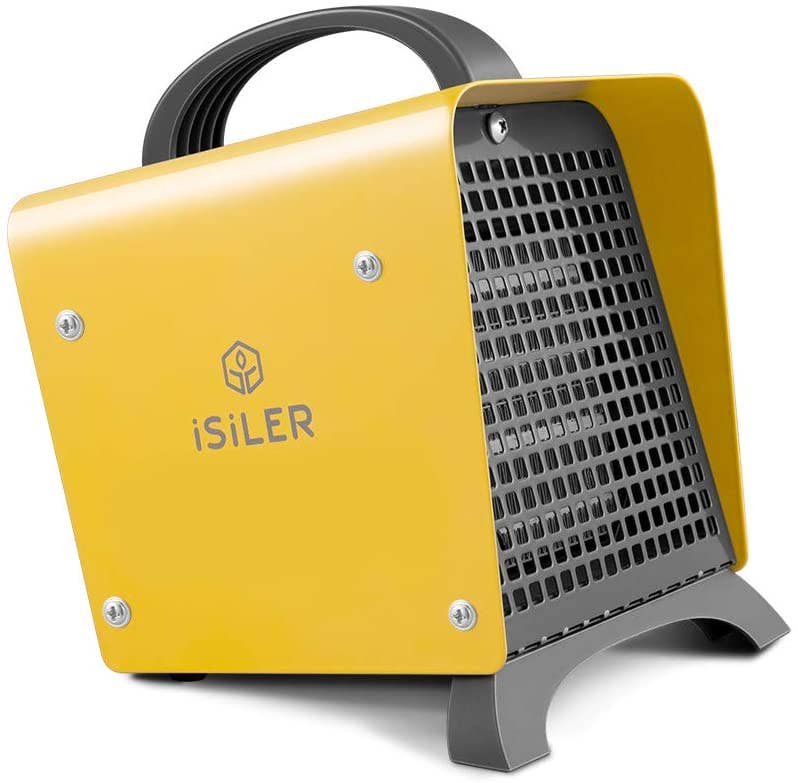
The Isiler Space Heater is a powerful and compact heater that will fit inconspicuously in most RVs, making it a great little space-saving heater that’s offered at an extremely competitive price point. Constructed from durable rust-resistant and fire-retardant materials, this ceramic heater is a self-regulating heater that features automotive overheat and tip-over protection to avoid accidental fire or burning of surrounding materials.
It quickly produces up to 1,500 watts of heat that is capable of heating up to 108 square feet of space. The adjustable thermostat can be incrementally altered to produce temperatures between 41 and 95 degrees Fahrenheit, allowing you to completely customize the amount of heat you need and want to stay warm and comfortable. Weighing a mere 38.8 ounces and equipped with an ergonomic handle, this little heater is super lightweight and easily portable. The manufacturer does recommend leaving three feet of space between furniture and the heater, which may be difficult in some smaller RVs.
Best Compact
Specifically created for small spaces, this heater is great for warming RVs. Its compact size and carrying handle make it portable, so you can use it in different rooms. It doesn’t take up a lot of space and is ideal for RVs with limited space. It is also user-friendly and features straightforward manual controls. It has three quiet settings: fan, low heat, and high heat.
Lasko puts safety first by integrating different safety features. The overheat protection feature switches the heater off if you leave it on for too long. Also, the heater doesn’t overheat when you use it for extended periods of time. It has a cool-touch exterior and stays cool no matter how long you use it. Its adjustable thermostat has 11 different temperature settings, and it allows you to regulate the heat and save energy.
This heater comes fully assembled; you only need to plug it in to start enjoying the warmth. It has a ceramic heating element and draws 1500 watts of power. But its biggest drawback is it doesn’t have an auto shut-off valve. In case it tips over, it can be a hazard. What’s more, it is unsuitable for warming large spaces, even when on the high-heat setting.
Best Freeze Protection
Xtreme Heaters Boat, Cabin & RV Heater

The Xtreme Heaters Boat, Cabin & RV Heater is convenient because it draws air from the top, so you can place it against a wall or on a carpet and not have to worry about safety. This low-profile heater is portable and has a stable base, so it won't tip over.
It has built-in overheat protection and an automatic thermostat to protect against freezing. The heater has two heat modes: 1500 watts and 750 watts. It comes with a 6-foot power cord, so there's some flexibility when it comes to finding a place to plug it in. Users like that it's quiet, small, and unobtrusive. The small size makes it an ideal heater for small campers.
However, it's a little pricey, and it doesn't come with a remote control.
Most Versatile
Honeywell HCE311V Digital Ceramic Compact Tower Heater
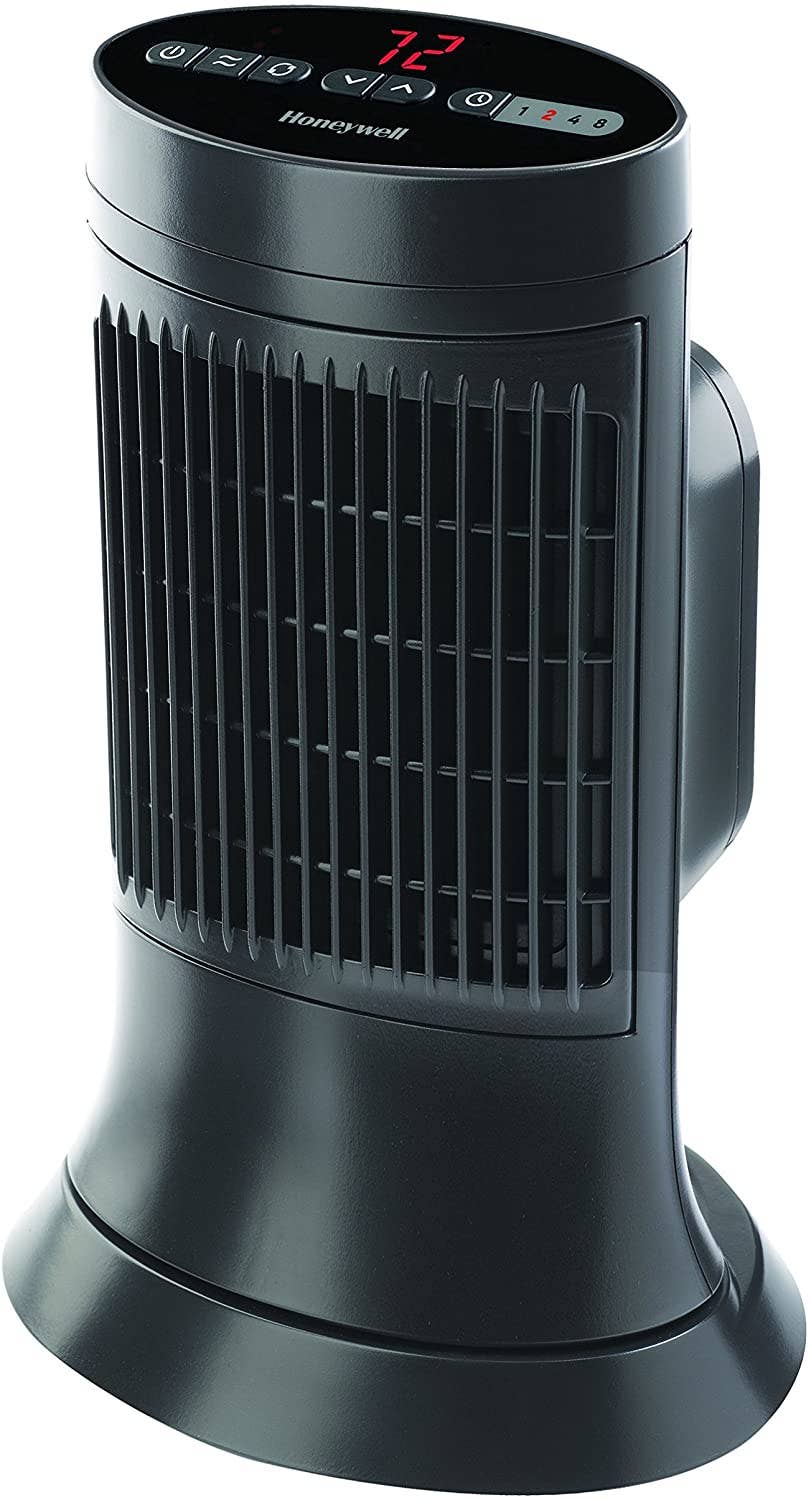
If you’re in the market for a portable RV heater that will also work anywhere else you need it to, the Honeywell HCE311V Digital Ceramic Compact Tower Heater is a powerful, economical, and space-saving option. This slim design of this heater is only 2.7 inches deep, allowing you to place it almost anywhere to effectively heat different areas. It features two constant heat settings, an easy to read digital programmable thermostat, 1, 2, 4, and 8-hour timer settings with automatic shut-off, and 360-degree tip-over protection that will instantly shut the heater off should it get knocked over.
This heater also features overheat shut-off protection, an energy-efficient oscillating base, dust filter, and a well thought-out cool touch plastic housing. It has a 1,500 watt capacity that is capable of effectively heating most RV spaces. The only drawback is that this unit requires 110-volt AC power to function and can’t run on 12-volt or propane like many RV heaters.
- At some point in your RVing adventures, you will probably run into cold weather and your onboard furnace will not turn on. An RV heater makes a great backup, so it makes sense to have one for emergencies.
- A built-in RV furnace’s electric fan blower can be very loud. If you’re having a cold night, the blower can be very irritating as it cycles on and off all night. If you’re off-grid, it will run your batteries down.
- In the winter, a low-heat RV heater is a must to keep mold at bay and water pipes from freezing during unexpected cold snaps. Even Florida experiences occasional below-freezing weather.
Q: Why do I need an RV heater when my unit has a built-in furnace?
A: Built-in furnaces are gigantic energy hogs that are heavy users of both propane and electricity. Most portable RV heaters are much more fuel-efficient and are a good energy-saving device for even casual RVers.
Q: I only use my RV in the summer months. Why would I need another RV heater?
A: Some locales can have unseasonably cold weather even in the summer, particularly at higher elevations. In the winter, an RV heater on minimum heat can keep mold at bay and prevent freezing during cold snaps.
Q: Which is better; propane or electric RV heater?
A: This depends on where you are. Propane and electricity costs vary all over the country. The big plus with propane is its portability if you enjoy backwoods RVing away from hookups and the grid.
Final Thoughts
We found the Heat Storm Phoenix HS-1500-PHX to be the best all-around heater for most RVs and campers due to its good performance and durability. You can save money with our efficient value pick, the Isiler Space Heater .
Why Trust Us
Our reviews are driven by a combination of hands-on testing, expert input, “wisdom of the crowd” assessments from actual buyers, and our own expertise. We always aim to offer genuine, accurate guides to help you find the best picks.

Other ‘ RV Accessories ’ Reviews You Might Like:

Home » Product Reviews » 3 Best Electric Heaters For Your Travel Trailer (2022 Review)
3 Best Electric Heaters For Your Travel Trailer (2022 Review)

- Last Updated: Apr 6, 2024
When you’re out on the open road in your travel trailer, there’s nothing more important than staying warm. That’s why having a good electric heater is essential to keep you comfortable on those cold winter nights. This blog post will look at today’s best electric heater for travel trailer. We will help you choose the right one for your needs!
Best Electric Heater For Travel Trailer
Caframo true north space heater.
Caframo’s True North Space Heater is one of the best electric heaters for travel trailers and a top-of-the-line, energy-efficient way to heat your RV. Utilizing far infrared technology, the True North Space Heater emits a gentle, warming radiant heat that is safe for people and pets.
The heater’s compact size makes it perfect for small spaces, and it can be easily mounted to the wall or placed on a table or shelf. With its three heat settings and built-in timer, the True North Space Heater provides customized heating for any room in your house or RV. And because it uses no moving parts, the True North Space Heater is quiet and maintenance-free.
WHAT WE LIKE
- It has an automatic shut-off feature that will turn the heater off if it gets too hot, which is excellent for safety.
- It provides remote control to adjust the temperature anywhere in the RV and five different settings to adjust heat output and fan speed.
- Lightweight and portable, you can easily take it with you when traveling.
- One of the most affordable electric heaters on the market and comes with a five-year warranty.
Heat Storm Phoenix Infrared Space Heater
The Heat Storm Phoenix is an infrared space heater designed to provide targeted heat relief. It features a dual ceramic heating element that produces infrared waves, which are then directed toward the object or area you want to heat. The result is a focused beam of heat penetrating deep into the skin, providing long-lasting relief from pain and stiffness.
The Heat Storm Phoenix also features a built-in fan that circulates the warm air around the room, providing even heating and making it ideal for use in larger spaces. Additionally, the unit comes with a remote control so that you can adjust the settings without having to get up.
WHAT WE LIKE:
- It has three heat settings, allowing you to customize your desired heat.
- It offers remote control and easy installation.
- This space heater is very lightweight and portable, making it easy to take with you on the go.
- A built-in timer, so you can set it to turn off after a certain amount of time.
- It is ETL Safety Certified.
Lasko Ceramic Portable Space Heater
The Lasko Ceramic Portable Space Heater is a small, portable heater designed to be used in various settings. The heater has two heat settings, high and low, and an adjustable thermostat .
The heater also features a tip-over switch that turns the heater off if it tips over, and a built-in carry handle. The Lasko Ceramic Portable Space Heater is ETL listed and comes with a three-year limited warranty. The unit measures 6.3 x 7.5 x 9.2 inches and weighs 3.8 pounds. The Lasko Ceramic Portable Space Heater is available in white or black.
- Lightweight and portable
- Easy to use
- It can be used in small spaces
- Not too loud
- Reasonable price
What Is an Electric Heater?
Electric RV heaters are designed to be used in travel trailers or campers. They are usually small and portable, making them easy to take with you on your trip. Electric heaters work by converting electrical energy into heat.
This type of heater for RV is typically more expensive than other RV heaters, but they are very efficient and can quickly heat a small space. If you are looking for an electric heater for your travel trailer, check out the options available on the market today.
You will be able to find a variety of sizes and styles to choose from, so you can find one that best suits your needs. Electric RV heaters are a great addition to any travel trailer or camper and can help you stay warm and comfortable on your next adventure.
Different Types Of Electric Heaters For RVs
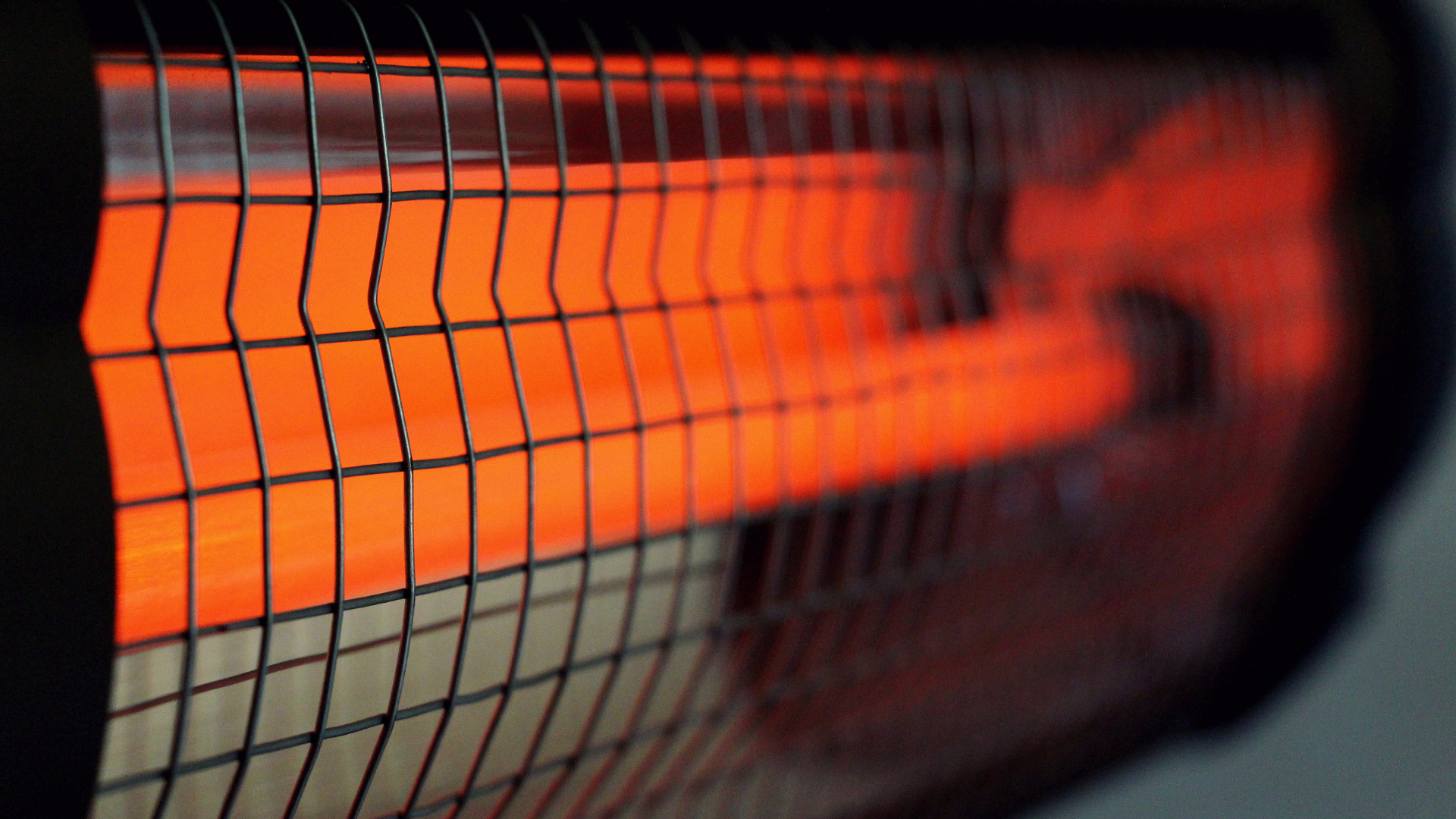
Infrared Electric Heaters
Portable infrared heaters are a great addition to any RV, providing warmth and ambiance without taking up much space. An infrared heater works by emitting invisible waves of infrared radiation, which are absorbed by objects in the room.
This type of heater is very efficient, as it only heats the objects in the room, not the air itself. Because they don’t rely on convection to circulate warm air, infrared heaters are also very quiet. However, they can be more expensive than other heaters and may require special outlets or wiring. This is an efficient and unobtrusive way to heat your RV.
Fan-Forced Electric Heaters
Fan-forced electric heaters are a popular choice for RVs because they are relatively small and lightweight. They work by using a fan to circulate warm air around the RV, and they can be used to heat both the living space and the engine compartment. Some models also come with a thermostat, so you can set the desired temperature and let the heater do the rest.
Fan-forced electric heaters typically have two settings: low and high. The low setting is excellent for gentle background heat, while the high setting can be used for more rapid healing.
One downside of fan-forced electric heaters is that they can be noisy, so if you are looking for a quiet option, this may not be the best choice. Another thing to remember is that fan-forced heaters only work when plugged into an electrical outlet, so they are not ideal for use in remote locations.
Convection Electric Heaters
Convection electric heaters are a type of space heater that uses electricity to heat up a metal element, emitting heat into the surrounding area.
They are typically used in RV applications because they heat up small spaces efficiently. Convection electric heaters work by circulating the air around the room using a fan, which helps to distribute the heat evenly.
This type of heater is very quiet and does not produce any flames or sparks, making it a safe choice for use in an RV. Some convection electric heaters also come with a built-in thermostat, which allows you to set the desired temperature and then let the heater do its job.
Features That RV Electric Heater Should Have
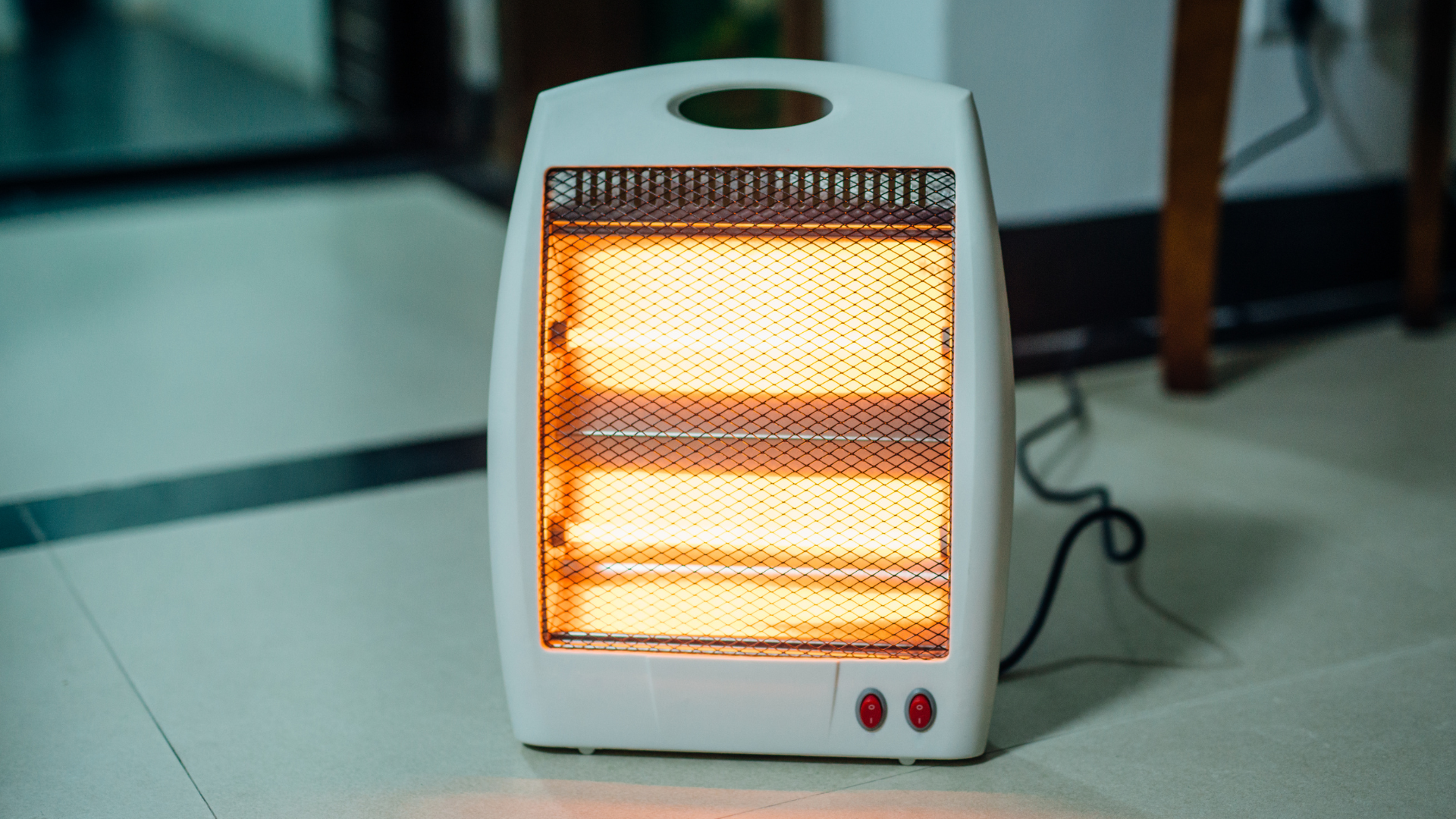
Multiple Heat Control Settings
Most of the best electric heater for travel trailer comes with multiple heat control settings. This will allow you to adjust the temperature to suit your needs and external conditions. Some models even have a remote control so that you can adjust the temperature from anywhere in the room. Another feature to look for is a timer.
This will allow you to set the heater to turn off after a specific time, so you don’t have to worry about running all night. You should also ensure that the model you choose has overheat protection. This will shut off the heater if it gets too hot, preventing accidents.
Tip-Over Protection
One crucial feature is tip-over protection. This feature prevents the heater from turning on if it is knocked over. This is important because it can prevent fires if the heater falls over and lands on something flammable. Tip-over protection is especially important if you have pets or small children in your RV, as they can knock over the heater more quickly than adults.
Automatic Shutoff
This feature will ensure that the heater turns off automatically if it tips over or the room temperature exceeds a certain level. This can help to prevent fires and other accidents.
Is It Safe To Use RV Electric Heater?
Most RVs come with electric heaters, and many campers find them a convenient way to stay warm. However, there is some debate about whether or not these heaters are safe to use.
Some campers worry that the heaters will overload the RV’s electrical system, while others are concerned about the fire risk. However, electric heaters are generally considered safe if they are correctly used.
The key is to ensure that the heater is the correct size for the RV and that it is not left unattended. As long as these precautions are taken, an electric heater can provide a convenient and safe source of warmth.
The Cheapest Way To Heat An RV
One of the challenges of RV living is finding affordable ways to heat your vehicle. The propane heater is often the go-to option for many RVers, but it can be expensive to fill up a tank. Luckily, a few other options for heating your RV can help you save money.
- One option is using electric space heaters. These can be plugged into a standard outlet, providing enough heat to warm a small space.
- Use a wood-burning stove. This can be a more cost-effective option if you have access to firewood.
- You can also invest in RV insulation to help keep heat in and lower overall heating costs.
You can find the cheapest way to heat your RV and enjoy a comfortable environment all winter long by exploring all of your options.
Can Generator Be Used To Power RV Electric Heater?
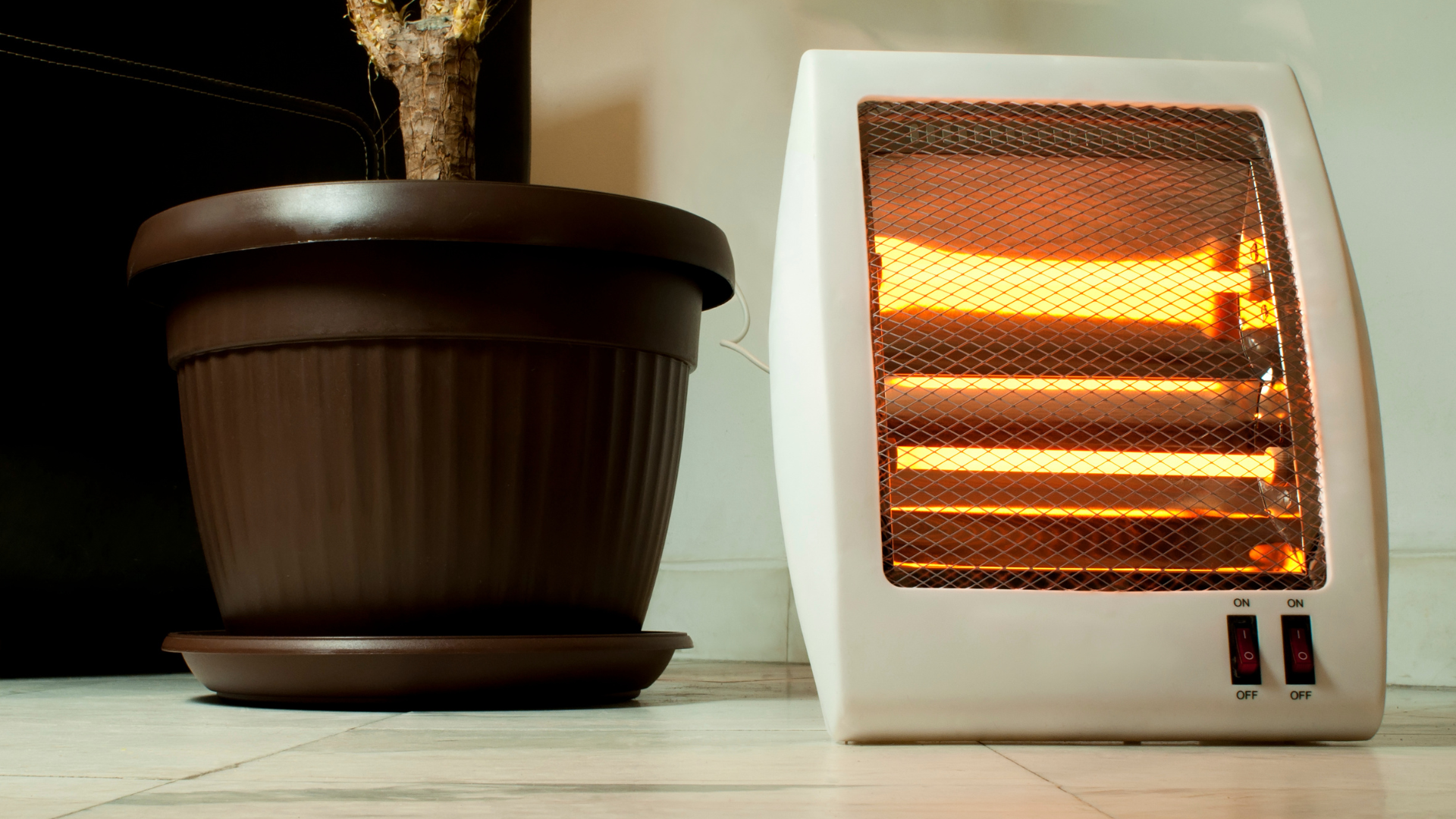
Electric RV heaters can be a great way to stay warm on chilly nights, but they also require a lot of power to run. This often leaves RVers wondering: can I use my generator to power my RV electric heater? The answer is yes, but there are a few things you need to keep in mind.
- Your generator needs enough power to run the heater and any other appliances you might be using.
- You’ll need to ensure that the generator is adequately ventilated, so it doesn’t overheat.
- You’ll need to be mindful of noise levels, as some generators can be loud.
But as long as you keep these things in mind, powering your RV electric heater with a generator is possible.
Wrapping Up
Electric heaters are a great way to keep your travel trailer warm, but there are a few things you need to keep in mind when using them.
- Ensure that the heater’s area is clear of flammable materials.
- Never leave the heater unattended.
- Always unplug the heater when you’re not using it.
By following these simple safety guidelines, you can enjoy the benefits of an electric heater without putting yourself at risk. Now that you know the best electric heater for travel trailer, you can stay warm and comfortable on your next camping trip.
You May Also Want To Check These Out
- How To Winterize A Travel Trailer
- Best Wheel Chocks For Travel Trailer
- Best Bike Rack For Travel Trailer

Leave a Comment Cancel reply
Recently published guides.
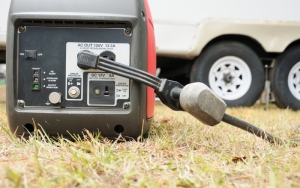
Buying a Generator for RV Life

RV Refrigerators: How Do They Work?

How to Repair Norcold Fridge Flap

- Books & Merch
- Gear We Use
- National & State Parks
- Best RV Campgrounds in New Hampshire
- Best RV Campgrounds in NC Mountains
- Best Florida Beach RV Campgrounds
- South Dakota
- The Great Lakes
- Campers Swear By This Portable Device That Keeps Dogs Safe -The Best Portable Dog Fence for Camping (2024)
- Mosquitos and bugs
- Camping Clothes
- Camping Gifts
- Camping Internet
- 5 Best RV Backup Cameras for RV & Trailer
- 7 Best Screen Tents for Camping (2024)
- Best RV Campgrounds in California
- 5 Best Key West RV Parks
- 9 Best RV Campgrounds in New Jersey
- Camping Reservations
- Campground Comparisons
- Cheap or FREE RV Camping Sites
- Best RV Campground Memberships & Clubs
- Boondocking 101
- Boondocking Adventures
- RV Internet
- What Do Flamingos and Upside Down Pineapples Mean?
- Where to Find FREE or Cheap RV Sites Camping
- RV Winter Camping
- RV Show List for 2024
- 17 Best Camper Vans 2024 (New Class B RVs Available!)
The 5 Best Electric Heaters for RVs
Our votes for the best electric heaters for rvs.
- 1 Our votes for the best electric heaters for RVs!
- 2.1 1. Lasko Ceramic Tower Heater
- 2.2 2. Lasko 754200 Ceramic Heater
- 2.3 3. Handy Heater Wall Heater
- 2.4 4. Amazon Basics 1500W
- 2.5 5. 1500W or 750W Ceramic Heater & Cool Fan
- 3.1 Mr. Heater F232000 MH9XBX Buddy Heater
- 4.1 Tip 1. Auto Shut Off Safety Feature
- 4.2 Tip 2. Figure Out Your Square Footage
- 4.3 Tip 3. Get One with a Remote Control
- 4.4 Tip 4. Pay Attention to Wattage
- 5 Your Vote for Best Electric RV Heaters
Exploring the world in your RV can take you to magical places. But those magical places can come with cold weather, especially in the winter months! That means you will want the best space heater to keep your rig warm!
Or, perhaps your RV’s pre-built propane heater does not work well. You might want to replace it with an electric model.
Whatever the case may be, you might find yourself in the market for a new electric heater.
Luckily, I have made it easy for you. I have compiled this comprehensive list for you to find the best electric heater for RV use .
The Best Electric Heaters for RVs (5 Great Options)
After combing through many different electric heater options, I have narrowed down my list. The options below include both low and high-wattage electric heaters, so be sure to choose a safe option for your rig. (See Tip #4 above.)
If you buy something through our links, we may get a small commission at no extra cost to you. It helps keep our lights on so we can continue to provide helpful resources for RVers. Read our full affiliate disclosure here.
Here are my top five picks!
1. Lasko Ceramic Tower Heater

Capacity: 5,000 BTU for up to 300 square feet
Dimensions: 7 x 7.4 x 23 Inches
Weight: 7.4 Pounds
This Lasko electric heater tops my list for the best electric heater for RV because of its features and unique design. It's a little bit of luxury, without a huge price tag!
Most RVs do not have room to spare. The compact design of this heater will allow you to store and place it anywhere in your space.
It also comes complete with a multi-function remote that allows you to control the settings without having to walk over to the unit. You can adjust your RV room temperature on cold mornings without having to get out of bed!
The heater does not make much noise, but its high heat production will warm small spaces quickly. The oscillating fan feature will evenly distribute that heat in your RV space.
Finally, this model is self-regulating and made from durable material that helps prevent it from overheating. It also has an auto-off feature in case you forget to turn it off.
2. Lasko 754200 Ceramic Heater

Capacity: 5,118 BTU for up to 300 square feet
Voltage: 110 Volts
Dimensions: 6 x 3.7 x 9.2 Inches
Weight: 3.7 Pounds
This pick for the best electric heater for RV use is compact in size, but not features. With 11 different temperature settings on its adjustable thermostat, you will be sure to find a comfortable setting for your RV.
It also comes equipped with three quiet settings, including high heat, low heat, and fan only. Combine that with the adjustable thermometer, and you will heat your RV in no time.
The unit is small and compact, featuring a convenient carry handle. That makes it easy to move around your RV, and store when not in use.
Unfortunately, this model does not come with a remote.
3. Handy Heater Wall Heater

Capacity: Heats up to 249 square feet
Does your rig have limited floor space? Most RVs do! You don’t have to worry about cramped floor spaces with this handy wall heater!
The heater plugs right into your wall plug, making it a convenient and space-saving design.
The unit stays cool to the touch so that you don’t have to worry about accidentally burning yourself.
It also features a digital temperature display, along with a 12-hour timer. You can set it and forget it!
4. Amazon Basics 1500W

Dimensions: 7.52 x 6.34 x 10.04 Inches
Weight: 3.5 Pounds
This no-nonsense, oscillating fan puts out heat from three output options: high heat, low heat, and fan only.
For safety, it features a tip-over switch to automatically shut off when tipped over. It also features an auto shut-off so that you can turn it on and forget it.
The carrying handle on this portable heater makes it easy to move from space to space.
5. 1500W or 750W Ceramic Heater & Cool Fan

Dimensions: 7.9 x 6.2 x 10.2 inches
Weight: 2.90 Pounds
This electric heater is also a cooling fan! So, you can use it in winter and summer.
This ceramic heater has two heat levels, 1500W and 750W. The heater's thermostat control turns the heater on and off to maintain a preset temperature.
It's also quiet! The noise level doesn't exceed 45 decibels, which is comfortable for most people to sleep. (That noise level is comparable to a quiet library.)
You can heat up to 200 square feet with this model.
Bonus: Best GAS Heater for Boondocking
Mr. heater f232000 mh9xbx buddy heater.

Dimensions: 7.7 x 13.4 x 15 Inches
The maker of this model, Mr. Heater, is a household name when it comes to RV heaters. The portable unit reaches a minimal noise level, is efficiently designed, and is made of quality materials. It tops my list since it is the best heater for RV boondocking.
I love to go boondocking. If you do too, then you might find yourself in locations that would benefit from a propane heater.
I call it the best boondocking heater because of its excellent safety features. If you are camping “off the grid,” then chances are you are far from help if something goes wrong. You will want to purchase a heater that has as many safety features as possible.
This Mr. Heater model includes an automatic shut-off feature in case the heater tips over. In addition, the heater has an oxygen level sensor. It will shut off if the oxygen level falls below a certain point.
The heater conveniently connects to the propane tank or canister. Just keep in mind using it overnight will require extra propane. At the lowest setting, it will consume about one pound of propane per five hours.
Do You Just Want to Avoid the Cold? Check out 5 Warm Weather Road Trips for Winter RVing.
What to Look For in Electric Heaters for RVs
When shopping around for the best RV heater, be sure to consider these 3 tips about important features.
Tip 1. Auto Shut Off Safety Feature
A big RV fire safety tip is to only use electric heaters that automatically shut off if knocked over. Most new models have this feature, but not all do! So, be sure to check for this safety feature.
Tip 2. Figure Out Your Square Footage
Another top feature you will want to know is how many square feet the heater will cover. You may be happy with a personal heater, or you may want to keep your living room warm in the evenings.
Whatever your needs, you'll need to know the approximate square footage of the space you want to heat.
Tip 3. Get One with a Remote Control
I recommend purchasing an electric heater with a remote control. When it's cold outside, the last thing you want to do is move from underneath your cozy blanket. A remote control allows you to stay warm while also adjusting your RV's temperature.
Tip 4. Pay Attention to Wattage
When we talked with our friend Mark Polk of RVEduction101.com , he advised us to use electric heaters that are 750-1,000 watts. That's a good rule of thumb range to avoid overworking your electric system, however, there are a couple instances where RVers opt for more.
For one, some RV electric systems can handle more wattage (but you should check your owner's manual). For two, many RVers use their electric heaters at home and in their RV, and still want the higher wattage for home use.
In those two cases, you can get a higher-wattage electric heater, but consider only using it on the low setting. Safety first, after all!
Your Vote for Best Electric RV Heaters
When the temperature drops, what kind of heater do you turn to? Does a small space heater do the trick or do you use a powerful heater? Please let us know in the comments so we can all benefit from your recommendations!
Published on 2023-12-02
Mike Wendland is a multiple Emmy-award-winning Journalist, Podcaster, YouTuber, and Blogger, who has traveled with his wife, Jennifer, all over North America in an RV, sharing adventures and reviewing RV, Camping, Outdoor, Travel and Tech Gear for the past 12 years. They are leading industry experts in RV living and have written 18 travel books.
5 Responses to “The 5 Best Electric Heaters for RVs”
September 26, 2022at12:14 pm , Jim S said:
You would think someone doing a review on heaters for an RV would know the importance of the heaters power draw and include that in the review.
September 12, 2022at8:01 am , Lindsay Wilson said:
How much amp power do your recommended heaters pull? Do I need to make sure I’m not using too many other appliances?
September 12, 2022at10:29 am , Team RV Lifestyle said:
HI Lindsay! It is hard to answer that without knowing what you camp in/more about your unit. But each heater in the story does have link to an Amazon page so you could check out each heater to learn more about how much power each pulls and go from there. Happy Trails! Team RV Lifestyle
November 14, 2021at6:15 am , Does A Surge Protector Provide Enough Protection? | RV Lifestyle said:
[…] if you have some important things plugged in – you might want to review this post again and get it […]
June 05, 2021at3:03 pm , The 5 Best Electric Heaters For RVs (2021) - 2boomersandababy said:
[…] Source link […]
Leave a Reply Cancel reply
Your email address will not be published. Required fields are marked *
Related Posts

Feeling Cramped? 10 Tips to Make Your RV Feel Bigger

How to SAVE MONEY on an RV Road Trip (Top 10 Tips)

Our Video Podcast Studio Tour: Cameras & Gear Setup (2024)

Best Electric Heater For Travel Trailers
Looking for an electric heater for your travel trailer this winter? RVs are getting better and there are many four season travel trailers that help keep the warmth in, but they can only do so much.
This makes RV electric heaters a necessity. These appliances are lightweight, portable and can easily be carted around your RV to ensure you keep the area warm where you're spending more time.
In this article we have reviewed the best electric heaters for travel trailers so you can make an informed decision when it's time to think about getting warm.
As well as reviewing the best heaters, we've included a guide on what features makes a heater stand out from its competitors. We also discuss the pros and cons of keeping an electric heater in your travel trailer and include an FAQ section too.
So, without further ado, let's get into it...
What Makes an Electric Heater Ideal for a Travel Trailer
Having an electric heater for your travel trailer eliminates the need to limit your adventures only in the southern states during the winter. Following are some reasons that make electric heaters perfect for a travel trailer:
Keep You Warm in Winter
This amazing appliance makes it possible for you to be comfortably warm while having fun in chilly locations. In most cases, the fitted heater a travel trailer is not able to produce enough heat. An electric heater, on the other hand, heats up quickly and is able to keep the whole vehicle warm and comfortable.
Helps to Relax Your Muscles
Heat is a contributing factor in calming the nerves, reducing tension, and relaxing muscles. After an exhausting day of hiking or driving, you need something extra to help you relax, and heating up the RV is a sure way to do so.

- Automatic shut-off feature for up to eight hours
- Comes with remote control for greater convenience
- Tower-style heater saves space and looks attractive
- Three heat settings help to keep the room at your desired temperature
- Automatic overheat protection and cool-touch housing feature helps to prevent accidents while in operation
- Unit may become too hot to touch
What Recent Buyers Report
Buyers are impressed with the performance of this heater as it quickly and efficiently heats up their travel trailer. They like the built-in handle that makes it easy to take the heater from one room to another. They also like its easily readable digital display and small co2 footprint. It comes with a remote control that further adds convenience.
Why it Stands Out to Us
With all the features, this Lasko heater is one of our favorite products. Its sleek design doesn't feel out of place in any setting. Its functional yet stylish design with more airflow and larger heating elements allows it to distribute warm air evenly. Another thing that we find commendable about this product is that it uses save smart technology that makes it efficient and economical.
Who Will Use This Most
The Lasko 755320 is a safe and economical electric heater that can be used by all travel trailer owners. The oscillating tower can warm up the entire area and not just the space directly in front of it. And, for more convenience it comes with a remote, making it easier to set the temperature without getting up from the sofa.
Bottom Line
The Lasko 755320 is a quiet and user-friendly product designed with digital display and push-button controls. With a self-regulating ceramic element and widespread oscillation, this heater ensures every part of your room gets enough warmth. It is designed with a programmable timer that automatically shuts off the heater, making it a very safe product.
Runner-up: Andily Space Electric Heater
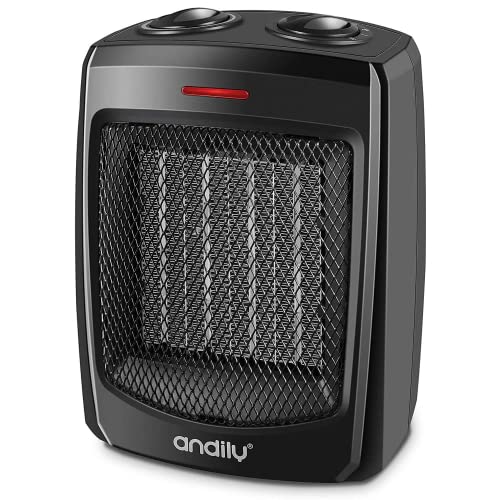
- Budget-friendly and easy to store
- Compact size which can be placed anywhere in the room
- Safety features include a tip-over and overheat protection
- Carrying handle makes it easy to move from one room to another
- Three optional output methods allow users to set the temperature according to user preference
- May make a loud rattling noise
Recent buyers are so happy with this unit, with some calling it a "phenomenal heater." It's a powerful unit that gets the room warmed up pretty quickly. They claim that this heater is a godsend as it makes sure that the room maintains a decent temperature throughout the night. And, it's very economical and is easy to store when not in use.
We love this little heater as it is not only a high-performing unit but is also very budget-friendly. This Andily heater does a great job of warming up the room within seconds. It has a maximum temperature of 72 degrees that's higher than what is offered by most heaters. We also find its small size a plus point, as this makes it convenient for traveling.
This compact electric heater is perfect for RVs and travel trailers, as it doesn't occupy a lot of space. It is also very economical and can fit everyone’s budget. Its control knobs are located at the top, which makes it very easy to use. And, with its three settings, you can increase or decrease the heat according to your comfort.
Small in size but big in performance, the Andily Space Electric heater helps to heat up the surroundings within seconds. Its auto turns off feature shuts off the heater automatically, thus protecting it from overheating. It also has a tip-over switch that turns off this unit in case it is tipped forward or backward, which helps to ensure the safety of users.
Best Travel Trailer Electric Heater for the Money: Lasko CD09250
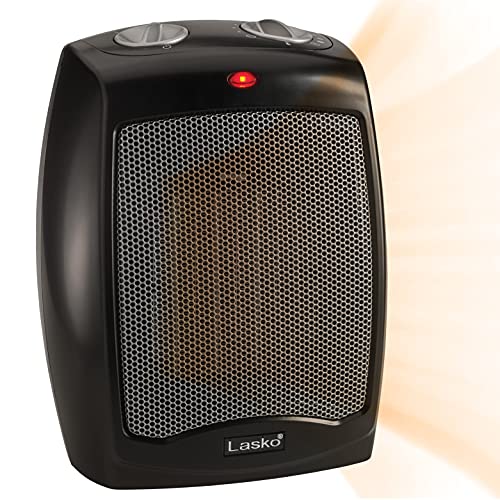
- Overheat protection feature makes it safe for users
- Three different heat settings ensure personalized comfort
- Compact size and convenient carry handle makes it easy to move
- Cool-touch exterior feature keeps the body of the heater cool to touch
- Eleven different temperature settings help you find a comfortable setting easily
- Handle is too shallow to get a good grip
Recent buyers are satisfied with the outstanding job this heater has done in heating their trailers. They have had no issues with it as it produces exceptional heat output. It also provides great value for money, which buyers find particularly impressive. They also like its fan function, which cools personal space very nicely.
Compact in size and economical in price, this Lasko heater is an ideal product for your travel trailer. We find its efficient performance and easy portability very appealing. It comes with 11 different temperature settings and three heat modes, which can be easily adjusted by rotating the knobs provided on the top.
This unit is ideal for people who want a high-quality product without upsetting their budget. Its compact size makes it highly suitable for small rooms, RVs, and offices while its carrying handle also makes it easy to carry it from one part of your travel trailer to another.
If you want a compact electric heater for your travel trailer that will efficiently heat up your living space without putting a too much burden on your budget, the Lasko CD09250 is perfect. Its adjustable heat settings ensure personalized comfort while its compact design allows users to place it anywhere they want.
4. GiveBest Portable Space Heater

- Lightweight model that can be carried around easily
- Tip-over protection makes it safe around pets and kid
- Efficient heater that will heat up the room within seconds
- Equipped with high-speed fan and PTC ceramic heating tech
- Completely safe product designed with flame-retardant material
- May give off a strong plastic smell when used for the first time
Recent buyers find this product to be a well-constructed and solid unit that is perfect for their travel trailers. They are also impressed with the amount of heat that it produces and its safety features that eliminate the risk of fire. It keeps them comfortable all night long, which is why they claim that this heater is a great solution at an incredible price.
This is a compact and lightweight heater that can be ideally placed on the table, kitchen counter, or any other such place. It comes with a built-in handle that ensures easy movement from one part of RV to another. We particularly like its safety features that protect not only this unit but also its surroundings. Also, it warms up extremely fast and provides excellent heat distribution to cover a large area.
As travel trailer owners are pressed for space, this compact and high performing electric heater is one of the best options for them. Its smooth exterior makes it easy to clean, thus helping you save time and energy. It also comes with a tip-over feature that makes it very safe, so even if you have pets or kids running around, you can use this heater without worry.
The GiveBest portable space heater is a versatile and affordable heater that helps to keep you warm in winter. It's designed with various safety features that make it very safe to use around our vulnerable ones. The convenient handle at the top makes it very easy to transport it from one place to another.
5. Brightown Portable Electric Heater

- Constructed from flame-retardant material
- Automatic shut off and tip-over protection feature
- Can heat up a room of 200 square feet within seconds
- Quiet enough to be used in the bedroom while sleeping
- Thermostat control ensures a comfortable temperature of the room
- Some people may find it loud
Recent buyers find the quantity of the circulated air excellent. They particularly like the safety feature where this heater does not turn on when it is placed on the carpet. Buyers also find the output of its fan very strong and advise users to place this heater at least three feet away and enjoy the warm air.
The Brightown portable electric heater is an aesthetically pleasing and powerful heater. With three heat settings, it's particularly designed for offices, bedrooms, kid’s room, dorm, and any other medium-sized living space. Its built-in handle and lightweight design further increase its functionality. And, its automatic overheat protection feature provides additional safety to prevent any accidents from happening.
This electric heater provides an elegant and clutter-free solution for travel trailer owners who want an efficient heater to keep them warm. It is energy efficient therefore it can be used by everybody without worrying about the electricity cost. Although it is small in size, it puts out an ample amount of heat to keep the room comfortably warm.
If you want an environmentally friendly heater to efficiently heat your living space, then the Brightown portable electric heater is for you. It's designed with a number of safety features that protect users from any accidents. And, its multiple temperature settings make it easy to control the temperature according to your liking.

How to Choose The Right Electric Heater for Your Travel Trailer
There are plenty of options in the market, and each one has its own advantages and disadvantages. However, it is vital to keep the following factors in mind as these will help to make the selection process simpler.
It's essential to find an electric heater with a high level of efficiency as it can become quite difficult to find a sufficient source of power while you are on the road. There are some RV parks that don't allow their customers to use electric heaters, while others may charge an extra fee for using these appliances. As a result, you may be stuck on a chilly night without a heater to keep you warm.
Therefore, it is best to find a unit that produces the highest heat output while consuming the least energy. You should check the efficiency of a particular heater before buying by checking its spreadsheet.
Safety Features
It's important to check all the safety features of the unit that you are planning to buy. Look for a model that comes with cool-to-touch exteriors, a tip-over switch, and other safety features that guarantee a safer and better operation.
Another safety feature to look out for is the overheat function. This helps to protect the heater from damage in case it reaches an unsafe temperature.
Some electric heaters work more quietly than others. Therefore, it's best to choose a model that doesn't make uncomfortable or disturbing noises. A simple way to determine whether a heater might make too much noise is by checking if it is designed with a fan.
Heaters that come with built-in fans help to heat up larger spaces, but - you've guessed it - they can be distractingly and uncomfortably noisy. If you are irritated by the continuous sound of the heater running in the background, then it's better to look for a heater that operates silently.

6 Best Ways to Heat RVs & Campers (With Prices)
Some people never use their RVs in cold weather. Others find that heating up their RVs is an absolute necessity.
How do you heat up an RV?
The best ways to heat up an RV are:
- Gas furnaces
- Portable gas heaters
- Built-in electrical heaters
- Portable electrical heaters
- Diesel heaters
Let’s take a closer look and find out when to use each heating source for RVs and campers.
Table of Contents
1) Gas Furnaces

Gas furnaces are the oldest and most popular heaters in the RV industry. You’ll find that many RV manufacturers still use them today.
Go here to read about how furnaces for RVs work .
Here are some of the advantages of built-in gas furnaces.
Advantages of Using Gas Furnaces in Your RV
- Efficient heat source.
- Great for boondocking.
- Provides basement heat.
- Externally vented.
- They are very common among RVers.
Built-in gas furnaces are extremely efficient and they can heat up a rig in a matter of minutes.
This is great for when you pull into a campsite late at night during cold weather. After setting up, you won’t have to wait long before your camper is nice and warm.
Propane is a wonderful source of fuel for people who are using their campers off of the grid because electricity is not required.
Also, if you get a specialized connection, you can use external propane tanks so refueling doesn’t require moving your RV each time. Just take a few tanks to a fill-up station and bring them back to your camper.
These furnaces run off of forced air and ducts are usually routed around the plumbing system of the RV.
This means that you can provide your RV with basement heat for winter camping. With other heating systems, you might be forced to go without plumbing during cold weather as your plumbing system may freeze during use.
Gas heaters are externally vented so you don’t have to worry about moisture buildup. You also don’t have to worry about carbon monoxide building up or deprivation of oxygen.
Since these heaters are so common, it is easy to find parts as well as replacement heaters. The maintenance is also relatively low on gas furnaces and I’ve seen 20-year-old gas heaters work just fine.
While there are many advantages of using gas furnaces, there are also some disadvantages to using them as well. Here are the disadvantages of using built-in gas furnaces.
Disadvantages of Using Gas Furnaces in Your RV
- Inability to zone heat without multiple heaters.
- Fuel burns quickly.
- Fuel is expensive.
- The blower can be noisy .
- The fan runs off of battery power.
Cold weather can cause propane tanks to be emptied quickly. This is inconvenient when going away for multiple days as you’ll either have to bring multiple tanks to your campsite or you’ll have to travel back and forth to a fill-up station on a regular basis.
Propane gas is also an expensive fuel and you’ll have to pay for it even if utilities are included at your campsite. This is something you probably won’t have to worry about when short-term camping with an electric heater.
Because gas furnaces run off of forced air heat, you have to listen to the sound of the fan as well as the sound of the air being pushed through the heat ducts.
Some people find this to be nice soothing white noise while others find it irritating. Depending on your preference, this can be an advantage or a disadvantage to using onboard gas heaters in your camper.
Another drawback is that you’ll need battery power to run your fan.
This means that during cold weather you may need to run your generator just to charge your battery so that it can power the fan in your gas heater. Run out of battery power or gas and your heater will not work.
Lastly, when your RV only has one onboard gas heater, you won’t be able to make use of zone heating. This means that even if you just want to warm up your bathroom a bit before showering, you’ll end up having to heat up your entire camper.
2) Portable Gas Heaters

This heater is our recommendation, you can read more about it in this article .
Check out Amazon here for the best price on this heater!
Although most campers have built-in gas furnaces, some people opt to add their own portable gas heaters. These heaters can be used in place of your existing heaters or they can be used to add supplemental heat.
Here are the advantages of using a portable gas heater in your camper.
Advantages of Using Portable Gas Heaters
- Creates an additional heat source.
- The heater is portable.
- Portable gas heaters are inexpensive.
- No installation required.
- Quiet operation.
- No electricity needed.
Portable gas heaters don’t have to be used by themselves. You can use them to turn an electric system into a gas one or you can use them to provide zone heating when you don’t want to heat up your entire RV.
This heater is portable so you can use it in your RV, your tent, your home, or anywhere else. This is also what makes it great for providing zone heating as you can simply take it into the room you’d like to heat up.
Installation is not required on this type of heater and you won’t need to add any ductwork to your camper to use it. Since you won’t be installing any ductwork or ventilation, you also won’t have to maintain any of this.
The operation of a portable gas heater is silent so if you happen to find the sound of fans blowing irritating, you can avoid this by simply using a portable gas heater instead of your furnace.
Small portable gas heaters won’t use as much propane as large gas furnaces so you won’t have to spend as much money fueling them. This is especially useful when you’re off the grid as you won’t have to bring as many extra tanks with you on your trip.
Lastly, portable gas furnaces do not need any electricity to operate. This makes them a truly off-grid option for RVers looking to get away from it all.
As with anything, there are disadvantages to using the type of heater. Here are the disadvantages of using portable gas heaters in your RV.
Disadvantages of Using Portable Gas Heaters in Your RV
- Not powerful enough to heat up large RVs in cold weather.
- No basement heat.
- Installation needed to hook up to the RVs main propane tank.
- Takes up additional room in the RV.
- Possible safety issues.
- Need ventilation.
Small portable gas heaters may not be powerful enough to heat up a large motorhome or travel trailer. This is especially true when it is extremely cold out.
Also, because there isn’t any ductwork associated with this type of heater, you can’t heat up the basement area around the water tanks and the pipes. This means that even if you can fully heat your RV with a portable gas heater, you may not be able to get it warm enough to safely use your plumbing system.
You won’t have any issues in weather above freezing but anything below and you run the risk of damaging your plumbing.
It is possible to use portable propane tanks with these heaters but if you want to run them off of your RVs gas system, you’ll need to have these heaters installed. This can add to the cost of the heating system and it can take up additional space in your RV. It also makes them less portable as your installation may end up being a permanent one.
Some people have concerns about the safety of portable gas heaters. Remember, these heaters are not vented so you’ll have to worry about not having enough oxygen.
‘You’ll also need to worry about the heat being too concentrated in one area which can cause fires.
Because of all of this, you’ll end up needing to open up a window. This is especially true as this heater puts off moisture which can build up inside the camper and cause condensation. Too much condensation can lead to mold and mildew building up inside of your RV.
Also, as an added protection you may need to install carbon monoxide detectors to your RV. You should probably do this anyway but it is something to keep in mind.
3) Built-in Electric Heaters
Often-times newer RVs will have built-in heat pumps inside of their AC units. This creates a type of forced air heat that runs entirely off of electricity.
Here are the advantages of using these types of heaters.
- Free heat at short-term campsites.
- No ventilation required.
- Less maintenance.
Many short-term campsites offer free electricity at their campsites. As a result, heating up your RV ends up being free. This saves you money you’d otherwise have had to have spent on propane.
Electric heat is a dry heat which cuts down on condensation. This means you won’t have to crack a window in the winter and you won’t have to waste energy doing so. A reduction in energy waste is good for everyone and it’s especially good for you when you’re staying at sites that charge you for it.
Because electric heat does not deprive the air of oxygen, you don’t need to worry about ventilation. Also, depending on how the heater is set up, you may not have to worry about managing any ductwork either. This means less maintenance and as a result more time and more money for you.
The Disadvantages of Using Built-in Electric Heaters
- Will not operate below temperatures of 40 degrees Fahrenheit.
- Need electricity to operate.
- The fan is loud.
One big drawback to this type of electric heater is that it is not very useful in extreme weather conditions. These heaters generally don’t provide heat to the plumbing or the water tanks and even if they did, they’d fail at it in cold weather.
The reason for this is that these heaters are not built to operate in freezing temperatures. In fact, anything below 40 degrees Fahrenheit will render them inoperable.
Another situation that will render them inoperable is a lack of electricity. These heaters are not great for off the grid camping as you’ll need to run a generator to use them. Generators are loud and require extra fuel which may not be available at your campsite.
The fan on an electric heat pump is loud and you’ll definitely notice it. Again, this might not be a big issue for you but it will be for some.
4) Portable Electric Heater

This is one of our recommendations for heating a tiny house and it works very well for smaller RVs as well or as an additional heating source. You can read more about it here .
Portable electric heaters that are used in homes can just as easily be brought into your RV. There are plusses and minuses to using these but they’re definitely worth looking into.
Advantages of Using Portable Electric heaters in Your RV
- Aesthetically pleasing.
- Inexpensive.
- Can be used elsewhere.
Electric space heaters offer up a dry heat that cuts down on condensation and does not require ventilation.
Additionally, no installation is required as all you have to do to operate them is plug them in. This is, of course, you haven’t decided to install a built-in electric fireplace.

This is the Duraflame which is an EXCELLENT electric fireplace. You can see the best price here at Amazon.
Electric fireplaces may or may not have to be installed depending on the model.
These heaters are portable and you can buy them in small 300 watt models or large 1,500-watt models. The smaller the heater, the more portable it will be. This will allow you to zone heat certain areas of your RV.
Electric heaters can be purchased in a wide array of aesthetically pleasing models.
You can buy fake fireplaces or stoves and you can even buy ones that offer up light displays.
An electric heater can often be purchased for less than $25.00. This is an inexpensive solution to those looking to add heat to a heatless RV or to supplement the heat they already have. Also, since it’s electric you may not even have to pay to operate it at some campsites.
These heaters can be purchased without fans which makes them quiet to operate. When you’re done camping, you can take them into your house or garage and use them there.
Disadvantages of Using Portable Electric heaters in Your RV
- Takes up extra space.
- Not good for off-grid camping.
- Cannot supply heat to the basement area.
- Will not heat up a large RV in cold weather.
- 110-volt outlets are needed.
Portable electric heaters can be purchased in smaller models but they’ll still take up space. Also, because they require a 110-volt outlet and a steady supply of electricity, they aren’t great for off-grid camping.
These heaters aren’t hooked up to a duct system so they can’t heat up the basement without major modifications to your RV. They also aren’t powerful enough to heat up large RVs in weather that is below freezing. Of course, you can bring more than one heater into your camper but you may need a 50-amp RV to do so.
5) Diesel Heaters
Diesel heaters are mostly found on motorhomes that operate off of diesel fuel. They are known as hydronic heaters and they use heated water to help heat your motorhome.
Advantages of Hydronic Heaters
- Eliminates the need for a hot water heater in cold weather.
- Has a large supply of fuel.
- Can often be run off of electricity only.
- Can heat the basement.
As we said earlier, hydronic heaters heat up water like a radiator. This means that your motorhome ends up having much more hot water available to it at any given time.
Because this heater operates off of diesel, you’ll have a lot of fuel available to you to run it. A typical class A motorhome has a fuel tank that holds well over 100 gallons of fuel. All of this fuel can be used to operate your diesel heater.
In addition to being able to run this type of heater off of diesel fuel, you may also be able to run it off of electricity. This means you’ll still be able to take advantage of free or inexpensive electricity at campsites.
These heaters are also meant to heat the basement and they can run at below-freezing temperatures so you’ll always be able to go winter camping in a motorhome with a hydronic heater.
Disadvantages of Hydronic Heaters
- High maintenance.
- Hard to find.
Hydronic heaters have more moving parts to them and they are more expensive to make. The maintenance on these units is also more difficult so you may end up having to pay extra money for this as well.
Also, as we said earlier, you’ll typically only find these systems on motorhomes. If you’d like to get a travel trailer with a hydronic heater, you may be out of luck.
6) Heat Pumps With Air Condition

You can also install a heat pump. They have been more and more popular in RVs, cabins, tiny houses etc.
The reason is that they are relatively cheap to buy and they are very efficient. They run off of electricity so that’s something to keep in mind. If you always hook up your rig or maybe you have solar panels installed, this is a great option!
You can read much more about heat pumps in this article about heating in tiny houses .
How Well Are RVs Insulated?
We have written an extensive article on how well RVs and campers are insulated .
Here are some of the main points from the article.
Typically, RVs and campers are insulated pretty well. Especially if it’s a newer camper. Older campers and RVs are harder to heat up because they are poorly insulated. These are the typical materials used for insulation:
- Spray Foam Insulation
- Foam Board Insulation
- Fiberglass Insulation
You will find that most RVs and campers are built with the same type of insulation materials as ordinary houses. This is because it’s cheap to buy and easy to get.
However, there are also better and more efficient materials. These are typically materials developed for spacecrafts and airplanes. You will have to install this type of insulation yourself.
There are many ways to heat up an RV in cold weather. In extreme weather conditions, you’ll probably want an onboard system that runs off of gas, electricity, or diesel. For off-grid situations, you’ll probably want to use a gas heater or a diesel heater.
Electric heaters are still an option off the grid but you’ll have to use a generator to make them work.
When buying a heater for your RV, make sure you know why what kinds of camping you’ll be doing so that you can buy the one that’s best for your situation.
Click to share...

The Top 6 Electric Travel Trailer Heaters for the Winter

Traveling across the country by car or settling into a long-term campsite are both excellent ways to spend the winter months. But as the snow begins to fall and the bitter temperature sets in, you’ll need a shelter that will keep you warm.
Most travel trailers have particular cold-weather insulation, but not all of them have high-quality heating systems or fireplaces. If this is the case, you are far more likely to have a chilly visit!
Fortunately, there are many excellent electric space warmers on the market to assist you. These are small units that can be used to heat a variety of confined spaces. Many of them also have adjustable thermostats to assist you to keep your trailer at an appropriate temperature.
There are several types of electric heaters available, each with its own price, size, and particular features. The following list is ordered by price, beginning with the cheapest choice. However, each of these is a high-quality unit, and I’m delighted to present my top six favorites!
Table of Contents
1. Andily Space Heater with Thermostat
- Price : $25
- Rating : 4/5
- Watts/BTU : 750- 1500
- Item Weight : 2.9 lbs.
- Size Dimensions: 6.2 x 4.7 x 8.3 inches

Special Features:
This small space heater has three operating settings. It has a 1500-watt high heat mode, a 750-watt low heat mode, and a fan mode that serves as a cooling system.
The 1500 watt option is ideal for quickly heating up an area! This option is your greatest friend if someone leaves the door to your trailer open and a touch of the winter chill slips in.
The 750-watt setting consumes less power and is ideal for keeping a consistent room temperature. The fan mode is useful in hot weather or when you’ve left your 1500 watt heater on for too long!
The tip-over protection mechanism is also included into the Andily space heater. If your heater falls over, this feature automatically switches it off. This is really useful since it keeps your flooring from being scorched and your heater from wearing out if it tips over.
It also contains an automated shut-off button in case any of the unit’s components overheat. This keeps it from shattering or igniting fires.
Finally, the Andily space heater is compact, lightweight, and portable. It has a handle on the rear and is simple to pick up and transport from one location to another. This is useful for folks who wish to take the heat everywhere they go in their trailer.
Visit this link for more information about this space heater, as well as access to online purchase choices.
2. Lasko CD09250 Space Heater with Adjustable Thermostat
- Price: $31.99
- Rating: 4/5
- Watts/BTU: 1500
- Item Weight: 3 lbs.
- Size Dimensions: 5.7 x 7 x 9 inches
The Lasko space heater provides its users with a plethora of options. High heat, low heat, and cooling fan are the three primary heat settings. Each operational mode operates smoothly and quietly.
This unit’s thermostat has 11 temperature settings to choose from, so even the most discriminating user is sure to discover one that’s just right for them.
This heater also features a safety feature that turns it off automatically if it is turned over. It also boasts an overheating safety system and a cool-touch exterior. This makes it safe to touch even when the heater is on full power.
This feature comes in handy if you have small children or animals nearby. You don’t want any unintentional burns on your watch!
This space heater is also very easy to use and transport from one location to another. It comes completely built and with a handle for convenient transportation. Its settings are also simple to change thanks to the small dials placed into the heater’s top.
Electric heater feature illustration.
Electric heaters by Lasko
The Lasko space heater has a strong 4 out of 5 star rating and is ideal for rapid and convenient heating. Keep this in mind as the winter months approach!
3. Comfort Zone Oscillating Space Heater
- Price: $64.99
- Rating: 4.4/5
- Watts/BTU: 800- 1500
- Item Weight: 9.5 lbs.
- Size Dimensions: 31.2 x 20.1 x 11 inches
The Comfort Zone space heater boasts a plethora of useful features that make it ideal for travel trailers. This one delivers quick and easy heating while also saving you money and energy. This unit has an ECO mode that is designed to reduce the amount of electricity required to run.
This heater also has the ability to rotate and swivel in place. This allows it to heat a space rapidly and evenly without the need for the owners to move it around manually. This function makes it simple to maintain consistent temperatures. It is also quite quiet when running, which is ideal for folks who wish to rest in peace and quiet.
This space heater, like all good space heaters, has safety measures that turn it off when it tips over or begins to overheat beyond acceptable limits. These cut offs are aided by a variety of heat and motion sensors.
Furthermore, this heater has an automatic 8-hour timer. This is useful if you forget to turn it off before going to bed. This function prevents it from running all night and consuming your electricity. You may also program when it goes on and off, allowing your trailer to maintain a steady, pleasant temperature.
This unit offers numerous advantages. Last but not least, it is a little and portable device. This is simple to transport between a house and a trailer. There will be no hard lifting!
Customers are pleased with the heating provided by the Comfort Zone space heater, which has a rating of 4.4 out of 5 stars. This is an excellent all-around product that would be a wonderful choice for owners of frigid travel trailers!
4. Dr Infrared Portable Space Heater
- Price: $108
- Rating: 4.1/5
- Watts:/BTU 1500
- Item Weight: 19 lbs.
- Size Dimensions: 13 x 11 x 16 inches
The Dr. Infrared portable space heater is a high-quality equipment that is ideal for swiftly and efficiently heating big areas. This heater can effortlessly manage the temperature of a 1,000 square foot space! It offers heat settings for high and low heat, as well as an energy-saving mode.
It can be difficult to wake up from those winter sleeps, and you certainly don’t want to get up to adjust or turn off the heating! That is not a problem with this heater. Convenience and user-friendliness are key to the design of this device. It comes with a remote control that allows you to change the settings from anywhere in the room.
This heater’s thermostat can be set between 50 and 86 degrees. It has the ability to heat a huge room to any temperature within this range. Furthermore, the blower on this model is designed to be silent. You’ll hardly notice that this heater is on while it’s working!
This device is sturdy and difficult to overturn by accident. It features a sturdy foundation and a sturdy construction. However, if it does topple over, the safety measures come into play! If it is knocked off balance, it will immediately shut off. This is fantastic because the only thing worse than a cold travel trailer is a burning one!
It also has a 12-hour timer that can be set at any time of day. You may program it to wake up to a warm trailer and fall asleep to a chilly one. It can also be switched on and off manually, however the scheduling feature is useful for individuals who wish to establish a routine.
This heater is also very stylish and will fit right in with the inside décor of your fifth wheel. It has a huge flat top and an exterior case that looks like polished wood. If you want to multitask and make the most of your available space, this space heater might also double as a small end table or footrest.
Just be careful not to rely too heavily on it. You don’t want to ruin your closest friend’s winter!
This product has all of these fantastic features and benefits. There are no upgrades or additional purchases required! To heat up, all this device needs is a conventional 3-prong plug and a cold trailer.
Unlike some other items, this heater does not include a built-in handle. However, it is still relatively lightweight and easy to carry from one location to another.
5. Duraflame 9HM8101-O142 Portable Infrared Quartz Heater
- Price: $169
- Rating: 4.3/5
- Watts/BTU : 5,200
- Item Weight: 26.4 lbs.
- Size Dimensions: 12.8 x 16.8 x 15.3 inches
In the winter, the Duraflame portable infrared heater is a stylish and efficient space heater for any travel trailer. It has a polished oak exterior with a smooth hardwood surface. It’s sturdy and steady, and it’ll look great in your living room.
This space heater can easily heat an area of up to 1,000 square feet. It also uses infrared to accomplish this, which aids in the preservation of the natural moisture in the air. Winter is already dry enough, so the non-drying heat delivered by this device is a huge plus!
This product’s design likewise prioritizes safety. It features built-in safety shutoffs that prevent it from overheating. This heater’s exterior is likewise designed to be cool enough to touch. This feature of the product’s design makes it ideal for tourists who have dogs or small children. Nobody will get burned if they come into contact with this unit!
This heater’s temperature can also be adjusted using the thermostat. Users can select the heat level that is most comfortable for them. It has a heating element made of quartz, which keeps heat for longer periods of time. This heater quickly warms the space and consistently keeps it warm.
In the living area, a fancy freestanding space heater is set up.
The Duraflame space heater is a little heavier than other types, but it’s still light enough that it can be moved without much effort. It will also look natural and blend in with the interior of most travel trailers!
6. AirNmore Comfort Deluxe Infrared Space Heater
- Price: $277.00
- Watts: 1000- 1500
- Item Weight: 25.9 lbs.
- Size Dimensions: 16.5 x 13 x 16.8 inches
The future heater is the AirNmore Comfort Deluxe space heater! It has a sophisticated metal enclosure that is industrial grade in terms of strength and longevity. It also includes a sophisticated timer system, customizable settings, and backup power.
If the power goes out in your vehicle or your electricity goes out, this heater will remember the settings you’ve set for it. There is no complicated resetting procedure.
This heater is also designed to enhance heat production while limiting the risk of burns and fire. This unit’s outside is made of metal, however it is always safe to touch. This makes it suitable for both children and pets. It also has overheating and tip-over protection features.
It also does not require heating bulbs, which must be replaced in other variants. The AirNmore is covered by a 2-year warranty and is built to last much longer!
This method is also effective for heating both small and large rooms. It works quickly and features an effective blower system.
You might also want to read these RV Camping Tips and Guides:
- 9 Campground-Friendly Motorhomes
- 7 Superb Camper Trailers with King Beds
- Picture Hanging Options for RV Walls
- 5 Camping Teardrop Trailers with Bathrooms
- 7 No-Slide-Out Travel Trailer Models
Top RV Air Conditioners in 2023

An RV is all about seeing the country in comfort. This necessitates the use of a good air conditioner to keep the interior cool and comfortable on warm, warm, and…
How to Determine the Best Used RV Price

How to Determine the Best Used RV Price It’s that time of year again, and the weather forecast looks promising for camping and RV activities. Looking for a new RV…
How to Purchase an RV

Before you pull the trigger on one of the larger purchases of your life, consider some of these finer points on how to efficiently purchase an RV. Let’s take a…
All You Need To Know About RV TVs

Because there are so many factors to think about, shopping for an RV TV might be overwhelming. You must first decide on the kind of television technology you want, the…
The Top 5 12 Volt TVs for Your Campervan or RV

What Should a 12V TV for Campervan or RV Contain? (6 Items) You are aware that your campervan or RV needs a TV, but what should you seek for? I’ve…
FAQ: Can RV Air Conditioning Run Continuously?

Can I operate my RV’s air conditioner continuously? Without creating a problem, you can leave the air conditioner on continually in your RV. Set your thermostat a little lower if…
How do you choose an RV air conditioner?

Regardless of the kind of RV air conditioner you pick, make sure to do your homework and read reviews from other RVers before making a purchase. No matter where the…
6 Tips for Making Your RV Air Conditioner Quieter

One of the reasons you travel on vacation to the vast outdoors is to escape the city sounds. Nature is tranquil and calm, and you appreciate the times when there…
Best of Micro Camper Necessities 2023

Best of Micro Camper Necessities 2023 Are you going on your first Micro Camper vacation? Let’s speak about getting ready for an early season adventure in your Micro Camper. It’s…
The Top 5 RV Air Conditioners Units for 2023 (15,000 BTU Rooftop)

In the summer, Vs can become extremely hot. An RV is essentially a metal cage with no inside. The metal box will quickly become warm when left in the sun,…
The Winnebago Micro Minnie: Seven Things You Should Know

One of the most well-known lightweight campers on the road today is the Winnebago Micro Minnie. Thanks to its high-quality building, market-leading features, and a variety of well-designed floorplans. But…
How Long Can You Keep an RV Air Conditioner Running?

A Complete Guide on How Long an RV Air Conditioner Can Run The best time of year to travel in an RV is during the summer. However, you must make…
Quietest RV Air Conditioners Tested

The tremendously loud noise that camper AC units make is one of the most common complaints. After a few sleepless nights, you’ll start looking for the quietest RV air conditioners…
Best RV Heater
Receive conventional heating without exhausting too much energy with the Mr. Heater MH18B Portable Big Buddy Propane Heater . It keeps your RV warm enough and performs in a 100% safe and efficient demeanor. This best RV heater is the most popular portable propane heater in America, used because of its tough and patented radiant 4,000 to 18,000 BTU per hour. It runs on propane gas that’s safer and more efficient than expected. Even though this best RV heater is slightly bit complicated to use as it comes with certain established precautions, we found it to be the best-performing one on the market. If you want to enjoy a well-constructed and flexible RV heater, especially for winters, buy the Mr. Heater MH18B Portable Big Buddy Propane Heater. The overall construction of the heater protects it from overheating, combustion, and exhausts very less energy to perform powerfully that lasts forever. Lastly, this is the only propane RV heater that most consumers recommend for using indoors as it is extremely safe and effective.
RV heaters are a great way to warm up your RV with a little extra help that most buyers are happy to buy for small or big RVs. They provide consistent heat in a controlled environment and are backed with energy-efficient and durable components to last forever. The Mr. Heater MH18B Portable Big Buddy Propane Heater comes with a heavy-duty safety wire guard for durability and easy carrying handles with a built-in blower fan for better air circulation, to avoid overheating during rugged heating performance. This built-in blower fan is responsible for evenly circulating higher heating efficiency, something that combines radiant heat with inexhaustible energy consumption to always keep operating, no matter what. Not only does this best RV heater feature a multi-position heat setting control, but it also comes with dual ceramic burner tiles with shock absorbing insulation to keep the heat setting control running smoothly. As you can clearly see, the Mr. Heater MH18B Portable Big Buddy Propane Heater is expertly designed to remain effective and powerful for as long as it performs, providing comfortable heating settings and durable protection for extended life, something that most people look for.
If you want something more extravagant than our best pick, we suggest the Camco 57351 Olympian Wave-8 Gas Catalytic Heater . It proceeds to provide sufficient heat as a primary or secondary heating source that can quickly heat up spaces up to 290 square feet. Best for RVs, this best RV heater utilizes safe and super efficient HD-5 propane gas, without producing harmful quantities of carbon monoxides. The use of propane gas also helps save battery, which means extended life for the RVs benefit. The Camco 57351 Olympian Wave-8 Gas Catalytic Heater comes with 4,200 to 8,000 BTU per hour and catalytic heating that’s 99.98% efficient than flame type heaters. It is expensive because it’s so powerful and durable to last forever. The built-in Automatic Piezo electric sparkers run in operation for 20,000 starts effortlessly. And the 11-inch WC manifold pressure operates using clean, safe, and efficient gas. In the hope that you see this best RV heater as we do, this extravagant pick is, after all, a responsible product that delivers warm heating temperatures without overheating or causing combustion.
If you want the least expensive pick on the list, we suggest the Lasko 754200 Ceramic Heater . Affordable as it is, this is the best RV heater for people looking to buy into something that’s significantly lower in price, but equally powerful and efficient for the long run. For the same amount of energy consumption and time, the Lasko 754200 Ceramic Heater is more than what most people would expect from an inexpensive and conventional ceramic heater for RVs. Lasko operates on a 1500-watt high heat setting and 900-watt low heating setting. It is compact, portable and lightweight, that also comes with a personalized adjustable thermostat for supplemental control. The durable components that make up the Lasko 754200 Ceramic Heater are carefully designed to eliminate overheating and combustion, plus you get silent operations that don’t crank up anytime, regardless of how it lasts. While the competition for the best RV heater is stiff, we chose this heater for the convenience and comfort of our readers.
Table of Contents
What type of best rv heater should you buy, our best pick: mr. heater mh18b portable big buddy propane heater, our upgraded pick: camco 57351 olympian wave-8 gas catalytic heater, our affordable pick: lasko 754200 ceramic heater, best pick for the money, best energy-efficient rv heater, best compact rv heater, best portable radiant rv heater, best self-regulating rv heater.
- Best oil-filled RC heater
- Best advanced monitor
Wrapping it up
When buying a durable RV heater, it’s important to consider all factors, one of them being the size of the space you’re planning to heat. Generally, most RV heaters are standard space heaters with require suitable ventilation to avoid overheating, while some feature a few ventilation gaps ideal for tight spaces. There isn’t a single RV heater, from those we recommend that are prone to catching fire or filling the RV with harmful carbon monoxide due to consistent use. We have featured a compelling list of different types of RV heaters starting from environmental-friendly and portable to self-regulating and oil-filled. We have covered all the essential types so that our readers grasp how a RV heater works and what are its significant features . For your better understanding, the way a RV heater functions in a space depends largely upon the type of heater it is. That way, you know what you’re buying and whether it’s worth the investment for long-term use.
Convection heaters are the most common types of RV heaters that work by heating the circulating warm heat in the air surrounding the room first. These mainly use fans for circulation and quickly heat up the room to an ideal temperature. Convection heaters fall under the types of electric coil heaters and ceramic heater.
Radiant heaters feature a unique approach to heating as they heat up a room by hitting objects, people, and the floor first. This way, they slowly, but efficiently warm up the RV in a way that the warmth lasts longer and feels more natural than most. Radiant heaters fall under the types of oil-filled heaters and propane heaters.
Best oil-filled RV heater
Best oscillating rv heater.
Based on what you want, RV heaters are heating systems that are essentially used during cold weathers . They come with energy-efficient features that perform consistently in any RV without causing minor inconveniences such as overheating, combustion, and accidental burns or fires. It can be a challenging task to find the best RV heater, especially when you’re bombarded with so many different types and features that determine the ideal one. We research everything we’ve got to recommend products that are dependable and reasonable to buy. RV heaters have been a sufficient commodity for season-specific ventures, but based on their consumer feedback, we found that RV heaters vary in price as soon as the cold weather kicks in. This change brings about fluctuations in price, but essentially, the overall reputation and deliverance of the product stays the same. To make sure you get the most out of our recommendations, we again feature the best RV heater for most people, the Mr. Heater Portable Big Buddy Propane Heater . It is a professionally-backed radiant heater that warms up RV efficiently and faster than most. To set this best RV heater up is simple and to maintain is a breeze. We suggest you consider this pick first before looking at our following picks that spread out based on their type. We have highlighted the most compelling feature for each of our recommendations because that will help you decide which one ranks the best for what purpose. All our products are durable and strong contenders to offer top performance and extended lifespan, so you can take your pick based on what’s best for your RV.

Jill Miller is the founder of Your RV Lifestyle. Trading corporate America for the open road, Jill, along with her partner Jose, began their RV journey, making an unconventional start by wintering in New Jersey. A natural adventurer, she was motivated by a desire to explore the USA and beyond, embracing the varied landscapes, communities, and cultures across the country.
For Jill, the allure of RV living was not about material accumulation, but rather the pursuit of an adventurous, fulfilling lifestyle. A lover of golf, bicycling, hiking, and line dancing, she has carried her passions across the country, engaging with them in diverse settings. Jill’s commitment to the RV lifestyle came after years of careful research, numerous consultations with RV owners, and personal trials, including living in a rental RV.
Propex North America
Travel trailer heaters & furnaces.
Our goal is to make touring more comfortable and enjoyable, whatever the weather. By installing a Propex propane fired furnace , water heater or complete heating system to your towable RV, you can extend your recreational time.
RV Travel Trailer Heaters & Furnaces

HS2000 Furnace
With 6483 BTU of space heating, the HS2000 is our most popular furnaces.

HS2800 Furnace
For the larger RV travel trailer, choose the HS2800 and enjoy 9500 BTU of heat.

HS2211 Furnace
This furnace will save valuable space in your trailer as it can be fitted externally under the floor.

Malaga Water Heater
The Malaga is a tried and tested water storage heater. 3.5 gallons of hot water for your trailer.
Why choose a Propex heating system?
Find your local propex dealer.
Our United States and Canadian dealers are friendly and knowledgeable. Their expertise will help you find and install the right heating system for your travel trailer.
Heating Applications

The official website for Propex Heatsource products in the USA and Canada. Learn more
Heating Solutions
Where to buy.

- 12 Volt Heater

12 volt heaters for campers: All You Need To Know
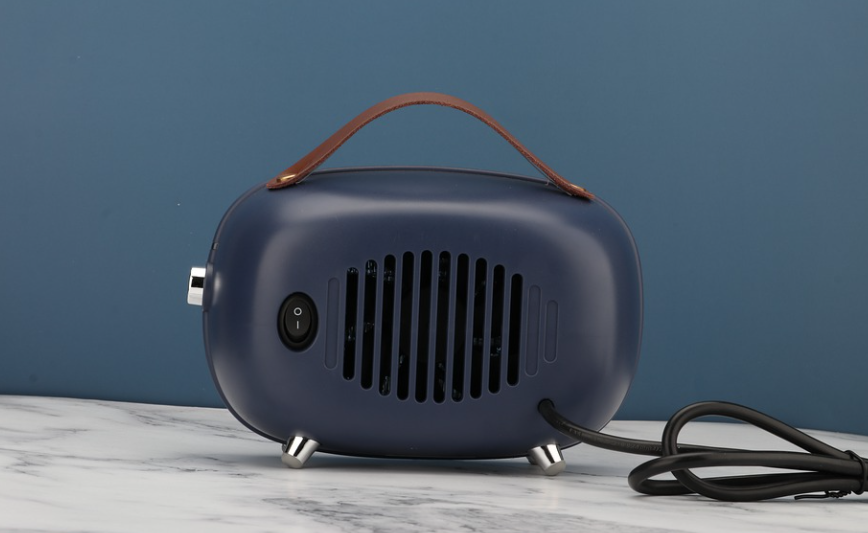
This is the ultimate guide to 12 volt heaters for RVs, cabins, campers, and small spaces. I’ve tried to cover all of the bases so that you don’t have to waste time going from site to site trying to figure out which one is best for your needs.
If you are an avid camper and like to enjoy the great outdoors, you may be wondering if using a 12 volt heater for your camping equipment is the right choice for you.
If i had to buy a 12 volt heater right now, i would purchase the EF ECOFLOW Wave 2 . I will admit that it is a bit pricey, but who can argue with a portable 2 in 1 AC and Heater.
What is a 12 volt heater?
A 12-volt heater is an excellent camping accessory that can help make your campervan or RV trip more comfortable. These heaters are powered by DC current from a battery and can provide your vehicle with the warmth you need in cold weather. 12-volt heaters for campers can often be used in combination with other heating sources such as propane and other heating fuels.
These heaters use less power than other types of heaters, which makes them ideal for people who are camping in their cars or RVs.
Why would you need a 12 Volt Heater For Your Camper?
12 volt heaters are ideal for use in motorhomes, caravans, vans, trucks and other types of recreational vehicles. They can also be used for boats and many other applications where there is no mains power available. Such heaters are ideal for providing additional heating if you do not have access to a mains electric supply at all times during your trip.
One of the most common reasons people use 12 volt heaters is because they love camping in places that don't have electricity . In many cases, campgrounds will limit electrical use by installing meters or using generators and charging campsites by their consumption of electricity.
EF ECOFLOW Wave 2 Portable Air Conditioner, Air Conditioning Unit with Heat
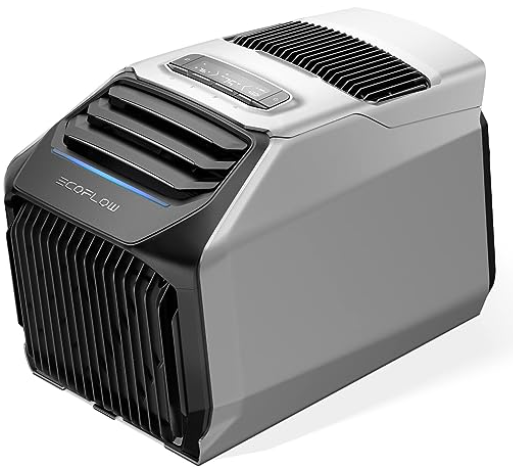
The EcoFlow Wave 2 is a 2-in-1 portable air conditioner and heater that can cool or heat a room up to 500 square feet. It features EcoFlow's tailor-made compressor, which can drop the temperature by 18℉ (10℃) in 5 minutes in cooling mode and raise the temperature by 18℉ (10℃) in 5 minutes in heating mode. The Wave 2 also has four ways to charge, including AC, solar, car, and power stations.
It has a swappable battery that allows for cool or warm air anytime, anywhere, with the flexibility of multiple charging options. The Wave 2 is also quiet in operation, with a noise level of 44 dB in Sleep Mode.
- Powerful cooling and heating
- Four ways to charge
- Quiet operation
- Long-lasting comfort
- Portable and easy to use
- Can be expensive
- Not as powerful as some other portable air conditioners
Overall: The EcoFlow Wave 2 is a great option for those who are looking for a powerful, portable, and versatile air conditioner or heater. It is perfect for use in tents, RVs, or homes. However, it is important to note that it can be expensive.
Comparison To other Products on the market:
The VEVOR Diesel Air Heater All In one
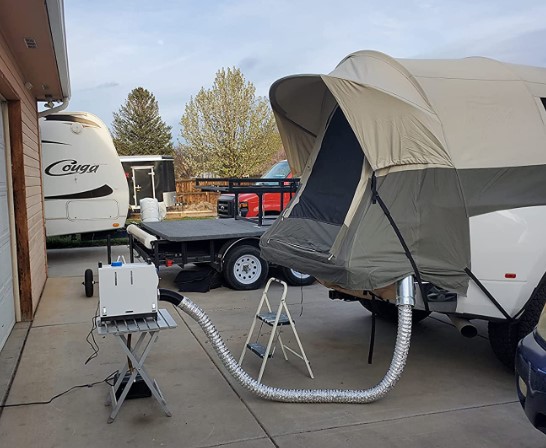
This diesel air heater is a high-performance product that can heat up any small space in only a matter of minutes. It is suitable for indoor use, such as vans, trucks, campers, small shops and boats. It has special features such as low noise, long life and easy installation . The diesel air heater has a design that is simple and easy to use. It comes with an automatic safety valve, which prevents accidents in case of overpressure or overheating.
12-volt heating elements are designed specifically to operate at lower temperatures than 110-volt units, and therefore allow for greater efficiency. Because they run off of less power, 12-volt heaters use less fuel and generate less noise.
Thank you for visiting
Hey, i noticed that you are enjoying this article so far.
Would you like to read another article on 12 Volt Air conditions?
- Easy to install - The heater comes ready-to-go with a plug attached, you don't have to worry about the voltage fluctuations common with higher-amperage heaters. Just be sure to remember to vent the exhaust to the outside.
- Rapid heating - The rapid heating feature of these heaters allows you to start heating immediately after turning the switch on.
- Low emissions - These awesome inventions have low-emission technology that limits pollutants while providing superior performance. If you're looking for a clean, quiet way to warm your home, look no further!
- Rugged design - These heaters are designed to withstand the rigors of everyday use, including extreme temperatures, heavy snow loads and high winds.
Pick up your Diesel Night Heater today on amazon.
The Wayska Diesel Heater 12V
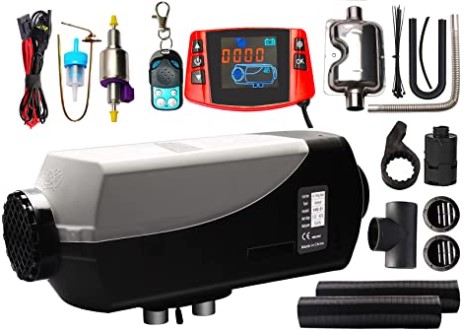
For long-term camping, this diesel heater is one of the best choice. With its stable and reliable operation, it can be used in areas above 5500 altitude. It has a muffler to reduce noise, blower speed control to cut down on noise and power consumption.
- Easy installation - This heater is easy to install and can be complerted within a couple minutes.
- Rapid heating - You can be sure to get heat in only a matter of minutes to enjoy your camper, rv, or car.
- Low emissions - Emmisions for this heater are very low which means it is very good for the environment. Just remember to vent.
- Rugged design - The design of this camper heater was made with the outdoors in mind. You can be sure that this heater will hold up in tough weather conditions.
Pick up your Wayska Diesel Heater 12V today on amazon.
maXpeedingrods 12V 8KW Air Diesel Heater
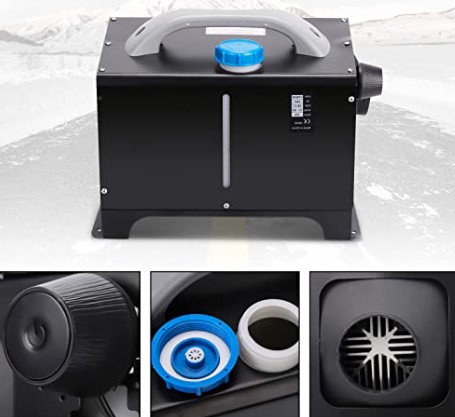
This 8KW diesel heater is widely used to heat the cabs of cars, RVs, caravans, trucks, ships, motorhomes, campervans and it can be applied to other trucks. With the remote control and switch function, it can be easily controlled by you.
The mXpeedingrods diesel heater is a portable and affordable unit that features advanced technology designed to deliver maximum heating output with minimal noise. Save energy and money on this efficient, reliable diesel heat pump.
- Easy installation - The heater comes ready-to-go with a plug attached, you don't have to worry about the voltage fluctuations common with higher-amperage heaters. Just be sure to remember to vent the exhaust to the outside.
- Flexible - These heaters can be custom installed, making them ideal for remodeling projects where conventional options aren’t feasible. Or, if you’re tired of running fans and blowers, a diesel heater could save you money.
- Low operating cost - A diesel heater offers low operating costs. When compared to other heating options, a diesel heater is among the most cost effective. Fuel prices fluctuate annually. So, when you compare how much you pay per month versus what you spend on utilities, a diesel heater becomes a no brainer.
- Fast Startup - Unlike forced air heating systems, a diesel heater starts instantly. You don’ t have to wait hours for a furnace to heat up before you can enjoy the warmth.
Pick up your maXpeedingrods 12V 8KW Air Diesel Heater today on amazon.
Diesel heaters operate by burning fuel oil (diesel) at high temperatures. The combustion chamber is built into the heater unit, eliminating the need for external equipment. These units provide rapid heating and fast warm-up times. A simple start button initiates heating.
Types of heaters for campers
There are two main types of 12 volt heaters for campers. They are the fan-forced type and the ceramic type. The fan forced type is similar to a regular heater in that it has a heating coil, but this heater also has a fan to help circulate the warm air around the interior of your tent.
The second type of 12 volt heaters are made from ceramic materials and they use electricity to heat up their internal ceramic plates. This type of heater works by directing warm air into your tent through a series of vents.
Both of these types of 12 volt heaters are silent and will produce no fumes. If you leave them on all night, your tent won't stink up like it would if you were using an open flame or propane heater.
How much power does it use?
A 12 volt heater will usually use around 8 to 14 amps per hour. Most models have a thermostat built into them so that they only turn on when it's cold enough outside for them to work properly. This means your battery won't get drained by running these heaters all night long.
Advantages of a 12 volt heater
In the past, RVers had to bundle up in warm clothes and blankets instead of enjoying the true freedom of camping. It was tough to stay warm when temperatures dropped outside, especially during the night.
- Keeps you warm
The most obvious benefit of 12-volt heaters for campers is that they keep you warm when it's cold outside. Even if you are used to camping in colder weather and are prepared to cope with it, being warm is always welcome on a camping trip. With a 12-volt heater, there's no reason to suffer through being cold all day long.
- Easy Installation
Camping is supposed to be fun, not stressful. So why deal with the hassle of trying to install multiple propane bottles and hook them up to a propane heater? With a 12-volt heater, all that you have to do is plug it into your cigarette lighter or power outlet and turn it on; there's no need for any extra equipment or installation!
- Ideal for small RVs
Many campers like to stay in smaller, less expensive RVs during the summer season. Unfortunately, these smaller models often don't come with reliable heating systems, which makes them difficult to enjoy during the colder months of the year. Fortunately, 12 volt heaters are easy to install in virtually any RV and require very little room. Simply purchase one from an automotive parts store or home improvement store and have it installed before your next winter camping trip .
- Can be used in any season
The 12-volt heaters for campers are designed so that they can be used in any season as well as every climate condition. They are made from high quality materials and are able to withstand extreme cold temperatures as well as extreme heat temperatures. This makes them ideal for a family of four or more who love outdoor activities.
- More peace of mind
Modern 12 volt heaters are very compact and easy to install, which makes them a perfect addition if you're looking for a way to stay warm while camping. Setting up a smaller heater means less space taken up in your RV, which can make all the difference when it comes to comfort.
A smaller heater can also mean more peace of mind for your family and friends. A small heater will take up less space than larger ones and won't cause any safety concerns for those who are staying with you during the winter months.
- Economical and efficient
When looking at the cost of these heaters, you must take into account how efficient they are. The savings on energy costs alone will pay for the unit in just one winter season! Even though some models are more expensive than others, they all have a very low operating cost which makes them every penny!
- Compact size
Because of their size, these heaters can be placed anywhere in your RV without taking up too much space. This can also mean that they're more energy efficient, as they don't need to use as much energy to warm up the air around them. This means that you'll save money on electricity costs.
- Extremely safe
There are so many different types of heaters on the market today. It can be a daunting task finding the right heater for your camper. The best way to go about it is to know what features you need and start searching for them. A 12 volt Camper heater is a great choice for many people because they are lightweight, portable, and easy to install. It works by converting the car’s battery into heat energy, which is then circulated throughout the vehicle.
The best thing about using a 12 Volt Camper Heater is that you don’t have to worry about fuel consumption or emissions from your car. Many people are concerned about their emissions these days and want to reduce their carbon footprint as much as possible. With a standard water heater, you may have to burn oil or coal in order to generate enough heat energy to warm up your home or cabin. With a 12 Volt Car Heater, you don’t have to worry about this at all because it doesn’t use any fuel at all! It also means that you don’t have to use electricity in order to generate hot water either.
- Lightweight design
Many of these heaters are small and lightweight so that you can easily carry them around with you when you go on a hike or other excursion away from your camper.
- Long-lasting
Most of the time, when you purchase an item for your RV, you want to be sure that it will last for a long time. This is especially true for any items that are electrical or fuel powered. The 12 volt heater is definitely something that will last because it doesn't use much energy and it has no moving parts that can break with normal use. Even if your heater was to break, it would be covered under warranty by the manufacturer.
If you want to read another article on heaters, you can read " Best heater for campers ".
Stay updated with our newsletter
Disadvantages Of A 12 Volt Heater
The first disadvantage is that it's not as powerful as a regular heater. It's only going to produce a small amount of heat and it may not be enough to keep you warm. When you're looking at a 12-volt heater for campers, make sure that it has enough power to keep you warm. Some of them only have two watts of power, which isn't nearly enough to keep you warm.
Another disadvantage of 12 volt heaters is that they're more expensive than other types of heaters. This means that if you're trying to save money on heating costs, then this isn't the best choice for you. The downside is that if you don't use it correctly, then it could cost you a lot more money than it should.
It's also important to know how long it will take for the heater to start working properly. Many people think that these heaters are like regular ones and only take about twenty minutes to warm up.
Problem with camping in winter
One of the major problems people have with camping in winter is keeping themselves and their gear warm. Even if you're doing it in an RV that has a full-size heater, it can still be challenging to keep yourself comfortable.
These heaters run on 12 volt power and are designed to be as simple as possible. The beauty of these heaters is that they can be used in any season. In summer, you can use them to ventilate your camper; in winter, you can turn them into an instant heater.
One solution is to use 12 volt heaters for campers. These are small and portable, so you can place them where they are needed, and they can be used in any season. This makes them an excellent investment for anyone who camps regularly throughout the year.
The 12 Volt Heater for Campers makes it easy to stay warm on those chilly nights while you're camping. This heater has an extremely lightweight design, making it easy to pack along with your other camping gear. You can hook it up to your car or truck battery, or use an AC adapter at home if you want to use it during the winter months as well.
About Author:

Hi, I'm Kevin Pommells, a lover of camping and the great outdoors as everyone says nowadays. I'm also a passionate soccer fan and the proud owner of CamperRules.com, a website dedicated to helping campers and outdoor enthusiasts make the most of their adventures. With years of experience exploring the wilderness and a deep love for the sport of soccer, I'm always looking for new ways to combine my two passions and share my knowledge with others. Follow me for tips, tricks, and insights on all things camping and outdoor recreation.
Follow Me @ Twitter | Facebook | KevinPommells.com
As an Amazon Associate I earn from qualifying purchases.
We are a participant in the Amazon Services LLC Associates Program, an affiliate advertising program designed to provide a means for us to earn fees by linking to Amazon.com and affiliated sites.

When you buy through our links, we may earn a commission. Learn more .
Best Small Portable Propane Heater For Indoor & RV Use 2024

Are Portable Propane Heaters Safe In Campers & RVs?
Portable propane heaters that are made for indoor use are safe to use in RVs and campers.
Some of the smaller propane heaters can even be used in tents.
All you need is proper ventilation and a propane detector installed for safety.
Related Product: Did you know RV Propane Detectors (click to view on Amazon) need to be replaced every 5-10 years? Make sure yours is still up to date before your next camping trip.
An RV should already have a built-in propane detector that runs off the battery.
If you haven’t tested yours in a while you should as it’s an important safety feature for every RV.
Gas leaks are dangerous and can happen to anyone.
When using a small portable propane heater in your RV be sure to follow all the safety guidelines that come with the heater.
Also, check every connection for leaks with soapy water or a gas leak detector like this one by TopTes (click to view on Amazon) before lighting the heater.
Always be careful, especially when using small propane heaters around pets and children.
Some have automatic shut-offs if they get knocked over, but you should never trust these safety features entirely.
When using propane appliances indoors, always have good ventilation so fumes can escape and oxygen can be let in.
See Also: 6 Best Diesel Heaters For Campers, RVs & Vans
Summary (links to Amazon)
- Best Overall: Mr. Heater Buddy Indoor Safe Portable Propane Heater
- Most Portable: Mr. Heater Little Buddy Small Indoor Safe Propane Heater
- Most Efficient: Camco Olympian Wave 3 LP Gas Catalytic Heater
- Uses Butane or Propane – Neiko Camping Butane/LP Gas Heater
- Highest BTU Output – Gasland Propane Radiant Heater
- Great for Permanent Installation – Mr. Heater Vent-Free Radiant Propane Heater
Table of Contents show Are Portable Propane Heaters Safe In Campers & RVs? 1. Mr. Heater Buddy Indoor Safe Portable Propane Heater 2. Mr. Heater Little Buddy Small Indoor Safe Propane Heater 3. Camco Olympian Wave 3 LP Gas Catalytic Heater 4. Neiko Camping Butane/LP Gas Heater 5. Gasland Propane Radiant Heater 6. Mr. Heater Vent-Free Radiant Propane Heater What To Look For In A Small Propane Heater For RVs & Indoors Conclusion & My Recommendations For Small Portable Indoor RV Propane Heaters Frequently Asked Questions About Portable Propane Heaters How many BTUs is a gallon of propane? How many pounds is a gallon of propane? How many BTUs are in a 1 lb propane tank? Is it safe to leave a portable propane heater on at night? Are portable propane heaters ok to use indoors? What is the smallest propane heater? Do you need ventilation when using an indoor ventless propane heater? Can a portable propane heater be used in a tent, hunting blind, or camping shelter? What does the low oxygen sensor on a portable propane heater do? What is more efficient an electric space heater or small propane heater in an RV? How much propane does a portable propane heater use? How to duct or vent a portable propane heater How long does a Buddy heater run on a small propane tank?

Best Overall
Most Portable
Most Efficient
Last update on 2024-04-09 / Affiliate links / Images from Amazon Product Advertising API
1. Mr. Heater Buddy Indoor Safe Portable Propane Heater
Check Price at Amazon
Mr. Heater is the industry leader when it comes to safe indoor propane heaters and for good reason.
They build quality heaters that work and have tons of safety features.
I’ve used this exact heater in my own trailer on many cold days and it works great.
The Buddy heater can output 4,000-9,000 BTU and is made for indoor and outdoor use.
It’s built to be used with a 1 lb propane tank but if you get this hose (click to view on Amazon) you can connect it to a 20 lbs or even 30 lbs propane tank that is regulated for low pressure appliances.
Note that Mr. Heater prohibits the use of using accessories or attachments on their heaters that aren’t from their own company.
Luckily, the hose I linked to is a Mr. Heater product and is approved for the Buddy heater.
It’s also long enough you should be able to store the propane tank outside of the RV to stay compliant with regulations.
Because you can use a small 1 lb tank or a larger propane tank this heater is very versatile.
You can use it inside your RV or tent for regular heating or connect a smaller tank and take it outside with you.
Like most Mr. Heater propane heaters the Buddy heater has an auto shut-off that activates when the LP heater gets knocked over.
I suggest trying it out when you first get it so you can understand how it works.
There is also a low oxygen detector and a pilot light sensor that will shut off the heater as well.
See Also: Best Portable Electric Heated Blankets For Camping
Another thing about this small propane heater is it can run properly at high elevations up to 7,000ft.
A lot of other LP gas heaters won’t work well at this altitude.
If you are higher than 7,000ft, you may have trouble lighting the Buddy heater. It might not even turn on due to the low oxygen sensor.
So, how long does a Buddy heater run on a small propane tank?
A 1 lb tank of propane holds about a quarter of a gallon of propane.
That means there are around 22,000 BTU of fuel you can burn up. If you run the Buddy on high (9,000 BTU) you will get around 2.5 hours of use.
That being said, when inside a tent, van, or RV, the Buddy can heat up an area fairly quickly and you may find that the low setting can even be too much heat after a while.
The Buddy heater has a fold-down handle, weighs only 9 lbs (without the propane tank attached), and is 15 inches tall, 13.4 inches wide, and 7.7 inches thick.
When using inside or even outside make sure you follow the instructions and learn how much open space around it is required to use this small propane heater safely.
This is one of the few portable propane heaters that can be mounted to a wall. Which is a fantastic feature for RV use.
Hanging it on the wall will get it out of the way so there’s no risk of it being knocked over by accident.
When lighting this indoor propane heater, follow the instructions on the turn knob located on the top left-hand side.
You basically hold the knob down to get the pilot light started, wait for 30 seconds, then turn the knob to light the burner.
You can then control the heat intensity with the knob.
The Mr. Heater Buddy Indoor Safe Portable Propane Heater is a fantastic choice for campers.
It works great in an RV, van, tent, pop-up camper, camping shelter, hunting blind, or garage.
Remember to have some sort of ventilation (open a window) and always make sure the propane heater has a safe amount of empty space around it.
- Automatic Tip-Over, Low Oxygen, & Pilot Light Shut-Off
- Compatible With Larger Propane Tanks With Hose Adapter Accessory
- Can Run From 4,000-9,000 BTU
- Easy To Light
- Can Run Regularly Up To 7,000ft Elevation
- Good For Indoor & Outdoor Use
- Uses No Electricity
- Low Setting Still Very Hot
2. Mr. Heater Little Buddy Small Indoor Safe Propane Heater
The Mr. Heater Little Buddy is a smaller version of the Buddy heater reviewed above.
It’s a fantastic tool for heating tents, vans, small trailers, or just keeping a room in your home or area in your RV extra toasty.
It’s a tank top propane heater, and although most other LP heaters of this kind are not indoor safe, the Little Buddy heater is.
It’s a small portable heater made to heat rooms up to 95 square feet or to keep you warm outdoors.
It has a heater head that points up at a 45-degree angle and there is a built-in plastic handle behind it you can use to carry the heater around.
The pilot light is lit using a large button on the side and there is only one heat setting that burns at 3,800 BTU.
The Little Buddy propane heater can only be used with a 1 lb propane tank which means it will run for around 6 hours in total.
If you use this LP heater with 1 lb propane tanks often, it can be annoying having to buy a new tank every time and trying to figure out how to recycle or dispose of the old one.
I suggest getting a refillable 1 lb propane tank with a refill kit like the Flame King Refill Kit (click to view on Amazon) .
Using this kit you can use a larger propane tank to refill the reusable 1 lb one.
That means you don’t need a huge supply of 1 lb propane tanks to stay warm on long camping trips and it’s way more affordable.
See Also: How Long Will An RV Battery Run The Furnace? + Calculations
Like other Mr. Heater propane heaters, the Little Buddy heater has an auto shut-off that activates when tipped over, if it senses low oxygen levels, or the pilot light goes out.
It can work at elevations up to 7,000 feet.
If you are using this inside make sure there is always a propane detector nearby just in case.
Because it’s ventless, this propane heater does require ventilation of at least 4 square inches for safe indoor use.
The Little Buddy heater is for outdoor and indoor use.
When using indoors make sure there is at least 2 feet of space in front of the propane heater, 30 inches above it, and 6 inches on each side.
There doesn’t need to be any space behind it which means you can place this LP gas heater against a wall.
The Mr. Heater Little Buddy Small Indoor Safe Propane Heater is a fantastic small portable propane heater you can use inside your home, RV, van, tent, hunting blind, garage, or outdoors.
It may be small but it still puts out a lot of heat and has all the safety features of the larger Buddy propane heaters.
It’s the perfect more economical way to keep the area you are in extra toasty instead of heating the entire RV.
To read a full review of the Little Buddy and to see how we use it in our own travel trailer check out this post here .
- Runs For Up To 6 Hours
- Great For Small Spaces Like Tents Or Bathrooms
- Only Compatible With 1lb Propane Tanks
- Only One Heat Setting
3. Camco Olympian Wave 3 LP Gas Catalytic Heater
Camco’s RV catalytic propane heaters come in a few sizes ranging from 3,000-8,000 BTU.
Because this article focuses on small portable heaters that don’t have to be wall-mounted I will be reviewing the Camco Olympian Wave 3 which is the 3,000 BTU RV propane heater.
The Wave 3 can stand on its own with the provided legs or be installed into the wall of an RV.
Camco recommends having a professional do the installation for safety and legal code reasons.
When used as a portable propane heater the Olympian stands around 18 inches tall, 12 inches wide, and 5 inches thick, these measurements include the legs.
The Camco Wave heaters for RV use are catalytic propane heaters.
They don’t technically use an open flame to heat but instead a combustion process between the propane, oxygen, and a catalyst.
This is a safer and more efficient way of heating. Warmth from the heater is felt immediately as it warms up the objects surrounding it using radiant infrared heat.
The Wave 3 is adjustable and can use 1,600-3,000 BTU of energy.
On the lowest setting, it could heat for 57 hours on just one gallon of propane which is about 4.2 lbs.
Because there is no open flame involved, catalytic propane heaters are much safer for RV use.
They don’t need all the extra safety features like the tip-over shut off.
They do use oxygen though, so make sure you use it in a well-ventilated area like you would with a regular propane heater.
It has a safety shut-off for accidental non-ignition fuel discharge.
One upside to no low-oxygen sensor is this heater can be used at higher altitudes than the Mr. Heater propane heaters.
See Also: Best Portable Power Station/Solar Generator For Camping
Unfortunately, this propane heater needs a few extra parts if you are planning on connecting it directly to a propane tank.
If your RV has a quick connect you can attach that directly to the heater but if you are using an external tank you will need a hose with a propane regulator on it.
Camco makes it easy and they sell the two parts you will need which are the Camco Elbow Connector (click to view on Amazon) and the Camco Low-Pressure Gas Regulator w/ 12 Foot Hose (click to view on Amazon) .
Using these parts you can connect the Olympian Wave Heaters to any size of an external propane tank.
The Camco Olympian Wave 3 LP Gas Catalytic Heater is the most efficient RV propane heater in this review.
You can either use it as a free-standing space heater or wall mount it to be used as your main heating source.
It’s very safe and great for use in small spaces like vans and can even be used outdoors.
- Automatic Pilot Light Shut-Off
- Can Run In High Altitudes
- Extremely Efficient
- Has Extra Low Setting For Heating Small Spaces
- Can Be Wall Mounted
- Multiple Size Options
- Needs Extra Parts To Connect To Outside Propane Tank
4. Neiko Camping Butane/LP Gas Heater
The Neiko Camping butane or LP gas heater is slightly different than the other small portable indoor propane heaters on this list.
The first main difference is it can run on butane using the small disposable canisters you can buy online (click to view on Amazon) or at hardware stores.
This is a better option for some van or tent campers because a lot of people use these portable stoves (click to view on Amazon) that also use the butane canisters.
If you use a butane can this heater can run for up to 5.5 hours on the lowest setting.
The good news is the portable heater can also be used with propane you just need to get a propane hose with a regulator like this one (click to view on Amazon) that is compatible with the included LP gas adaptor.
Note: you may need to buy the heater before the regulated hose to get the right kind of adapter as it is an uncommon adapter included with the heater.
Now to the specifications. The Neiko can heat up to 4,400 BTUs which is quite a bit of heating power for this size of a propane heater.
It’s adjustable which means you use fewer BTUs on the lowest setting, but it isn’t listed how low the heater can be adjusted to in BTUs.
See Also: Best Portable Solar Panel Charger For RV Camper/Boondocking
If you run it at the highest setting you can get around 5 hours of heat per 1 lb of propane.
This is a very basic camping heater that doesn’t have all the bells and whistles of the other propane heaters in this review.
That means no safety features. If you are going to use this heater in your RV, tent, van, or home you need to be extra careful with it.
It must be monitored at all times in case it gets tipped over and you need to have plenty of ventilation when using it.
It’s small weighing only 5.5 lbs and is 12 inches tall, 12 inches wide, and 9.5 inches from front to back.
It’s very portable and easy to pack up and store for emergencies.
The heater part even tilts so you can direct the heat more upwards if it’s placed on the floor. There is a carry handle on top as well.
The Neiko Camping Butane/LP Gas Heater is not technically as safe as other kinds of indoor propane heaters.
But I wanted to include it in my review because of its ability to run on butane cans and its great portability and heating features.
It’s more old school than Mr. Heater and Camco propane heaters, but it still works so long as you give it plenty of space, only use it when you are nearby, and have good ventilation.
- Adjustable Heat Settings
- Small & Portable
- Tiltable Head
- Can Run On Butane Or Propane
- Can Be Used Indoors Or Outdoors
- No Auto Shut-Off Features
- Needs Extra Air Flow To Heat Properly
- Needs More Open Space For Safety
- Not As Safe As Other Propane Heaters In Review
5. Gasland Propane Radiant Heater
The Gasland is a cabinet style propane radiant heater that can be used indoors and in RVs.
It’s also great for outdoor use and large spaces like garages and workshops.
It can put off 6,000, 12,000, and 18,000 BTUs of heat using the 3 heat settings. Each setting lights different numbers of radiant heat panels.
Each panel puts off 6,000 BTUs which is why only one panel will be lit on the lowest setting.
The different heat settings make this a fantastic choice for small spaces like RVs and campers but also great for home and garage use.
The low setting will warm up to 150 sq. ft and the high up to 450 sq. ft.
The top of the cabinet is where the Piezo ignition button is located as well as the temperature dial.
It’s a little larger than some of the other RV propane heaters in this review but still very portable because it has wheels.
It’s compatible with 20 lbs propane tanks only.
There is a shelf for the tank in the back of the radiant propane heater which means you can wheel everything around and transport it easily.
See Also: Best Remote Start Generators – Portable & Inverter
There is a built in propane regulator and hose which means you can just hook up the 20 lbs propane tank and start heating.
This cabinet style RV propane heater has all the built-in safety features you want for an indoor LP heater.
It has a low oxygen cut off, a tip over shut off, and a wire guard on the front to protect the ceramic heating panels.
One downside is because of the low oxygen shut off this small propane heater is not recommended for elevations over 4,500 feet.
It measures 21.7 inches tall, 15 inches wide, and 17.5 inches wide (including the tank). The weight is 17.4 lbs without the tank attached.
The Gasland Propane Radiant Heater is perfect for all of your heating needs whether it’s inside or outside.
It’s super portable since it has wheels and the LP tank attaches directly to it.
It also has all the standard safety features and puts out radiant heat which is extremely efficient and great for heating up even large areas quickly.
- Holds Propane Tank In The Back
- Sits On Wheels (Portable)
- 3 Heat Settings
- Ignition Button (Easy To Light)
- Tip-Over & Low Oxygen Shut Off
- For Indoor & Outdoor Use
- Not Good For High Altitudes
- Not Suitable For Really Small Spaces (Vans & Cars)
- No Tip-Over Shut Off
6. Mr. Heater Vent-Free Radiant Propane Heater
My final small portable propane heater for indoor and RV use is of course, another Mr. Heater product.
What can I say? Mr. Heater makes a lot of great LP gas heaters that are perfect for homes, RVs, camper, vans, and in some cases, tents.
The Mr. Heater vent free radiant propane heater is one that is slightly less portable because of its size, but it still stands on its own and can be moved if necessary.
It’s not the best propane heater for small spaces like in vans or tents, but it’s perfect for campers, RVs, garages, and homes.
The radiant LP gas heater stands at 22.5 inches tall, is 19.75 inches wide, and 11.25 inches from front to back.
It can be wall-mounted if you prefer to make it a more permanent part of your RV, home, or garage.
This is the smallest version of the Mr. Heater radiant heaters. It has two burners that can output up to 10,000 BTUs.
It isn’t specified how many BTUs the low setting outputs, but if it’s anything like other radiant propane heaters each panel probably outputs 5,000 BTUs.
The low setting should be around 5,000 BTUs.
See Also: How Cold Can It Get Before I Need To Winterize My RV?
Running on high at the max 10,000 BTUs it will take around 9 hours to burn 1 gallon of propane. 2.2 hours for a pound of propane.
There is an automatic low oxygen sensor shut off on the unit.
It’s a great safety feature for indoor use, but it makes it so this small propane heater can only be used in elevations up to 4,500 feet.
Unlike other Mr. Heater propane heaters, this does not have a tip-over shut off which means you need to be careful around it.
You can bolt the feet to the floor or wall mount it if you want to be extra careful.
Unlike the common blue flame propane heaters, radiant heaters use infrared heat to warm the objects around them instead of the air.
It helps with efficiency because the heater can make you warm without having to heat empty space.
The Mr. Heater Vent-Free Radiant Propane Heater is the perfect option for using inside RVs and large trailers.
It’s even great for home and garage use. It warms quickly and efficiently which is one of the huge benefits of radiant propane heaters.
- Low Oxygen Sensor
- Not Good For Outdoor, Van, Or Tent Use
- No Tip-Over Shut-Off
What To Look For In A Small Propane Heater For RVs & Indoors
Propane Tank Size
A big thing to look for in a small propane heater for your RV, van, camper, or tent is what kinds of propane tanks are they compatible with.
According to America’s NFPA (National Fire Protection Association) regulations, it’s not allowed to bring any propane tanks larger than 1 lb indoors.
Many people still do it, but it’s not recommended.
You could potentially get in trouble for it if there is a fire and they find out you had a large propane tank inside.
There are a few ways you can work around this for RV and even home use.
The first way is to just use a 1 lb propane tank.
Many of the small propane heaters on this list are compatible with 1 lb propane tanks and it makes them even more portable.
You can even get refillable 1 lb propane tanks you can fill up yourself with this Flame King Refill Kit (click to view on Amazon) .
It’s safe and follows regulations for using propane tanks indoors.
Another thing you can do is get an extra long propane hose (click to view on Amazon) and run it from outside your RV or home to inside.
You could also have a professional run a permanent LP gas line inside your home or RV.
That gives you the choice of using a small portable propane heater or even a ventless wall mount one.
Once you decide on what size of propane tank you want to use and how you are going to get the propane into your camper or home, make sure the propane heater you get is compatible with your set up.
Maximum & Minimum BTUs
Propane heaters put out a lot more heat than electric ones.
You may not need a great big one to heat your entire RV, garage, or rooms in your home.
Even the tiny and very portable Mr. Heater Little Buddy puts out some serious heat and could make a small space too warm.
I’ve used the Mr. Heater Buddy propane heater like the one at the top of this review in my own 32 foot travel trailer.
Once the trailer heats up, even the lowest setting keeps the trailer warm.
See Also: 6 Fun RV Comforters & Bedspreads For The Camper Or Home
Sometimes in chilly but not freezing weather a more mellow heater like the Camco Olympian RV Wave-3 would be a better option, even in a big RV like mine.
The BTU output also affects the amount of propane used.
If you have access to a large tank then getting a high BTU propane heater might work for you.
If you boondock/dry camp a lot and only have two #20 or #30 propane tanks a propane heater that is more efficient and has a lower BTU output might be a better option.
Safety Features
There are all sorts of safety features on propane heaters, especially the small portable ones that aren’t secured to anything.
Many of the ones in this review have low oxygen sensors.
These are very common for ventless propane heaters.
If there isn’t enough ventilation, oxygen levels will get low as the burner uses it up and replaces it with carbon dioxide.
This sounds scary but indoor propane heaters are safe so long as there is enough ventilation in the area.
All you need to do is make sure you leave a window cracked or a door open to allow airflow.
Better airflow also helps propane heaters heat more efficiently.
Low oxygen sensors are so sensitive and good at what they do they often stop propane heaters from working at high elevations.
If you live over 5,000 feet you may want to consider getting a propane heater without a low oxygen sensor.
Otherwise, it might instantly activate and stop you from lighting the burner.
The tip-over shut off is another great safety feature you will find on some of the smaller propane heaters in this review.
It’s not a must have, but it does give peace of mind. Especially if you have pets or kids.
Most of the best propane heaters will have a safety shut off that will stop propane from flowing if the burner doesn’t ignite or the pilot goes out.
See Also: 6 Best Camping Wool Blanket Reviews For Tent, RV & Van
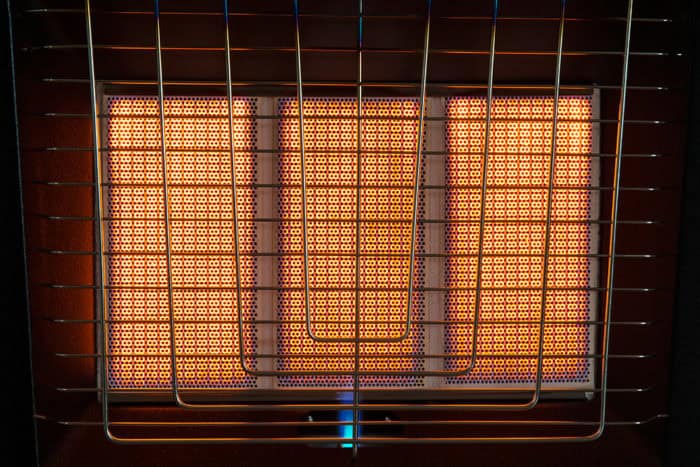
Conclusion & My Recommendations For Small Portable Indoor RV Propane Heaters
Even in the mellowest of climates, chilly mornings are going to follow you everywhere.
It’s especially hard when you are camping in an RV, van, or tent because normally it’s the same temperature inside as it is outside when you first wake up.
Small portable indoor propane heaters are a fantastic way to warm up in the morning without having to use any electricity.
Portable propane heaters are always ventless.
Most are compatible with 1 lb propane tanks, which means you don’t need to do any kind of installation if you don’t want to.
See Also: Best Heated Water Hoses For RV Campers, Barns & Livestock
Deciding on the one that’s best for you is easy once you know what you want to use it for, and the size of the area you want to use it in.
If you camp in a van, tent, or small camper you are going to want a small portable propane heater like the Mr. Heater Little Buddy.
If you want a heater that works well indoors and outdoors a slightly larger but still portable heater like the Mr. Heater Buddy is a great option.
If you want an extremely efficient propane heater for inside the RV that has the option to wall mount some of the larger options will be best.
Now that you know some of the best options for RV propane heaters out there here are some of my recommendations for certain uses.
Best Overall – Mr. Heater Buddy Indoor Safe Portable Propane Heater
Mr. Heater knows what it’s doing when it comes to the safest and best propane heaters for indoor, camping, and RV use.
They make many different styles of heaters but their Buddy version is the best overall.
I like that it can easily connect to all kinds of propane tanks from 1lb to larger ones.
It’s a good size for small or large indoor spaces or staying warm when spending time outdoors.
It’s portable, easy to pack away, and can be used in tents.
The safety features are unmatched by any other portable indoor propane heater.
It even has the auto shut-off for accidental tip-overs which is one of the most important features for a small propane heater that is easy to miss and could be knocked over.
I’ve used this heater on cold mornings in my own 32-foot travel trailer and it’s done very well heating everything.
Once my trailer gets warm I sometimes have to turn it off because it puts out so much heat even at the lowest setting.
Most Portable – Mr. Heater Little Buddy Small Indoor Safe Propane Heater
While the Mr. Heater Buddy is also very portable when using a 1 lb propane tank, the Mr. Heater Little Buddy is always going to be super portable and very easy to carry around.
It has a large handle on top you can use to carry it, and it’s extremely lightweight and easy to store.
It’s a fantastic choice for adding a little more heat to your personal space or using it as the main heater in a van or tent.
It has all the safety features of the Buddy like the tip-over shut off, and low oxygen sensor.
It burns at a fairly high BTU for its size which means it will be able to keep larger areas than you think toasty and warm.
The only downside is there’s only one heat setting.
I’ve used this version in my travel trailer and motorhome.
It was perfect for mild temperatures in the large travel trailer, and plenty of heat for colder mornings in my small motorhome.
Most Efficient – Camco Olympian Wave 3 LP Gas Catalytic Heater
Catalytic heaters unlike regular blue flame or radiant propane heaters don’t use flames to heat.
Instead, they use combustion between a catalyst, propane, and oxygen to create heat.
There is a flame used to start the combustion process but once the process has been started the pilot goes out there there is no longer an open flame.
This makes the Camco Olympian Wave 3 catalytic heater very safe and perfect for use in small spaces like RVs, vans, and even some tents.
They are also extremely efficient and put out a lot of heat with just a little bit of fuel.
Even though it only uses 1,600 to 3,000 BTU it can still heat spaces up to 130 square feet.
It can also be nicer for small spaces since the low setting is milder and you will be able to leave it one without getting uncomfortably hot.
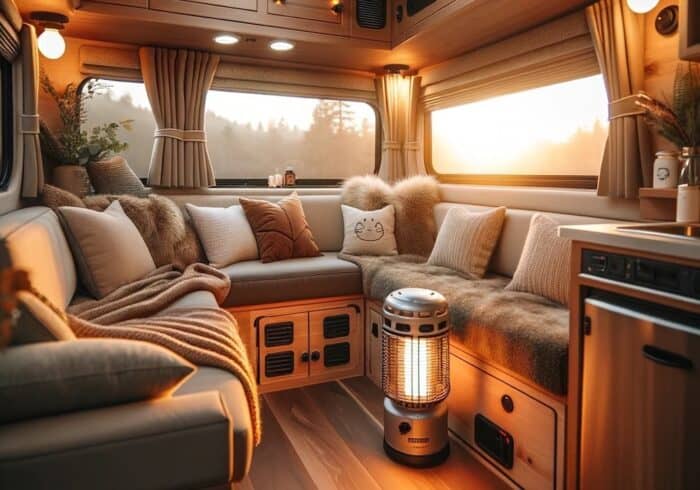
Frequently Asked Questions About Portable Propane Heaters
How many btus is a gallon of propane.
One gallon of propane is 91,502 BTUs of energy.
How many pounds is a gallon of propane?
One gallon of propane weighs 4.2 lbs.
How many BTUs are in a 1 lb propane tank?
There are about 21,000 BTUs in a 1 lb propane tank.
Is it safe to leave a portable propane heater on at night?
Portable propane heaters are generally safe but like any small space heater, they have their risks.
I don’t recommend leaving one on at night but the end decision is up to you and how safely positioned the propane heater is.
If you have pets or children you should never leave the heater running at night or unattended.
If you plan on using a portable propane heater for overnight heating, use it plenty during the day first.
That way you’ll know if it has any problems and that the heater runs well in the space you have chosen.
Also, always have a tested carbon monoxide detector nearby.
Are portable propane heaters ok to use indoors?
A portable propane heater is only safe to use indoors if it is made for indoor use.
You should always have some sort of ventilation whenever using any propane appliance inside.
Heaters that go on the top of the propane tank (tank top heaters) are generally never safe to use indoors unless specifically made for indoor use like the Mr. Heater Little Buddy reviewed above.
Be sure to follow all of the safety instructions for your specific portable propane heater and always have a propane detector nearby at all times.
What is the smallest propane heater?
The Little Buddy by Mr. Heater (click to view on Amazon) is one of the smallest portable propane heaters on the market today.
You can read more information about it in the reviews section at the beginning of this article or check out the full review here (click to view) .
Do you need ventilation when using an indoor ventless propane heater?
Yes, you always need to have ventilation when using any indoor propane product especially if it’s ventless like portable propane heaters.
Because they burn oxygen and have some emissions, they introduce a carbon monoxide risk if not properly vented.
That is why you should always have a propane detector nearby at all times.
When using a ventless propane heater in an RV, van, or tent you can usually achieve proper ventilation by partially opening a window.
Because RVs have a lot of propane appliances it’s recommended to always have at least one window cracked to allow some ventilation at all times.
Also, always make sure your carbon monoxide sensor is in working condition.
Can a portable propane heater be used in a tent, hunting blind, or camping shelter?
Yes, if the propane heater is rated for indoor use, has enough open space to run safely, and is used carefully it can be used inside a tent, hunting blind, or camping shelter.
Just make sure you always leave a window open enough for proper ventilation and use a propane detector alarm.
What does the low oxygen sensor on a portable propane heater do?
Propane heaters burn oxygen.
If you use one in a closed space that doesn’t have any ventilation or airflow, your heater will eventually eat up all the oxygen in the air.
No oxygen in the air is not good for humans, and it’s hard for your body to tell when oxygen levels in the air are getting low.
The low oxygen sensors on propane heaters test the air and will shut off the burner and gas if the levels start to get too low.
It’s a neat safety feature and a good one to have, especially for indoor or RV propane heaters.
That being said you should never 100% trust any of the safety features. Nothing is perfect and sometimes these features fail.
Always make sure there is plenty of airflow and ventilation in any space you are using a propane appliance.
This ensures the oxygen levels will stay safe.
What is more efficient an electric space heater or small propane heater in an RV?
It really depends on how much your electricity costs and how much propane is.
If you’re boondocking and don’t have access to very much electricity, you are going to want to use a portable propane heater because they don’t use any electricity.
They also use way less propane than the built-in RV furnace.
The most efficient way to go is a catalytic propane heater like the Camco Olympian Wave 3 LP Gas Catalytic Heater .
Catalytic heaters put out a lot of warm radiant heat and they use hardly any propane.
Price-wise they may even be more economical than an electric space heater in the long run.
A standard blue flame or radiant propane heater might not be as efficient as an electric space heater.
They put out more heat and are better for large spaces.
If you are comparing a small space heater with a small propane heater the price difference for energy isn’t that much.
How much propane does a portable propane heater use?
It depends a lot on the size and style.
A catalytic propane heater uses hardly any propane while a regular blue flame or radiant propane heater that has a flame can use quite a bit.
If you look at the table at the beginning of this review, it will tell you the max run time on 1 lb of propane for each of the 6 best portable indoor propane heaters in this review.
How to duct or vent a portable propane heater
Portable propane heaters rated for indoor use are ventless and do not need ducting, that’s what makes them portable.
That being said you should always have some ventilation in the area you are using the heater.
Normally cracking a window or door creates enough ventilation for a small propane heater.
How long does a Buddy heater run on a small propane tank?
The Mr. Heater Buddy will run for around 5.5 hours at the lowest setting and 2.4 hours at the highest setting when connected to a small 1 lb propane tank.
The Mr. Heater Little Buddy only has one heat setting and will run for around 6 hours on a small 1 lb propane tank.
Have any more questions about portable propane heaters for indoor or RV use? Leave a comment below.
Leave a Comment Cancel reply
- Skip to main content
- Skip to secondary menu
- Skip to primary sidebar
- Skip to footer

Jeffsetter Travel
Travel Consultants and Travel Tips
7 Best Tank Heaters For Your RV
June 27, 2021 by Charlotte Phillips
Last updated on May 15th, 2023 at 11:47 am
All of our reviews are based on exhaustive research, industry experience and whenever possible, hands-on testing. When you make a purchase using one of our chosen links we’ll receive a small percentage of the proceeds. This supports the site and keeps Jeffsetter running. You can read more here .
If you love to camp in winter weather conditions , it can mean amazing travel opportunities for you. Beautiful cold climates, fewer tourists around, and you can see it all from the comfort of your RV!
However, what happens when your freshwater tank freezes due to these cold climates? Can anything be done to prevent your RV’s precious liquids from freezing? Thankfully, there is a product out there for you: RV tank heaters.
RV tank heaters are a wonderful invention and something that may come standard on newer RVs. But what are they, and are they right for you? Let’s take a look, and go over some of the best tank heaters for your RV!
But if you want to skip ahead and just see what made the list you can check out our favorites here:

- Efficient heating
- Made for large capacity tanks
- Easy to install

- Reliable customer service
- DC operated heater

- Dual power option
- Thermostatically controlled
- Family-owned company
What Are RV Tank Heaters?
RV tank heaters, also known as RV tank heating pads or RV holding tank heaters, are exactly what they sound like. They are heaters, usually found as pads, that attach to your various RV holding tanks.
These tank heaters run off of your RV’s existing power , either using the AC shore power or the battery-operated DC power. There are tank heaters designed to use either energy source, depending on your preferences, and sometimes the heaters have dual power options.
These tank heaters may sound complicated to install, given their need for electric power. However, they may be easier to install than you think, especially with helpful youtube tutorials like the one below !
While RV heating pads mainly exist to be installed on the outside of your holding tanks, you can purchase smaller heating pads as well. Often angled or manufactured in various shapes and sizes, these heaters are more versatile.
The pads attach to various pipes and fixtures, which means you don’t have to worry about water or fluids freezing up in any areas of concern. They are also very similar to the larger pads in terms of installation.
RV tank heaters are often installed standard or as a relatively common add-on to new RVs. Given the popularity of RV travel year-round, more and more manufacturers are considering tank heaters a necessity.
However, if you don’t own a new RV, tank heaters are an easy after-market installation. They can be incredibly useful for full-timers in cold climates , or anyone worried about getting caught in the snow for a few days!
When Do I Need RV Tank Heaters?
While there are other options to keep your tanks from freezing, there are times when you need RV tank heaters. If you are planning to camp in your rig during freezing temperatures for more than one night, RV heating pads are an excellent solution and a necessity for many RV owners.
Most RVers recommend using tank heating pads when the outside temperature reaches 32 degrees Fahrenheit or below, especially for extended periods. However, you can only use RV tank heating pads when you have liquid in your various tanks.
The pads are made to prevent the fluids and liquids in your various tanks from freezing, leading to expanding and cracking of your tank. However, if you turn your tank heater on when there is no liquid present, you may cause just as much damage to your tanks as if you had just let it freeze!
Some RV tank heaters have thermostats and can automatically detect when it is time to turn on. This can be the most convenient, though expensive, option for those of you shopping for aftermarket heating options.
You can always use RV antifreeze for your pipes and tanks, though these products are best for a rig that is left sitting for the winter. However, you may wish to check out some of these products if RV holding tank pads are out of your budget.
Overall, you should plan on a way to heat your RV’s tanks if you are traveling in winter weather conditions, even if there isn’t a snowstorm coming. Ambient freezing temperatures can quickly freeze your RV’s various systems, which means more damage and money spent in the long run!
Types of RV Tank Heaters
Most RV tank heaters can be found in pad form with easy-to-install instructions. However, there are many types of specifications for RV tank heaters, as well as various sizes and purposes. Let’s check out the different types.
Standard Pad Heater (AC or DC)
The most common type of RV tank heater comes in a heating pad form, complete with easy-to-install, peel-and-stick adhesive. These pads will fasten to the underside of your holding tanks and allow you to hook them up to your existing RV power system.
These pads come in various energy consumption amounts as well as sizes. They are also available in AC shore power or DC battery power options, and sometimes both power options are available. The AC power heating pads are usually more expensive than their DC counterparts. However, AC-powered heaters usually use fewer amps, which could be an important distinction to make when you are budgeting.
These pads range in price depending on their manufacturer, but certainly because of their various tank heating sizes. The bigger the tank, the more expensive it will be to heat. However, RV tank heating pad manufacturers are aware of this and usually scale their pads to appropriate sizes.
The amperage draw ranges from 1 amp to as many as 12 amps, depending on the size of the heater. Calculating your amperage is important when it comes to maintaining your RV during your camping trip, so keep your newly installed tank heaters in mind.
If you plan on boondocking and relying on your RV’s batteries during this time, your heating pad may drain your batteries faster than you think! However, having tanks that aren’t frozen is definitely a huge benefit.
Pipe and Pipe Elbow Heaters
If you have a newer RV with tank heaters installed, you may be wondering if there is anything more you can do to further protect your new rig. You’re in luck! Besides using nontoxic antifreeze, you can buy heaters for your pipes and the elbows of your pipes.
These little heaters operate almost identically to your large tank pad heaters, except they are much smaller. Drawing very few amps, these tiny heaters can adhere to your RV’s various pipes and fixtures. There are specialty pipe elbow heaters for any tricky pipe corners that may be present in your rig.
These pads still have to be integrated into your RV’s electrical system, but it may be something to consider should you not need an entire tank pad heater at this time. Given their small size and minimal amperage draw (usually less than 3 amps per heater), these little guys are primarily made for DC battery power. This could be a pro or con, depending on your intended usage and travel plans.
These pads may work perfectly if your holding tank heating pads are currently on your AC system. That way, your batteries aren’t taking the brunt of the amperage necessary to keep these heaters running!
Gate Valve Heaters
Even more specific than pipe or elbow pipe heaters, there are also pad heaters specifically made for your RV’s sewer valve! Gate valve heaters are used when the valve is frozen closed and you’re trying to vacate your black and gray water systems .
You may not ever consider this heater as a necessary component. However, imagine this scenario: it’s extremely cold and windy outside and you stop by the dump station to vacate your black and gray holding tanks like your rig’s manufacturer recommends. You pull one of the dump lever handles and it won’t move; this means your RV dump valve is frozen!
This can mean a really tough time for some RVers who often camp in cold climates. While a frozen valve may not happen very often, it is certainly something that cold-weather campers encounter. That’s why there are heating pads made specifically for sewer valves too. The heat panels used in gate valve heaters are designed a bit differently than your holding tank heaters.
These little valve heaters are made to rapidly penetrate the thicker plastic with enough heat to thaw the frozen tracks of the gate valve, fast! Sounds cool, right? There are a few caveats to this, such as the RV gate valve heater must be controlled independently from all the other heaters, with a separate on/off switch just for the gate valve option. This switch is usually located near the valve itself.
If needed, turn the heater on for approximately 5 to 7 minutes, or until the valve is freed. Turn off the switch and evacuate the tanks as you normally would. These heat panels are designed for short-term use, and only in freezing cold weather where the gate valve has been frozen closed.
What To Consider Before Purchasing An RV Tank Heater?
Before you decide on your favorite RV holding tank heating pads, there are a few additional things to consider. Check out these key facts before we dive into our list of products.
How The Heater Will Be Powered
We’ve touched on this a bit already, but a key consideration for you to make is how you would like your RV tank heater to be powered. Choosing after-market heating pads is often better than having pads already installed, as you can choose the power source that works best for you!
Your holding tank pads can be powered by either DC or AC power. They can rarely be powered by both, so this means that the power option you choose matters. If you are planning to be hooked up to shore power for most of your trip, then AC is the best way to go.
However, if you are hoping to boondock in the winter, you will want a tank heater independent of any shore power. DC power will be your best bet, though you will need to keep in mind how many batteries you have aboard your RV and how many amps they can handle.
Choosing DC-powered heating pads may be beneficial for those of you hooked up to AC power for this reason: your RV no doubt needs the majority of your AC power for various appliances. So it could be beneficial to have your heating pads hooked up to your battery power so that you always know your AC amperage draw. No one likes a blown fuse!
The Size Of Your Holding Tanks
You will soon discover that the size of your RV’s holding tanks is one of the main factors when it comes to choosing a tank heater. Most tank heating pads are classified and sold based on the size of the tank that they are capable of heating.
So, knowing the size in gallons of your current holding tanks is necessary! Hopefully, you know this number or can contact a manufacturer to ask what size your tanks are. But, if you’re like me and don’t know how big your tanks are, this step can feel a bit daunting.
Most RV holding tanks have their capacities written on the outside, which means that if you aren’t sure of your capacities, the tank should hold the answer! Otherwise, especially for older or less known RV manufacturers, check out some forums or RV experts for more information.
Knowing your tank size is detrimental to purchasing a properly sized tank heater. You don’t want a heater that is far too large (which could overheat your tank) or much too small (which could leave your tank partially frozen).
The Weather For Your Upcoming Trip
Camping in the snow or other wintery weather can be a magical experience! However, it is important to be prepared for camping trips such as these. Before you purchase your tank heaters, knowing where you plan on traveling will benefit you.
Are you planning on visiting a location that has forecasted temperatures of around 35 degrees Fahrenheit? You may need to worry a bit less about having holding tank heaters. However, is your forecast looking a bit chillier than that?
If your trip is scheduled during freezing temperatures, tank heating pads could make the difference between a fun experience and a miserable trip. Keep in mind where you are traveling to and that location’s winter weather before you make your final tank heater purchases.
Your budget for your RV’s tank heaters is important. While there aren’t too many products on the market so your average cost will be almost the same no matter what, there are certain factors that help with saving some funds.
For example, choosing tank heaters that run on DC power rather than AC power is occasionally less expensive. Plus, choosing the right size to fit your tanks could help you save a few bucks when you would otherwise buy a heating pad that’s too large for your rig!
While it does vary depending on the size of your tanks and the number of pads needed, the average budget for purchasing RV holding tank heaters ranges from $100-$500. It all depends on how many pads you anticipate needing and what power option you are hoping for, as well as the potential installation fees should you not be installing these yourself.
How Many Tanks You Want Heated
There are three primary tanks of liquid found on RVs: your gray water tank, your black water tank, and your fresh water tank. While the locations of these tanks vary, if you plan to camp in cold weather it is recommended that all of these tanks are heated.
While this may not be ideal for your budget, the last thing you need is for any of these tanks to split or crack. However, I know that my fresh water holding tank is located inside the shell of my rig, which means it is no doubt warmed by my own personal heater! I would not need to purchase a fresh water tank heater, at least not right away.
Most black and gray waste water tanks are found underneath your rig and, unless you have an insulated underbelly , you may want to purchase a heating pad for both of these tanks. Some rigs have the black and gray waste gathered into one tank, so that means you would not have to purchase as many pads.
No matter what, a good rule of thumb is this: if you’re planning to heat one tank, you may as well heat them all! If you’re going somewhere cold enough to merit tank heaters, then you best make sure they are all heated properly.
If You Want A Power Switch Inside Your RV
While all RV holding tank heaters are designed to sense the inner temperatures of your tanks, they can’t turn on without you! Having a power switch for your tank heaters is a great option for many reasons.
It could be beneficial to have a switch for your tank heaters inside of your RV should you be camping in cold weather. Could you imagine going outside to manually turn on your tank heaters in a freezing winter storm!? Brr!
However, these switches are not always standard, and it may cost a bit extra to get one, especially one with three distinct switches for each tank heater. Plus, a switch may mean a more complicated electrical installation, something you may not want to do yourself.
If you are having your tank heaters installed professionally, a switch may be something you request. If your budget can handle it, a switch for your tank heaters may be the most convenient and ideal option for you!
The Best Tank Heaters For Your RV
Feeling confident about all of this information regarding RV tank heaters? Do you know what sizes your tanks are and how big of a pad you need? Are you planning to install these yourself, or will you be seeking professional installation help?
I’m sure you’ve answered all of these necessary questions, so let’s get down to the list of the best tank heaters for your RV!
Best Overall: Facon 8.0″ x 25″ RV Tank Heater Pad
Facon 8.0″ x 25″ rv tank heater pad.
I’ve included the name Facon a few times on this list, as it’s a brand that makes reliable and easy-to-install tank heaters, perfect for many different-sized tanks, and every level of RVer, even beginners . This one, in particular, is ideal for tanks up to 50 gallons in size, so I know my hefty tanks are covered for when temperatures plummet.
The built-in sensor in the heater will turn “ON” the tank heater as soon as the tank temperature drops to 45°F( + – 5 degrees), this is an impressive feature in my eyes, as it takes a job off my plate and does the hard work for me – turning on when needed. From the get-go, the tank heater immediately starts protecting my holding tank from freezing up, and what’s even better, is that when the temperature in the holding tank rises to 68°F( + – 5 degrees), the tank heater will automatically turn “ OFF”.
The pad size of 8.0” x 25” works efficiently on up to 50-gallon holding tanks, whether it be a freshwater tank, grey water tank, or black water tank, making this suitable for a range of RVers. I like this 3mm foam insulation pad as it is self-adhesive, making it easy to install, with no extra fuss or adhesive required.
Using AC power, the heating pad uses low amps, whilst heating my tanks efficiently. This is a game-changer for me, as I don’t have the biggest electrical set-up in my rig and can’t use appliances or kit that needs a high volume of power. I also enjoy that these heating pads can be bought in packs of three, so I can have ideal cold-weather coverage for all three of my holding tanks!
While this heater takes our best overall slot on this list, it is important to note that the manufacturer doesn’t recommend installing this unit on the same circuit as a pump motor or microwave oven. This may be a bit frustrating if you’ve already planned where you were going to install the heater, but with some re-jigging and brainstorming, it won’t be too hard to sort it out.
You can check out today’s price on Amazon by clicking here .
Best DC Power Option: Facon 12″ x 18″ RV Holding Tank Heater Pad
Facon 12" x 18" rv holding tank heater pad.
As I already mentioned, Facon is going to be on this list once or twice! This particular heater pad is also built for 50-gallon holding tanks, but it is made to be installed using your DC or battery power system, not your AC, which may be more beneficial for some.
This heating pad passed the US Standard QAI Quality Certification, which means it is a reliable and safe product, something important for my partner and me as we only want safe, durable products in your rig. Facon also takes full responsibility for their products and customer dissatisfaction, offering a reliable customer service line and a one-year warranty on this heater, giving me the peace of mind I need that if I face an issue, I have somebody to help for some help and advice.
Other than that, the specifications on this model are similar to the last product listed, save for the size of the pad and that it runs on DC instead of AC power. For tanks larger than 50 gallons, I would advise purchasing additional pads as the goal is to heat the tanks fully, stopping them from freezing.
The built-in sensor in the heater will turn “ON” the tank heater as soon as the tank temperature drops to 45°F( + – 5 degrees). The tank heater immediately starts protecting your holding tank from freezing up. When the temperature in the holding tank rises to 68°F( + – 5 degrees), the tank heater will automatically turn “ OFF”. This heater is therefore easy to use and is an effective way of protecting my tanks from the cold.
I would recommend being fully certain the pads are charged up by using a multimeter or similar , and that they fit your tanks perfectly before taking off the backing paper and installing them. Trying to take the pads off once they’re stuck on is a nightmare and a sticky mess, so it’s best to be sure and check beforehand.
You can learn more and see today’s price on Amazon by clicking here.
Best Dual Power Option: JR Products HTH-A Holder Tank Heater
Jr products hth-a holder tank heater.
I said that a dual-power RV tank heater was rare, not impossible. That’s why I’ve added this heater from JR Products to our list. It’s an innovative, dual-tank heater able to keep up with the rest of the dual energy option appliances in my RV!
As you can see, this pad only uses 1 amp while on AC power and 10 amps while on DC power, making it a great fit for heating my holding tanks. I know I’m covered when the cold weather hits as it’s designed to fit tanks up to 15 gallons. If you have a larger RV with big tanks, I’d recommended purchasing a tank heater that’s on the bigger side to make sure the tanks are adequately protected.
Easy installation is something I always look for when browsing RV products, but this tank heater isn’t as easy as it sounds! The adhesive isn’t the stickiest which can make things tricky, so I would advise adding some more after installation to help keep everything secure and attached.
Overall, however, this heater is created by the family-owned and operated JR Products, and since I try to buy and support local where I can, this is a tank heater worth considering. The product lineup for JR Products includes everything from Hardware to Electrical, Plumbing to LP Gas, and so much more, so they are a reliable company in the RVing game that knows the importance of high-quality and effective RV products.
You can see the latest price on Amazon by clicking here .
Best Whole Kit With Switches: RV Tank Heater Pad Kit 12V | Includes Toggle Switch and Wire by RecPro

RV Tank Heater Pad Kit 12V | Includes Toggle Switch and Wire by RecPro
- All in one kit
- Rated for up to -11 degrees Fahrenheit
- Large tank capacity
Although I’m happy to take step-by-step measures to support my RV through cold temperatures , I find that all-in-one kits can be a game-changer, saving me time and effort when protecting my rig’s tanks. So, that’s why I’ve included this spread by RecPro! It includes 3 pipe elbow pads, 3 tank heater pads up to 50 gallons each, 60 ft of wire for proper installation, and a triple toggle switch – everything I need for a safe and durable RV tank water heater set-up.
Both the tank heater pads and the elbow heater pads are specifically designed to insulate and heat my tanks and pipe elbows, respectively. I like that this heating pad has been used by RV owners for years, as it means I trust this product to keep my tanks warm and protect water safety down to -11° F. Something that can affect how well the heater works is poor installation, so I feel it’s best to take your time and make sure as much of the tank is covered correctly as possible.
The tank heater pad measures 12” W by 18” L and the elbow heater pad measures 13” L by 3” W, and both pads are 3.0 mm thick and are rated for a DC connection. These specifications make this heating pad suitable for a range of RV types and designs, coving fresh, grey, and black water tanks up to 50 gallons, and even includes a 36” lead wire. The elbow heater pads are to be used with 3” elbow pipes and come with an 18” lead wire.
Like the other heaters mentioned on this list, I enjoy the automatic sensors as they know when it’s time to turn on and off, saving me a job, but the elbow heater pads don’t have this ability. Because of this, I find the toggle switch easy to use and read, with a clearly defined label on it as well as an LED light built into the switch, allowing me to see whether the heater pads are on even in the middle of the night.
You learn more and see the latest price on Amazon by clicking here .
Best For Large Tanks: UltraHeat 75 Gallon RV Tank Heater

UltraHeat 75 Gallon RV Tank Heater
- Reliable brand name
- Built for large holding tanks
- AC power supply
- Strong adhesive
UltraHeat is known as the original and #1 selling anti-freeze protection brand of products for RV and marine holding tanks and drainage systems, first introduced in 1988. This brand has been the RV industry standard to use since 1991, so there’s no doubt in my mind that this large-capacity heater will tick the boxes for an effective tank heater.
Archived as an “Industry Changing Product” in the RV Hall of Fame back in 2011, this tank heater has been copied but never beaten in performance or longevity. Reportedly, heat panels originally installed back in the early 90s are still satisfactorily working today, which means I most certainly trust this brand’s reliability.
UltraHeat products use exclusive UltraHeat Technology and have been designed and used by everyday RVers to effectively perform in temperatures down to and even below -11°F (-23.9°C). This does depend on RV designs, installation modifications, and add-ons, but generally, I trust this piece of kit to protect my tanks during winter. It’s recommended by seasoned RVers for use in everything from mildly cold weather to the most extreme and unfriendly climates and is a good addition to make to your winterizing routine .
All Tank Heater models have a built-in sensor to maintain holding tank fluid contents between 44°F (7°C) and 64°F (18°C) once power is supplied, meaning there’s no need for me to monitor the temperatures as the heater is doing the job for me! This particular model is built for tanks up to 75 gallons which is a bit too big for my tank but might be perfect for those with bigger rigs.
Tank heaters, in general, can be quite an investment, so I think it’s wise to take the installation slow and get it right the first time. The last thing you want to see when driving down the road on your family vacation is heater pads flying in the wind behind your RV! So ensure everything is stuck down and secure before setting off on a new adventure.
Check out the latest price on Amazon by clicking here .
Best For Your Pipes: Facon 3″ x 8″ RV Elbow Pipe Heater Pad

Facon 3" x 8" RV Elbow Pipe Heater Pad
- Comes in multiple pad options
- Very low amperage draw
Yep, you guessed it. It’s Facon branded heating pads again! This time, they’ve made smaller-sized heaters, built specifically for RV and elbow pipes. I like the flexibility of buying these little guys in a pack of two, three, or six, as it gives me plenty of options to fully heat all of my RV’s exposed tanks and pipes!
These heating pads measure three inches by 8 inches, small enough to cover any pipe elbows or straight piping, which is essential for RVers like me who travel year-round and often face all four seasons from scorching summers to icy winters. It’s ideal for pipes that measure an inch and a half in diameter, which is good as this is a fairly standard unit of RV pipe measurement. They use about half an amp of DC power each, which means I hardly notice their energy draw, and my batteries don’t struggle .
The main downside of these heaters is that they only really have an on or off mode. However, the low level of heat that they give off will protect my pipes well during harsh winter conditions. Since they are not thermostatically controlled, it is important to only use them during cold months, so this is something worth remembering if you chose to purchase this elbow pip heater pad.
Read reviews and check the latest price on Amazon by clicking here .
Best On A Budget: RV Holding Tank Heater Pad by H&G Lifestyles

RV Holding Tank Heater Pad by H&G Lifestyles
- Budget friendly
- Built for larger tanks
- Helpful warranty
RVing can cost a substantial amount, so I tend to look for RV products that won’t break the bank! This two-pack of heaters by H&G Lifestyles gives me two for the price of another company’s one and still has many similar benefits.
H&G Lifestyles heater pads are designed to protect RV water tanks from freezing, and with this pad providing protection against ambient temperatures down to -20 degrees Fahrenheit, I know my rig and its components are covered. This heater keeps the inside water temperature well above freezing, so I can rest easy knowing the water on board won’t freeze. Using reliable AC power to do so, this pad has a low amp draw as well, something I like as I love to camp off-grid , and this means limiting my power usage.
Built for tanks up to 50 gallons, this two-pack should have most winter weather needs covered, but I would advise a bigger heater if you have larger tanks sized more towards 70 gallons. The standard power plugs are a perk in my eyes, but this depends on what you are looking for and your specific RV setup. Installing the pads with DC power might be an option, so it’s worth doing some additional research for your specific setup.
Along with maintaining a reliable temperature inside my holding tanks, these heaters come with a 2-year warranty. This should protect my purchase and allow my pads to be replaced should anything happen to them. No matter the price or budget, having reliable customer service is essential for me!
You can learn more and check the latest price on Amazon by clicking here .
Installing Tank Heaters
While RV holding tanks and pipe heaters require some finesse to install, it is not impossible for the average DIY-er to do! However, since you will need to alter your RV’s electrical system with this installation, it may be something you’d prefer a professional to do.
If you’re up for the task, installing an RV tank heater is easier than you might think! Besides following helpful youtube tutorials, here is an easy guide to installing your new heating pad.
1. Determine Where To Install The Pad
Many manufacturers have specific installation instructions for your new heating pad, but most companies suggest installing the heat panel as close to the drain outlet of a holding tank as possible, and with the power wires running towards the outlet.
2. Clean The Exterior Of The Holding Tanks
Wherever the pad adhesive will be touching, make sure you clean the area thoroughly. A simple soap and water mix usually does the trick. Once everything is squeaky-clean, you can go ahead and peel away any paper backing from the adhesive. Be careful that the adhesive does not catch on anything, as it is usually very powerful!
3. Press Adhesive Side Onto Tank
Begin pressing the adhesive side of the pad onto your RV holding tank. Begin at one end and slowly press the rest of the pad onto your tank, one end to the other. Be sure to apply an even amount of pressure to all adhesive sections of the pad. This step is important to ensure an even and secure fit on any and all RV tank heaters.
4. Attach All Electrical Elements
While your battery and RV aren’t hooked up to electricity, attach your heating pad’s power wires to your existing power wires. This is the trickiest part of this installation, and do consider seeking professional installation help should you be nervous about this.
Pipe and valve heaters are installed in the same way, though finding your necessary electrical components may be a bit more difficult. However, any RV repair shop should be able to install these for you with little issues, and you may consider this option if you have not done many RV repairs yet yourself.
Maintaining RV Tank Heaters
Your RV tank heaters are easy to maintain, as they are meant to be installed and forgotten. However, you may wish to maintain them in the following ways. Just like every part of RVing, some maintenance is necessary!
1. Clean and Check RV Heating Pads Regularly
The underside of your RV sees a lot of dirt and grime, especially snow in the winter months! These pads are designed to be waterproof, so cleaning them should be a fairly easy task. It’s also essential to check your RV heating pad insulation for any wear and tear. This easy maintenance may be something you want to do after every trip, just to ensure no wayward rock or road debris has damaged your heaters.
2. Install RV Underbelly Protection
The best option for long-term protection of your RV tank heating pads is to install RV underbelly protection or insulation. A single sheet of corrugated plastic could be all you need to ensure a long life for your heating pads!
3. Ensure Electrical Connections Aren’t Worn
While a bit of electrical tape can work in a pinch, you shouldn’t be taping up your RV heating pad electrical connections. This can be dangerous in the long run, and maintaining your electrical wiring is key to these heaters lasting a while.
4. Check Pads Are Off During Summer
Make sure your heating pads are off during warmer months and when your tanks don’t have liquid present. You don’t want to burn out your heater while you don’t need it, and you certainly don’t want to damage your tanks when there’s no water inside of them!
Choosing a tank heater suitable for your RV tanks is a crucial part of preparing to camp during inclement weather. If you’re a dedicated cold-weather camper, RV holding tank heaters are great purchases to make, as they will ensure your fresh water, grey waste, and septic tanks won’t freeze when temperatures drop below zero.
You simply have to turn them on, and then enjoy defrosted holding tanks, no matter how cold it gets outside!
Important Links
- Advertising Policy and Affiliate Disclaimer
- Privacy Policy
- Contact Jeffsetter Travel Blog
- Ask Jeffsetter a Question
Recent Posts
- New for 2024 Mastercard Benefits
- Review: Ken’s House of Pancakes (Hilo)
- Review: Arden Waikiki
- Spirit Airlines Defers Deliveries
- Las Vegas May Get Another Airport

The best RV tankless water heater in 2024
Autoblog may receive a share from purchases made via links on this page. Pricing and availability are subject to change.
Glamping in an RV can completely change a person's experience of the great outdoors. RVs provide plenty of creature comforts that you just can't get with a traditional tent setup, not the least of which is running water. While most RVs have water tanks, you'll likely have to do a bit more accessorizing if you want to heat that water up enough to do something like shower. An RV tankless water heater can do exactly that. There are plenty of options out there, so we've wrangled up some of the most popular and accessible heaters in this list below.
RecPro RV Tankless Water Heater - $429.95 (14% off)
Key features.
- Provides instant hot water with no wait
- Features a forced exhaust structure and dust net to keep the air clean as it moves through the tankless water heater
- Utilizes low water pressure startup
- Heated with propane
- "Flame Out Protection" automatically turns off the unit if the flame gets snuffed out
- "Water & Gas Linkage Control" turns off the heat if you run out of water, so you don't use up all your propane or damage the heater
- "Frost Protection" automatically heats the water if the temperature is 43°F or less
- Temperature range from 95°F - 123°F
- Applicable water pressure from 14.5 PSI - 116 PSI
The RecPro option has lots of great features such as a forced exhaust structure and dust net for keeping the air clean as it moves through the heater, low water pressure startup, "flame out protection" and more. It'll even automatically turn off the heat if you run out of water so you don't use up your propane or damage the heater. This unit can provide heat from 95°F - 123°F with water pressure from 14.5 PSI - 116 PSI.
Camplux Tankless Water Heater - $292.12
- 2.64 GPM (Gallons Per Minute) of instant hot water are produced
- Only heats the water when it's being used - no need for preheating
- 6-in-1 multiple protection includes flame-out protection, anti-freezing protection, over-heating protection, air flow pressure switch protection and more
- Utilizes an electronic ignition system and plugs into a standard 120V outlet
- Compact design made for saving space
- Features a digital temperature display
- Camplux offers 24 hour customer service
This Camplux heater provides 2.64 gallons per minute of hot water. Like all tankless water heaters, there's no need for the water to pre-heat, which means it provides instant hot water whenever you need. This one features six types of protection including flame-out protection, anti-freeze protection, over-heating protection and more. It even has a digital temperature display built right in!
FOGATTI RV Tankless Water Heater - $599.99 (28% off)
- Features a high altitude suitability mode, providing usability as high as 9,800 feet
- Staged combustion technology prevents water from getting too hot in the summer and saves on propane
- Produces 2.9 GPM (Gallons Per Minute) of hot water. The supply of hot water lasts over 20 minutes
- Includes a built-in pressure release valve
- Features a wired (2 meters) remote controller
- CSA certified with multiple protection features: built-in forced exhaust fan, stable combustion, automatic gas shut-off and anti-freeze
If you're looking for an RV water heater that'll stay consistent in high altitudes, this Fogatti option is worth a look. It provides usability as high as 9,800 feet. It also features staged combustion technology to prevent water from getting too hot in warm days and will also save you propane. It produces 2.9 gallons per minute of hot water, has a built-in pressure release valve and even features a (wired) remote controller.
Furrion 2.4GPM Tankless RV Gas Water Heater - $650.00
- 2.4 GPM (Gallons Per Minute) capacity
- Delivers hot water on demand "even when the ambient temperature drop to 32°F"
- Built-in sensors automatically turn the heater off if the water temp goes above a safe limit
- " Specially designed for retrofit applications and use(d) as a replacement door for Suburban 4/6 Gallon Water Heater models. This door fits the required dimension of 16.14-inches x 16.14-inches"
- Utilizes Furrion VibrationSmart technology to be able to withstand vibrations caused by rocky or uneven terrain
- Covered by Furrion's 2-year warranty
If you're planning an extra rugged trip, this Furrion tankless water heater is worth a look. It features VibrationSmart tech to help it withstand vibrations caused by rough terrain. It has a 2.4 gallon per minute capacity, can deliver hot water even when the ambient temperature reaches freezing (32°F), and it's specifically designed for retrofit applications and can be used as a replacement door for Suburban 4/6 gallon water heater models. The best part? It's covered by a 2 year manufacturer warranty.
Girard RV Tankless Hot Water Heater - $479.99
- Features an onboard microprocessor to control things like flow rate and outgoing hot water temperature to keep it consistent
- Consumes half the propane gas that a six-gallon tank water heater would
- Includes a digital user control panel that allows the user to adjust the temperature from 95°F to 124°F and displays error codes
- This water heater "fits in any tank water heater cut-out opening and weights 32 lbs"
The Girard water heater could be a great choice if you're trying to save on propane. This model consumes only about half the propane than a six-gallon tank water heater would. The onboard microprocessor helps to control things like flow rate and outgoing hot water temp and it also has a digital control panel that allows the user to adjust the water temperature from 95°F to 124°F. It also displays error codes if there's ever an issue.
What is an RV tankless water heater?
An RV tankless water heater is just like it sounds. Rather than heating water in a tank, tankless water heaters heat the water instantly as it's moving through the system so no tank is needed. In theory, this system can offer an unlimited supply of hot water (or, at least, it can heat as much water as you have available in your RV).
Why do you need a tankless water heater?
While it's certainly not a necessity to have a hot water heater for an RV, it can definitely make your trips a lot more pleasant. Sure, it's possible to shower with cold water, but it's certainly not fun. As for what makes a tankless water heater more desirable than a traditional heater, the big benefit is that they're often smaller than traditional heaters, which is extremely helpful in a space as compact as an RV. Also, as mentioned above, they heat water instantly rather than requiring the user to wait for a tank of water to heat up.
How does a tankless water heater work?
Water is heated on its way through the pipes of the heater, rather than in a large tank like a traditional water heater.
How do you use a tankless water heater?
First, you'll need to get it installed. How do you install a tankless water heater? Well, unfortunately it can vary depending on the heater. If you're uncomfortable doing this yourself, we recommend speaking to a mechanic familiar with tankless water heating systems.
Pros and cons of using a tankless water heater?
Of course the biggest pro of using a tankless water heater is that you'll have hot water on your excursions! Going the tankless route ensures an "unlimited" and instant supply. However, tankless water heaters can be expensive and a pain to install, so you'll have to weigh the convenience against your budget and your comfort level with moderate-lift DIY projects.
How much is a tankless water heater?
As you can probably tell from our selections, you'll be able to find water heaters available in a wide range of price options. In general, you can probably find one anywhere from $100 for a budget option to $1,200+ for something a bit more high-end.
See our other guides to the best RV products
- Best RV covers
- Best RV battery options
- Best RV roof sealants
- Best solar panels for an RV
- Best RV generator options
- Best RV mattress options
You Might Also Like
- Hertz's Tesla liquidation sale likely means more depreciation for used EVs
- Porsche Macan EV previewed in official sketches, days ahead of its reveal
- Engineering Explained figures the towing Cybertruck didn't out-drag a 911
The best RV tankless water heater in 2024 originally appeared on Autoblog on Tue, 23 Jan 2024 10:20:00 EST. Please see our terms for use of feeds .
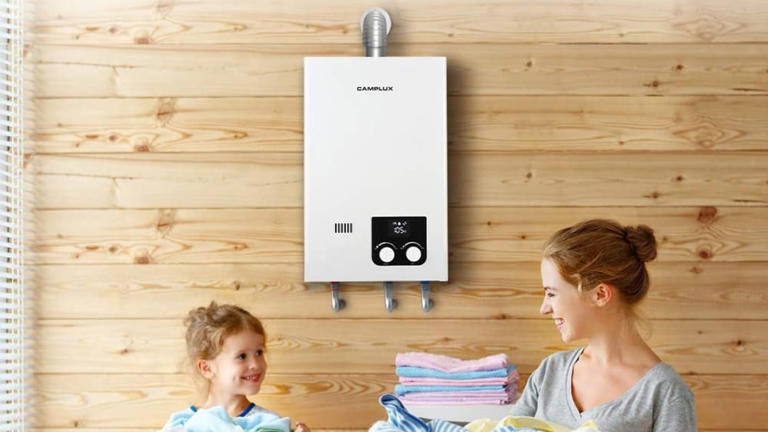

IMAGES
VIDEO
COMMENTS
Adjustable digital thermostat. CONS: No tip-over shut-off. The Lasko Ceramic Tower heater is at the top of my list for its overall performance and affordable price. The 1500-watt RV heater is durable, and the internal components are made to withstand the extreme heat this unit generates.
11. Symdral Ceramic Space Heater. Symdral Space Heater is powered by advanced ceramic heating technology. It comes with a remote control, has 3 heating modes, and the temperature can be adjusted when it is in ECO mode. It has tip-over and overheating protection, and it oscillates by 70 degrees.
These heaters are energy-efficient thanks to patented HMS dual-wall technology. The Heat Storm electric RV heater operates at just 40 decibels, filters dust and dander out of the air, and has an auto "eco-mode" to save energy and money. Plus, these best electric heaters for an RV do a great job heating a small space.
This is a great all-around product and would be a good option for cold travel trailer owners! For more information on this space heater, as well as access to online ordering options, visit this link. 4. Dr. Infrared Portable Space Heater. Dr Infrared Electric Heaters. Price: $108. Rating: 4.1/5. Watts:/BTU 1500.
2. Lasko 754200 Ceramic Portable Space Heater. The Lasko 754200 Ceramic Portable Space Heater is a compact and versatile heating solution for RVs. It features an adjustable thermostat, enabling you to set the desired temperature. Its ceramic heating element ensures efficient heat distribution throughout the RV.
When shopping for the best heater for RV, you will find plenty of options. So, we've curated this list for you to learn about the market-leading products and make the right decision. Let's dive into the brief reviews of the 8 best RV heater products in the market. 1. Lasko Oscillating Ceramic Space Heater.
Camping World offers a wide variety of RV heaters and furnaces from top trusted brands such as Atwood, Comfort Zone, Mr. Heater, and more. There are few things greater than cuddling up with friends and family in a cozy, warm RV after a long day of exploring the wilderness, hiking in the snow, or simply enjoying nature's winter wonderland.
Pelonis Ceramic Heater for an RV. This is our last pick for the Best RV Electric Heaters. The Pelonis is a great option for a number of reasons that you can barely beat it at this price point. As well as a really pretty design the small and lightweight heater quickly heats up a small to medium area.
Broan-NuTone. Originally known as NuTone, this is an American company founded by J. Ralph Corbett in 1936. It produces ventilation systems, electric heaters, and indoor air quality products for ...
Caframo's True North Space Heater is one of the best electric heaters for travel trailers and a top-of-the-line, energy-efficient way to heat your RV. Utilizing far infrared technology, the True North Space Heater emits a gentle, warming radiant heat that is safe for people and pets. The heater's compact size makes it perfect for small ...
1. Lasko Ceramic Tower Heater. Capacity: 5,000 BTU for up to 300 square feet. Dimensions: 7 x 7.4 x 23 Inches. Weight: 7.4 Pounds. This Lasko electric heater tops my list for the best electric heater for RV because of its features and unique design. It's a little bit of luxury, without a huge price tag!
Bottom Line. If you want a compact electric heater for your travel trailer that will efficiently heat up your living space without putting a too much burden on your budget, the Lasko CD09250 is perfect. Its adjustable heat settings ensure personalized comfort while its compact design allows users to place it anywhere they want.
The best ways to heat up an RV are: Gas furnaces. Portable gas heaters. Built-in electrical heaters. Portable electrical heaters. Diesel heaters. Let's take a closer look and find out when to use each heating source for RVs and campers. Table of Contents.
5. Duraflame 9HM8101-O142 Portable Infrared Quartz Heater. Price: $169 Rating: 4.3/5 Watts/BTU: 5,200; Item Weight: 26.4 lbs. Size Dimensions: 12.8 x 16.8 x 15.3 inches Special Features: In the winter, the Duraflame portable infrared heater is a stylish and efficient space heater for any travel trailer.
An RV heater is a forced air heater. This means when the air in your RV falls below the temperature on the thermostat, hot air is forced through the vents and into the living space. That hot air is created using a flame fed by propane and forced out of the vents in your rig by a blower fan.
Lasko 754200 Ceramic Heater If you want something to quickly heat up your RV without costing a significant amount, the Lasko 754200 Ceramic Heater is your best option. It provides ample of heat at 120-volt with a 1500-watt high heat setting and 900-watt low heat setting. It is ETL listed for its durable construction, lightweight body, and rugged heating performance.
In this article, we'll teach you what to look for when purchasing heaters and help you choose the best one for your camper van. Table of Contents hide. 1 The Best Campervan Heaters. 1.1 Bovado Comfort Heater. 1.2 Car Cozy 12V Electric Blanket. 1.3 Webasto Airtop 2000 STC Diesel Heater.
They make superb travel trailer heaters and furnaces. Renowned for their energy-efficiency, reliability, compact design and ease of installation, Propex heaters have always been in high demand and held in high regard by caravanning folk, installers, travel trailer builders and manufacturers. From compact teardrop trailers to larger touring ...
A 12-volt heater is an excellent camping accessory that can help make your campervan or RV trip more comfortable. These heaters are powered by DC current from a battery and can provide your vehicle with the warmth you need in cold weather. 12-volt heaters for campers can often be used in combination with other heating sources such as propane ...
Camco's RV catalytic propane heaters come in a few sizes ranging from 3,000-8,000 BTU. Because this article focuses on small portable heaters that don't have to be wall-mounted I will be reviewing the Camco Olympian Wave 3 which is the 3,000 BTU RV propane heater.
The Mr. Heater portable heater is an excellent addition to your travel trailer because you can move it anywhere around the square footage of the trailer and be filled with a new propane tank easily. Atwood 34388 Excalibur 8500 IV Series Heating System Model 8531-IV Furnace RV Camper Trailer : If you are replacing a furnace system and not just a ...
Install RV Underbelly Protection. The best option for long-term protection of your RV tank heating pads is to install RV underbelly protection or insulation. A single sheet of corrugated plastic could be all you need to ensure a long life for your heating pads! 3. Ensure Electrical Connections Aren't Worn.
Furrion 2.4GPM Tankless RV Gas Water Heater - $650.00. Key Features. 2.4 GPM (Gallons Per Minute) capacity; Delivers hot water on demand "even when the ambient temperature drop to 32°F"